democracynow.org
Stories:

Maya Angelou: And Still I Rise: First Film on Writer and Activist Chronicles an Extraordinary Life
In a Black History Month special, we remember the life and legacy of the legendary poet, playwright and civil rights activist Maya Angelou. For the first time, a documentary has chronicled her remarkable life. She was raped as a child and refused to speak for five years. She went on to become an accomplished singer and actress, then worked with Martin Luther King Jr. and Malcolm X. After King’s assassination, with encouragement by the author James Baldwin, Angelou penned "I Know Why the Caged Bird Sings," her first of seven autobiographies. In 1993 she recited her poem "On the Pulse of Morning" at Bill Clinton’s first inauguration. She was the first poet to make an inaugural recitation since Robert Frost at John F. Kennedy’s inauguration in 1961. We air highlights of Angelou’s work and speak to the co-producers and directors of the film, "Maya Angelou: And Still I Rise," Rita Coburn Whack and Bob Hercules, as well as Angelou’s grandson, Colin Johnson.
TRANSCRIPT
This is a rush transcript. Copy may not be in its final form.
AMY GOODMAN: Today, a Black History Month special, as we remember the life and legacy of the legendary poet, playwright, civil rights activist, Maya Angelou. Now, for the first time, a documentary chronicles her remarkable life, beginning with her traumatic childhood. She was raped and refused to speak for five years. She went on to become an accomplished singer and actress, then worked with Martin Luther King Jr. and Malcolm X. After King’s assassination, with encouragement by the author James Baldwin, Angelou penned I Know Why the Caged Bird Sings, her first of seven autobiographies. The book launched the phenomenal career for which she is known around the world as an award-winning author and people’s poet. Five years ago this week, President Obama bestowed upon her the nation’s highest civilian honor, the Presidential Medal of Freedom. The new documentary, Maya Angelou: And Still I Rise, takes its title from one of Maya Angelou’s most beloved works.
MAYA ANGELOU: You may write me down in history
With your bitter, twisted lies,
You may trod me in the very dirt
But still, like dust, I’ll rise.
Does my sassiness upset you?
Why are you beset with gloom?
Just ’cause I walk as if I have oil wells
Pumping in my living room.
Just like suns and like moons,
With the certainty of tides,
Just like hopes springing high,
Still I rise.
Did you want to see me broken?
Bowed head and lowered eyes?
Shoulders falling down like teardrops,
Weakened by my soulful cries?
Does my sassiness upset you?
Don’t take it so hard
Just ’cause I laugh as if I have gold mines
Diggin’ in my own backyard.
You can shoot me with your words,
You can cut me with your lies,
You can kill me with your hatefulness,
But just like life, I’ll rise.
Does my sexiness offend you?
Oh, does it come as a surprise
That I dance as if I have diamonds
At the meeting of my thighs?
Out of the huts of history’s shame
I rise
Up from a past rooted in pain
I rise
A black ocean, leaping and wide,
Welling and swelling I bear in the tide.
Leaving behind nights of terror and fear
I rise
Into a daybreak miraculously clear
I rise
Bringing the gifts that my ancestors gave,
I am the hope and the dream of the slave.
And so, naturally, there I go rising.
AMY GOODMAN: Maya Angelou, reading from her poem "Still I Rise." Surprisingly, Angelou has never been the subject of a feature-length documentary, until now. The new film, Maya Angelou: And Still I Rise, offers insight into the iconic writer’s public and personal life through rare archival footage and in-depth interviews with Angelou and her friends, from rapper Common to Oprah to former President Bill Clinton.
Last month, during the Sundance Film Festival, I sat down with the co-producers and directors of the film, Rita Coburn Whack and Bob Hercules, as well as Maya Angelou’s grandson, Colin Johnson. I began by asking Rita for a thumbnail sketch of Maya Angelou’s life.
RITA COBURN WHACK: So, you have a person that’s born in 1928 in Stamps, Arkansas. By 1935, she goes to St. Louis, so she’s actually part of the Great Migration. By the time she goes to San Francisco in her teens and then leaves there and goes into—in the 1960s into New York—
AMY GOODMAN: But for a second, she’s being handed off between her grandmother, her mother.
RITA COBURN WHACK: She’s being handed off. I think the overarching thing that’s happened in her life is that she’s experienced a lot of rejection, she’s experienced abandonment, she’s experienced not being accepted, from that racism to even inside her home. And so, when we start the film with one of her quotes—"You may encounter many defeats, but you must not be defeated"—it sums up how she lived her life.
AMY GOODMAN: She was raped as a child by her mother’s boyfriend.
RITA COBURN WHACK: Yes, at seven.
AMY GOODMAN: She—at seven years old. She didn’t speak for the next five years?
RITA COBURN WHACK: She didn’t speak for the next five years. But she also says, when she decided to speak, she had a lot to say. But during those five years, she read. And that is one of the equalizers. And also, go back to the South, at a time when people carried themselves, blacks, with a certain comportment. They may have—there may have been poor people around, but for her, her family was not poor. Her grandmother owned a store and owned land. And so, she was educated from the moment she got there. So, in that five years, she’s reading Balzac, Guy de Maupassant. She’s reading the kind of work that would give her a college education from seven to 13, all of Shakespeare’s works. So she’s a self-educated person in a South that blacks held in esteem about education.
AMY GOODMAN: And how does she transfer that into—as she moves into adulthood, where does she head? You talk about her going to New York.
RITA COBURN WHACK: Well, when she goes, she has all of that background in her. It’s ingrained in her. And she also has, from Grandmother Henderson, religion, biblically based, classically taught. And then, from her mother, Vivian Baxter—Vivian Baxter’s family like more like a group of gangsters. I mean, they fought, they gambled. It was a fast life. So she has the street smarts, she has extraordinary intelligence, she has faith. And she ends up taking that and having the strength to go and try new things. So, it’s not like it came from nothing. It came from all of that together.
BOB HERCULES: And she—when she went to New York, she joined the Harlem Writers Guild. And she had been writing, and she had run into Langston Hughes and John Killens. And they convinced her to move to New York in the late ’50s and join the Harlem Writers Guild, which was a very important thing for her, because then she was in a community of writers, and they could critique her work, and she could critique their work. And it really, in a way, changed her life and kind of set her on that path to become a writer, though she was still performing at the time.
AMY GOODMAN: Now, even before she meets all these legendary figures, she had a child. She had a baby. Colin, you are her baby’s baby. You are Guy Johnson’s son, Colin. Talk about Maya Angelou as a young, single mother, the decisions she made, the stories you told in your family, how she ended up having your dad, Guy.
COLIN JOHNSON: Well, how and the first question are a little different. I would say that her as a young woman, I think she had this power and feeling inside of her that she had some work that was unaccomplished, but balancing that with being a mother. And I think that she was torn with the same decision that her mother and her parents actually made, as well, as to stay on a daily basis and be that parent or go off and live your life.
AMY GOODMAN: She was a teenage mom, right?
COLIN JOHNSON: Yeah, exactly, 17.
AMY GOODMAN: And she made a decision to have this baby alone.
COLIN JOHNSON: Right. I don’t know I would phrase it that way. I would say that her pride and the way that she was raised allowed her to walk out of a door with a young child in tow and brave the world. And I don’t know that it was a decision that was thought out from the very beginning to have the child. I think it was a series of events that just—as the rest of her life has played out, it’s just like, "I decided to have sex with this man, and a few months later I found out I was pregnant, and now we have to deal with that." And her mother, my great-grandmother, was an amazingly powerful woman and basically said to her, "When you walk out of this door, don’t let anybody else let you feel like you haven’t been raised. You have been raised. You have all of the tools to go out and conquer the world," which is an amazing statement to make to a young woman who had really very little formal education, but self-taught and really self-driven internally. So, I think that I just would use different words in the description of it.
AMY GOODMAN: Before being world-renowned as the poet and writer that she was, she was an actress, she was a calypso singer. Let’s go to 1957. Can you place this for us?
BOB HERCULES: Yeah, she was a singer, and she had somewhere along the way picked up calypso singing. She started out as a dancer and then became a singer. And somebody at one point had said to her, "You know, if you could do this calypso act, you could get paid a lot more money, and you could be in some of the better clubs in San Francisco." And so she took that on and became a calypso singer. She ended up being in this movie, somewhat obscure movie, called Calypso Heat Wave, that came out in 1957. And, you know, her career was kind of launched as a performer. She had been playing in Vegas and doing all kinds of shows. And eventually she went to see a performance of Porgy and Bess in San Francisco. And one thing led to another, and they offered her a job of going on tour with Porgy and Bess, and she went all over the world with Porgy and Bess. It was amazing.
AMY GOODMAN: Now, setting up this clip from this little-known part of Maya Angelou’s life, the time when she was a calypso singer, interspersed with her singing and performing, you have Diahann Carroll speaking.
BOB HERCULES: Yes, one of our favorite lines. Maya comes out, and Diahann Carroll says—she describes her. And the last thing she says: "No shoes." And it always strikes me that was a detail that she caught.
AMY GOODMAN: Let’s go to Maya Angelou.
ANNOUNCER: Maya Angelou!
DIAHANN CARROLL: I talked some friends of mine into going to this little club, late ’50s. And what I remember is Maya making her entrance—very tall, very grand, no shoes.
MAYA ANGELOU: [singing] Mo and Joe run the candy store,
Tellin’ fortunes behind the door,
The cops grabbed Mo, and as Joe ran out...
DIAHANN CARROLL: That she was an original is certainly an understatement.
MAYA ANGELOU: [singing] Brother Mo, he began to shout,
Run Joe, hey the man’s at the door,
Run Joe, the man, he won’t let me go...
DON MARTIN: She was exact and refined with her movements. She was limbs. I mean, she was a beautiful Giacometti sculpture.
MAYA ANGELOU: [singing] Run Joe, run Joe, run Joe, run Joe, ohh...
DON MARTIN: At the time, that was the trend in music—Afro-Caribbean, calypso. And Maya was known as "Miss Calypso."
MAYA ANGELOU: [singing] All is busy in the marketplace,
Makes me dizzy in the marketplace,
’Tis a wonder to me to constantly see
All that happens in the marketplace.
That flower girl has an innocent face,
The most well read in the marketplace.
She’s a voodoo girl from dusk ’til dawn,
So cast a spell just for fun.
DON MARTIN: The voice was no great voice, but she knew how to use it.
MAYA ANGELOU: [singing] ’Tis a wonder to me to constantly see
All that happens in the marketplace.
AMY GOODMAN: She was dancing, she was singing, and she was not wearing shoes, Rita.
RITA COBURN WHACK: No, I think there was this allure, even if you look at the liner notes. In the liner notes, they say that she came from some Caribbean country, because they wanted to just promote her as this dancer at this time. And that was important, and it moved her to another place, she—as she toured with the State Department. And this was huge. Many people had not been out of the country. But to be in a group of African Americans that then tour from—she was in—she was not only in France, where she met James Baldwin for the first time, but she was also in some of the African—
BOB HERCULES: She toured in Egypt—
RITA COBURN WHACK: In Egypt.
BOB HERCULES: —and all over the Mideast, in places that, you know, in those times, Americans would not have normally gone to. So it was a very interesting experience for her. And she picked up languages and picked up the culture, and it broadened her horizons tremendously.
AMY GOODMAN: Bob Hercules and Rita Coburn Whack, co-directors of the new film, Maya Angelou: And Still I Rise. I spoke to them at the Sundance Film Festival along with Maya Angelou’s grandson, Colin Johnson. When we come back, we’ll talk to them about Maya Angelou and Dr. Martin Luther King, as well as Malcolm X, and the effect of their assassinations on her life, and much more. Stay with us.
[break]
AMY GOODMAN: "Run Joe" by Maya Angelou. This is Democracy Now!, democracynow.org, The War and Peace Report. I’m Amy Goodman, as we continue our look at a new documentary that debuted last month at the Sundance Film Festival in Park City, Utah, Maya Angelou: And Still I Rise. It’s the first feature-length documentary to focus on the writer and poet. Maya Angelou was a close friend and colleague of Dr. Martin Luther King Jr. and his wife, Coretta Scott King. Dr. King was assassinated on Maya Angelou’s birthday, April 4th. Maya Angelou and Coretta Scott King would talk every year on that date. In 2006, Dr. Angelou spoke at Coretta Scott King’s funeral in Georgia.
MAYA ANGELOU: On those late nights when Coretta and I would talk, I would make her laugh. And she said that Martin King used to tell her, "You don’t laugh enough." And there’s a recent book out about sisters in which she spoke about her blood sister. But at the end of her essay, she said, "I did have—I do have a chosen sister, Maya Angelou, who makes me laugh even when I don’t want to." And it’s true. I told her some jokes only for no mixed company. Many times on those late evenings, she would say to me, "Sister, it shouldn’t be an either-or, should it? Peace and justice should belong to all people, everywhere, all the time. Isn’t that right?" And I said then, and I say now, "Coretta Scott King, you’re absolutely right. I do believe that peace and justice should belong to every person, everywhere, all the time."
And those of us who gather here—principalities, presidents, senators—those of us who run great companies, who know something about being parents, who know something about being preachers and teachers, those of us, we owe something from this minute on, so that this gathering is not just another footnote on the pages of history. We owe something. I pledge to you, my sister, I will never cease. I mean to say, I want to see a better world. I mean to say, I want to see some peace somewhere. I mean to say, I want to see some honesty, some fair play. I want to see kindness and justice. This is what I want to see. And I want to see it through my eyes and through your eyes, Coretta Scott King. [singing] I open my mouth to the Lord, and I won’t turn back, no. I will go. I shall go. I’ll see what the end is going to be. Thank you.
AMY GOODMAN: That was Maya Angelou speaking in 2006 at Coretta Scott King’s funeral. Last month at the Sundance Film Festival, I sat down with Rita Coburn Whack and Bob Hercules, the producers and co-directors of the new documentary, Maya Angelou: And Still I Rise, as well as Maya Angelou’s grandson, Colin Johnson.
AMY GOODMAN: Talk about when she first met Dr. Martin Luther King and when she first met Malcolm X, who had such a profound effect on her life.
RITA COBURN WHACK: Well, Bayard Rustin had been with the Southern Christian Leadership Conference, and he was leaving. And he had been—Maya Angelou had become known, because in the early ’60s she had decided—once she heard him speak at Riverside Church, she had decided that they would—she would get together with a group of artists and that they would put on a play to raise money for the Southern Christian Leadership Conference. So, she did that, and it was called Cabaret for Freedom. I believe it played at The Village Gate. And—
BOB HERCULES: It was something she did with Godfrey Cambridge.
RITA COBURN WHACK: Godfrey Cambridge—
BOB HERCULES: The two of them.
RITA COBURN WHACK: —and a number of actors at that time would get together for Martin Luther King. And one of her lines about that is, when she heard that he was talking about nonviolence, and she herself had suffered so much violence and herself been violated, it was like pouring water on a parched desert. She was ready for it. And so she became the coordinator for the Southern Christian Leadership, the Northern coordinator, which was really fundraising. And she was now an executive with that—with that organization and was raising funds. And he also reminded her of her brother, Bailey, who was very instrumental in her life, and so they formed a friendship.
AMY GOODMAN: She also was deeply affected by the assassination of Patrice Lumumba, the first democratically elected leader of the Democratic Republic of Congo.
BOB HERCULES: Yeah, we found an amazing clip of a protest at the United Nations in New York shortly after Patrice Lumumba was assassinated. And many people suspected it was CIA meddling that led to this assassination. And Maya and other activists at the time went down to the United Nations and held this protest, and they somehow got into the United Nations. And we have this amazing newsreel clip showing that actual event.
AMY GOODMAN: I mean, it’s astounding.
BOB HERCULES: Yeah.
RITA COBURN WHACK: And it was important to—
AMY GOODMAN: You have Adlai Stevenson.
BOB HERCULES: Adlai Stevenson was the U.N.—
RITA COBURN WHACK: Adlai Stevenson was at the desk. And—
BOB HERCULES: Right.
AMY GOODMAN: He was the U.N. ambassador, U.S. ambassador to the U.N.
RITA COBURN WHACK: Yes, right. And Rosa Guy, who was with the writers, Harlem Writers Workshop, her sister at some point screamed, "Murderers!" And when that happened, there ensued a fight and a riot of sorts in the U.N. And when she told us that in Winston-Salem, we looked for the U.N. tapes, and we were able to find that particular tape.
AMY GOODMAN: The footage is amazing.
BOB HERCULES: It’s amazing.
RITA COBURN WHACK: And the place went up in—
AMY GOODMAN: I mean, it’s—pandemonium breaks out.
RITA COBURN WHACK: Yes, yeah, yeah.
AMY GOODMAN: And then she goes outside, and there’s the protest in the streets.
RITA COBURN WHACK: Mm-hmm.
BOB HERCULES: Right. So there was a protest—the protest we show is not linked directly to that United Nations protest. But Guy Johnson talks about—it’s a protest about the freedom fighters who had been down in the South and had been abused, murdered in some cases.
AMY GOODMAN: The Freedom Riders?
RITA COBURN WHACK: Yes.
BOB HERCULES: The Freedom Riders, excuse me. And so, Guy Johnson tells this amazing story of a protest that he and his mother were part of. And the police came in on horseback. It was very intimidating, as you can imagine. And so, the crowds parted, and they slowly were getting people away. But Maya Angelou and her son Guy held ground with about five other people.
AMY GOODMAN: Well, Guy was a little afraid.
BOB HERCULES: He was terrified.
AMY GOODMAN: He’s looking to his mother at this point.
BOB HERCULES: That’s right.
AMY GOODMAN: And he’s saying, "Ma, we’ve got to go."
BOB HERCULES: "We’ve got to go." And Maya held her ground and was not going to move.
AMY GOODMAN: More than that.
BOB HERCULES: And then she finally thought of something spontaneously. She took a hairpin and stuck it into one of the horses, the main horse. And the horses—it was mass pandemonium, and it defused the situation to a point—
AMY GOODMAN: Well, the horse rears up.
BOB HERCULES: Right. That’s right.
AMY GOODMAN: And you have the sergeant, who is riding her.
BOB HERCULES: Right.
RITA COBURN WHACK: And the sergeant falls. And then the people come back into the street, and they finish the march.
BOB HERCULES: Right.
RITA COBURN WHACK: And I think that one of the things that you see—and Colin and I have talked a lot about this—again, is the fearlessness. And her term there, which comes from Grandmother Henderson, is: "God and I are a majority." And that’s where she got the no fear from, that we have to do what’s right. And protests were a part of her life for a very long time. We could not document all the protests, but she protested against apartheid. She protested for black men to have rights. She protested, and she would always say, "Don’t complain. Protest, but don’t complain." And she held that to—to her days. She held that, that you should protest.
AMY GOODMAN: Malcolm X, Rita, can you talk about her meeting with Malcolm X and how he changed her life? In fact, ultimately, it’s the reason she came back to the United States.
RITA COBURN WHACK: When Maya Angelou, in the '60s—I want to say ’61 or so—went to Egypt, went to Cairo, with Vus Make, her then-husband—and it was a kind of common-law husbandry. They were in Cairo, the relationship ended, and she went to Ghana. When she went to Ghana, Ghana was exciting. W. E. B. Du Bois was there. There's a woman in the film, Alice Windom, who’s a sociologist now but was her roommate in Ghana. And they got together, and they found out that Malcolm X was coming. And Malcolm X wanted to get an African country to bring a charge of genocide against the United States. And all of the people from America who were there, the blacks from America, got together and supported him and talked with him and protested and went into the United Nations and went into the embassies to discuss this. And so, it was during that time that they met and talked about the ideologies that he had and became close. And they really became close. And Guy Johnson also had some time with Malcolm X. And so, for that amount of time, they spent that together. And she was, as you say, coming back to the United States to work with him.
AMY GOODMAN: Where did she hear that he was assassinated?
RITA COBURN WHACK: I believe she had a conversation when she came back to the United States from the airport. And then, by the time they were to get together, to actually get together, he had been assassinated. And someone told her to stay in her apartment. Had she seen the news? She said no. And they came over to deliver that information to her, because they knew that it would be devastating. And so, she never got to work with him when she came back to the United States.
AMY GOODMAN: And then, three years later, Dr. King would be assassinated, as well. Dr. King was assassinated on Maya Angelou’s birthday, on April 4th.
BOB HERCULES: Right. That’s right. Dr. King was assassinated on her birthday. She was going to go back to work for Dr. King. He had—she had run into him at some kind of a rally or something, and he came up to her afterwards and said, "I want you to come back to work for me. I’ve got an important position for you," basically going around the country for Operation Breadbasket, or—it was the poor people’s movement he was starting up. And so she agreed to do that, but she said, "I just need a little bit of time. I’m going to celebrate my birthday. I’m going to reconnect with some people." And then April 4th happened, and he was assassinated just before she was going to go back to work for him. And it was absolutely devastating. She briefly went mute again. It just devastated her. But it did lead to something very positive, because—
AMY GOODMAN: And it was James Baldwin, right?
RITA COBURN WHACK: James Baldwin came.
BOB HERCULES: James Baldwin came over. James Baldwin was her mentor and best friend.
AMY GOODMAN: Started slamming on her door.
BOB HERCULES: Slamming on the door, saying, "You’ve got to"—
AMY GOODMAN: Say, "Open this door right now," because she wasn’t coming out.
BOB HERCULES: She was not going to come out. She was—
AMY GOODMAN: She was silent, and she—
RITA COBURN WHACK: She had been home for about four or five days, and admittedly unkempt and not speaking. And he came, and he said, you know, some choice words about opening the door. And she let him in. And he said, "Shower, get ready, I’m going to take you out of here." And when he did that, he took her to the home of the—Jules Feiffer was there. I believe Philip Roth was in this group. And they were all talking, and she began to tell stories of her childhood. And it was there that those stories were heard. And Judy Feiffer, Jules’ then-wife, called Bob Loomis at Random House and said, "You ought to hear the stories that this woman has."
And I think one of my favorite stories, when she started talking, she said there was such racism in Stamps, Arkansas, that black people couldn’t eat vanilla ice cream. And so, everybody laughs, and then she begins to tell these stories. And they’re stories that she lived. And we’ve often heard this—so much has happened to her. And I feel like, well, welcome to world of blacks born in 1928 Jim Crow South and so on.
But she has done an—she did an amazing job of not only living through that history, documenting that history, participating in that history, and then it being so well documented. So one of the things that you have in this documentary is you have history from a black woman’s perspective, which is—you know, beyond Phillis Wheatley, it’s not what’s written down. We don’t have that. And so, this whole trajectory of which her life path was on was something that we had to dig and to follow and to try to embrace.
AMY GOODMAN: So, she writes I Know Why the Caged Bird Sings. It comes out in ’69.
RITA COBURN WHACK: Yes.
AMY GOODMAN: Soon after, Dr. Martin Luther King dies. She didn’t originally want to write it.
RITA COBURN WHACK: She didn’t want to do—she had—as open as she was, these were areas you didn’t know. And as Bob Loomis points out, today everybody writes a book. But back at that time, people that were relatively unknown didn’t write books about their lives. And so, she had to be convinced. And as Bob says, when she found out that it would be difficult, that’s when she thought, "Hmm, maybe I can do this."
AMY GOODMAN: Let’s go to a clip from Maya Angelou: And Still I Rise.
MAYA ANGELOU: The writer has to take these most known things and put them together in such a way that a reader says, "I never thought of it that way before." It’s a challenge. And I know many writers, and I’m one, who says, "Lord, are you sure you wanted me to do this?"
AMY GOODMAN: That’s from Maya Angelou: And Still I Rise. Now, this is one of many autobiographies, but it was her first.
RITA COBURN WHACK: It was her first, and there are seven.
AMY GOODMAN: And the response to this, the acclaim she received, was she surprised?
RITA COBURN WHACK: I think over time she was surprised. But also remember that when this book was first done, she talked about sexual abuse. We talk about that now, seriously, but more casually. When she talked about it, it was a taboo. People didn’t tell that something like this happened. So that book came out in 1969, and it was banned in many schools. And now it’s a course adoption in colleges and high schools all over the country. But given the time period, 1969, that was not the case.
AMY GOODMAN: She talked about rape. She talked about prostitution.
RITA COBURN WHACK: Exactly.
AMY GOODMAN: And what was her philosophy in talking about all of this?
RITA COBURN WHACK: OK, so she talked about rape and sexual abuse in I Know Why the Caged Bird Sings, followed by—that took her to 16 and being pregnant. And Gather Together in My Name, the second one, takes you from 17 to 19, in which prostitution occurs. And we felt it was very important to put that into the film, because she wanted to make sure that people, as she said, could gather together in her name and not have this idea that they’d never done anything wrong, that she may have expected that she would be ostracized, but she talked to her family about it, talked to Guy about it, and said, "I’ve got to tell this, because I lived it."
BOB HERCULES: And I think her point was that others would learn from this, and others could hear her voice and read these books and learn from that and be able to go on with their lives and not be stigmatized by some of the things that happened. So it was a powerful lesson.
AMY GOODMAN: Colin Johnson?
COLIN JOHNSON: Well, if you ask me, the philosophy—right?—and it kind of goes down, and she has an amazing way to kind of boil situations down—but is: "I am human. Nothing human can be foreign to me." And so, as she received what other people’s actions were, she also gave of her own life and understood that people were going to be able to resonate, and it would be attainable to people, because they come from the same place, which is humankind.
AMY GOODMAN: Maya Angelou’s grandson, Colin Johnson, along with Bob Hercules and Rita Coburn Whack, co-directors of the new film, Maya Angelou: And Still I Rise. I spoke to them last month at the Sundance Film Festival in Park City, Utah. We continue with the conversation in a moment.
[break]
AMY GOODMAN: "Human Family" from Caged Bird Songs, Maya Angelou’s final album, which blended her words with contemporary hip-hop. This is Democracy Now!, democracynow.org, The War and Peace Report. I’m Amy Goodman, with this Black History Month special. Back in 1993, Dr. Maya Angelou recited her poem, "On the Pulse of Morning," at Bill Clinton’s first inauguration. She was the first poet to make an inaugural recitation since Robert Frost at John F. Kennedy’s inauguration in 1961.
MAYA ANGELOU: Mr. President and Mrs. Clinton, Mr. Vice President and Mrs. Gore, and Americans everywhere:
A Rock, A River, A Tree
Hosts to species long since departed,
Marked the mastodon,
The dinosaur, who left dry tokens
Of their sojourn here
On our planet floor,
Any broad alarm of their of their hastening doom
Is lost in the gloom of dust and ages.
But today, the Rock cries out to us, clearly, forcefully,
Come, you may stand upon my
Back and face your distant destiny,
But seek no haven in my shadow.
I will give you no hiding place down here.
You, created only a little lower than
The angels, have crouched too long in
The bruising darkness,
Have lain too long
Face down in ignorance.
Your mouths spilling words
Armed for slaughter.
The Rock cries out to us today, you may stand upon me,
But do not hide your face.
Across the wall of the world,
A River sings a beautiful song. It says,
Come, rest here by my side.
Each of you, a bordered country,
Delicate and strangely made proud,
Yet thrusting perpetually under siege.
Your armed struggles for profit
Have left collars of waste upon
My shore, currents of debris upon my breast.
Yet today I call you to my riverside,
If you will study war no more. Come,
Clad in peace, and I will sing the songs
The Creator gave to me when I and the
Tree and the Rock were one.
Before cynicism was a bloody sear across your
Brow and when you yet knew you still
Knew nothing.
The River sang and sings on.
There is a true yearning to respond to
The singing River and the wise Rock.
So say the Asian, the Hispanic, the Jew,
The African, the Native American, the Sioux,
The Catholic, the Muslim, the French, the Greek,
The Irish, the Rabbi, the Priest, the Sheikh,
The Gay, the Straight, the Preacher,
The privileged, the homeless, the Teacher.
They all hear
The speaking of the Tree.
They hear the first and last of every Tree
Speak to humankind today. Come to me, here beside the River.
Plant yourself beside the River.
Each of you, descendant of some passed on
Traveler, has been paid for.
You, who gave me my first name,
You, Pawnee, Apache and Seneca,
You, Cherokee Nation, who rested with me,
Then forced on bloody feet,
Left me to the employment of
Other seekers—desperate for gain,
Starving for gold.
You, the Turk, the Arab, the Swede, the German, the Eskimo, the Scot,
You, the Ashanti, the Yoruba, the Kru,
Bought, sold, stolen, arriving on a nightmare
Praying for a dream.
Here, root yourselves beside me.
I am that Tree planted by the River,
Which will not be moved.
I the Rock, I the River, I the Tree
I am yours—your passages have been paid.
Lift up your faces, you have a piercing need
For this bright morning dawning for you.
History, despite its wrenching pain,
Cannot be unlived, but if faced with courage,
Need not be lived again.
Lift up your eyes upon
This day breaking for you.
Give birth again
To the dream.
Women, children, men,
Take it into the palms of your hands,
Mold it into the shape of your most
Private need. Sculpt it into
The image of your most public self.
Lift up your hearts.
Each new hour holds new chances
For new beginnings.
Do not be wedded forever
To fear, yoked eternally
To brutishness.
The horizon leans forward,
Offering you space to place new steps of change.
Here, on the pulse of this fine day
You may have the courage
To look up and out and upon me,
The Rock, the River, the Tree, your country.
No less to Midas than the mendicant.
No less to you now than the mastodon then.
Here, on the pulse of this new day
You may have the grace to look up and out
And into your sister’s eyes,
And into your brother’s face, your country
And say simply
Very simply
With hope
Good morning.
AMY GOODMAN: Maya Angelou, reciting her poem, "On the Pulse of Morning," at President Clinton’s 1993 inauguration. This historic moment is chronicled in the new documentary, Maya Angelou: And Still I Rise, which debuted last month at the Sundance Film Festival in Park City, Utah, where I sat down with the film’s co-directors, Rita Coburn Whack and Bob Hercules, as well as Maya Angelou’s grandson, Colin Johnson.
AMY GOODMAN: Let’s jump way forward to the Clinton inauguration. Colin, were you there?
COLIN JOHNSON: I was. I was.
AMY GOODMAN: Where were you sitting?
COLIN JOHNSON: Right at the top.
AMY GOODMAN: So, this is—
COLIN JOHNSON: Next to Barbra Streisand and everybody else.
AMY GOODMAN: This is 23 years ago this month.
COLIN JOHNSON: Yeah, yes. Wow!
AMY GOODMAN: And this is when Maya Angelou recites the poem, "On the Pulse of Morning."
COLIN JOHNSON: Yes.
MAYA ANGELOU: I was asked would I would consider writing a poem for President Clinton’s inauguration. And I said, "Yes." Then I started to pray and ask everybody, little children, "What do you think?"
History, despite its wrenching pain,
Cannot be unlived, but if faced with courage,
Need not be lived again.
BILL CLINTON: That poem is kind of like an eternal gift to America. And it will read well 100 years from now.
AMY GOODMAN: As she read this, Colin, that’s Grandma up there.
COLIN JOHNSON: Yeah.
AMY GOODMAN: She’s the poet of the nation. What were your feelings?
COLIN JOHNSON: I mean, she had already surpassed pride, you know, years before that.
AMY GOODMAN: How old were you?
COLIN JOHNSON: I was in high school. I was 17. And really, I think it’s an interesting time to actually think about, because I think I had only really realized who she was at like 14. Right? We had been traveling. We were in London or something like that. And a woman like screamed. And I’m like—you know, we’re in a totally different country, and she’s amazed to meet my grandmother. And so, that really kind of brought it full circle. We had actually just come back from Ghana. I had gone to Ghana with her, as well, that—during that period of time, which was my first trip back to Ghana.
And, I mean, the amount of pride that you have in somebody that’s your grandmother, that has been selected by the leader of the free world to come and be part of this ceremony that brings them into an amazing presidential term, it’s hard to—it’s hard to imagine or hard to even put into words how big my heart is and how full my heart was at that moment, just to stand there, just to—just to see her do that. And then the words that came out of her mouth, I mean, it’s just transformative, is almost the only way to describe it—and the message and the feelings behind it. She did not speak without purpose, and she did not write without purpose. So when she stood up there, she had a message to deliver. And for those that were able to listen and attain it, I think that they were changed.
AMY GOODMAN: As we wrap up, you have a very unusual approach in this film of having Dr. Maya Angelou complete her own sentences in different time spans. And she’ll go from a conversation that you have with her to a speech that she’s giving, and it’s all in one sentence, a continuous sentence. Talk about how you pieced together this documentary about this remarkable woman’s life, but also what you were most amazed by.
BOB HERCULES: Well, you’re right, Amy. We had a wealth of archival material. One of my favorite scenes that illustrates what you were talking about is she’s talking about Porgy and Bess, and Alexander Smallens, the director of the show, said he wanted her to sing an aria, but she didn’t know an aria. So he said, "Well, surely, you must know a gospel, some kind of a, you know, something from the church." And so she performs it. And the rest of the cast is actually jealous, because it’s such an amazing performance. And we cut back and forth of her singing it from a 1982 clip that Bill Moyers had done at Stamps, Arkansas, back in a church that she had attended, or she was there in 1982. And then we cut from her singing this piece to our present-day interview, and she is right in key. It’s an amazing moment for me, that she can, at this age, come right back to that. And so, you’re right. We were able to constantly go back and forth between the archival pieces we had to the present day. We were lucky enough to interview her about three times, three different settings, before she passed. So we had a lot of material to work with.
RITA COBURN WHACK: And it was a large body of work. And I remember when I first asked her would she do a documentary, she gave me a look of "Do you know what you’re asking?" And I didn’t quite know. But once she agreed to it, she was very helpful. And I remember, once, she called us up, and she said, "How’s it coming? You know I’m not getting any younger." And so, she was very aware. But we also had to be aware that we were taking her back. She had done the books, and she could now just live her life. And we were asking her to come back and relive it again for us. And she did that, to the extent that she relived every scene. And I think it was cathartic for her. I really think it was good for her.
AMY GOODMAN: And what do you think Dr. Maya Angelou’s life tells us about American history, race and racism?
RITA COBURN WHACK: It is really—she would often quote James Baldwin: We’re in "these yet to be United States." And that’s still a fact: We’re in these yet to be United States. Racism is alive and well. We must not be defeated by it, but we must protest, and we must be a part of getting rid of it to the extent that we can. And so, I think that she would be happy with the fact that we pulled this together in her honor, but we’re still saying the same things: You must not be defeated by this, but you must fight it.
AMY GOODMAN: And finally, Colin, what you learned from this woman who you shared with the world?
COLIN JOHNSON: I don’t—I’m not going to spend an hour telling you everything I’ve learned. What I will say is that she brought me to this moment. And she would tell me that I am the small—I’m the hand at the small of your back. I may let your stumble, but I will never let you fall. She has played a third parent role in my life, my entire life. And, you know, the sense of pride and the ability to walk out of the door knowing that I have this woman in my corner has allowed me to do many things. And I’m just so appreciative of Bob and Rita here to have put such heart into this project and to really care about it and to really nurture it to its full—to its completion. And I’m proud to be sitting next to them, and I’m proud of this documentary. It’s the first of my grandmother’s life. And it’s just an amazing step forward for people to learn about her.
AMY GOODMAN: Colin Johnson, the grandson of Dr. Maya Angelou, along with Bob Hercules and Rita Coburn Whack, co-directors of the new film, Maya Angelou: And Still I Rise. I spoke to them at the Sundance Film Festival in Park City, Utah. If you’d like a copy of today’s show, you can go to our website at democracynow.org.
Happy birthday to our archivist, Brendan Allen. Democracy Now! has several job openings. We’re hiring a broadcast engineer, as well as a director of finance and operations and a director of development. You can go to democracynow.org for more information.
... Read More →Headlines:
More Republicans Join Vow to Block Supreme Court Justice Nominee
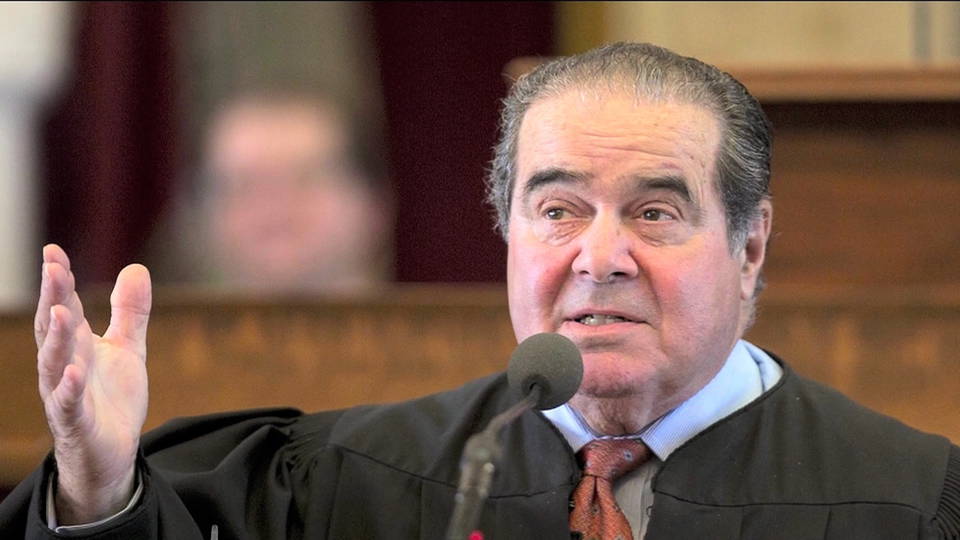
More Senate Republicans have backed Majority Leader Mitch McConnell’s pledge to block any nominee President Obama chooses to replace Justice Antonin Scalia. Scalia died Saturday at a hunting resort near Marfa, Texas, at the age of 79. Republicans are threatening to stall his replacement until a new president is in place 11 months from now. The White House has noted none of the last 12 Supreme Court justices to be confirmed had to wait more than 100 days for a vote.
TOPICS:
Supreme Court
4 U.S. Journalists Released from Detention in Bahrain
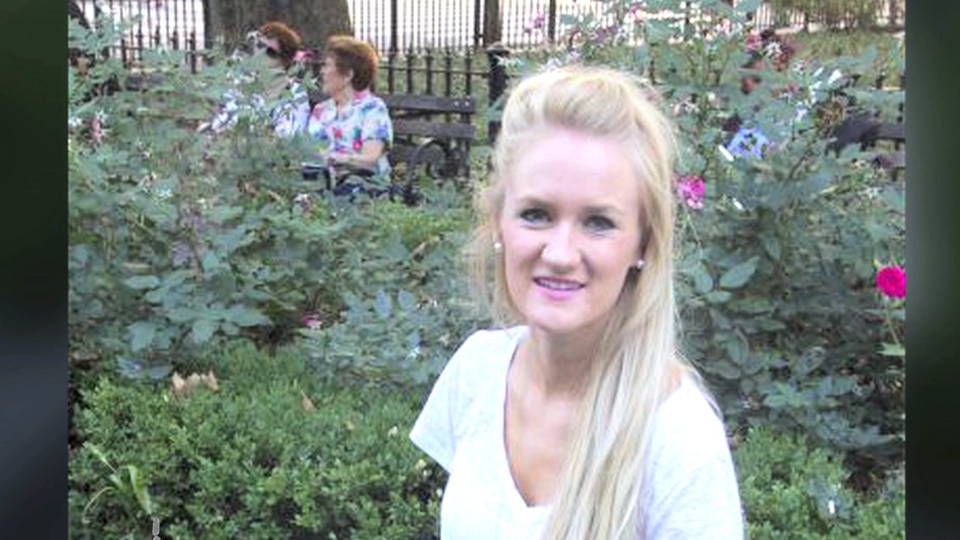
Four U.S. journalists detained in Bahrain on Sunday have been released following an international outcry. Anna Therese Day and her camera crew have reportedly been charged with illegally assembling with the intent to commit a crime. Bahraini authorities accused them of falsely representing themselves as tourists, and claimed one of the journalists participated in an attack on police. Bahrain is a close ally of the United States, home to the Navy’s Fifth Fleet.
TOPICS:
Bahrain
Egypt: Investigator in Italian Student's Death Previously Tied to Torture, Killing
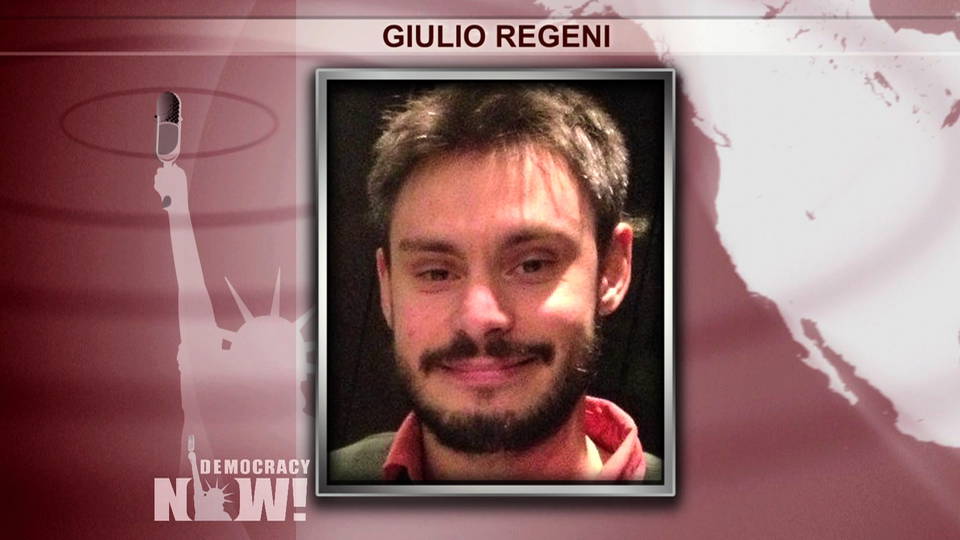
In Egypt, newly released documents show the senior police officer investigating the death of Italian student Giulio Regeni has a prior conviction related to the torture and killing of a detainee. Regeni, who wrote about Egyptian labor unions for an Italian newspaper, was found by the side of the highway, naked from the waist down, his body showing signs of horrific torture. Reuters reports Khaled Shalaby, who is investigating Regeni’s death, was one of four people charged in 2000 over the torture and killing of another person at an Alexandria police station.
Bernie Sanders Protests DNC's Lifting of Ban on Lobbyist Donations
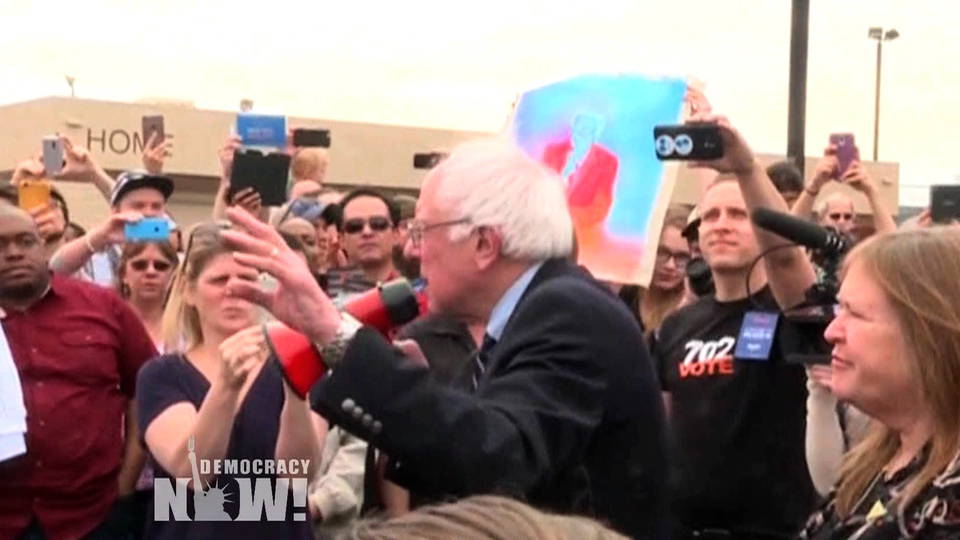
On the campaign trail, Democratic presidential candidate Bernie Sanders has launched a petition against the Democratic National Committee’s quiet lifting of a ban on donations from federal lobbyists and political action committees. The rules were introduced by then-candidate Barack Obama in 2008. But The Washington Post reveals the DNC quietly lifted the rules at some point during the past few months. Critics say the change could boost Sanders’ rival Hillary Clinton, whose joint fundraising committee with the DNC has raised about $27 million.
TOPICS:
2016 Election
Bernie Sanders
Democratic Party
Sanders Questioned over Reparations Stance at Minneapolis Forum
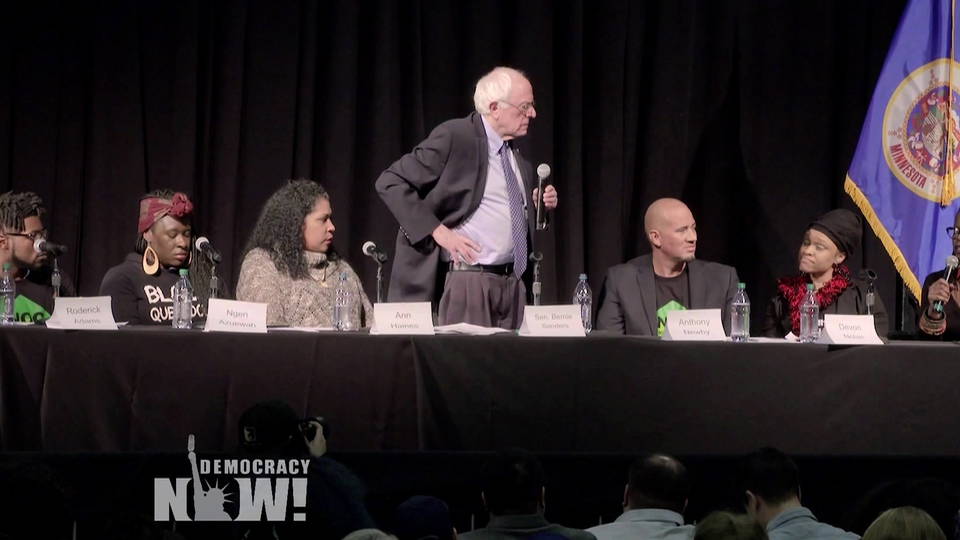
Bernie Sanders continues to face questions over his dismissal of the possibility of reparations for slavery. On Friday, at a Black America Forum organized by Neighborhoods Organizing for Change, Sanders was questioned by Felicia Perry.
Felicia Perry: "I know you’re scared to say 'black,' I know you’re scared to say 'reparations,' because it seems like every time—"
Sen. Bernie Sanders: "No, hold it. Hold it. Ma’am, I don’t think that’s a fair statement."
Felicia Perry: "Hold on. I let you finish, as well. But it seems like every time we talk about black people and us getting something for the systematic oppression and exploitation of our people, we have to include every other person of color."
Sen. Bernie Sanders: "When you have—and you and I may have a disagreement on this, because it’s not just black. It is Latino. There are areas in America, in poor, rural areas, where it’s whites. ... So what I have—"
Audience member: "Say 'black!'"
Sen. Bernie Sanders: "I’ve said 'black' 50 times. All right? That’s the 51st time. All right? But it is—but this is a national issue."
That’s Bernie Sanders responding to an audience member who yelled, "Say 'black!'" at the Black America Forum in Minneapolis. Sanders went on to say he would invest in African-American communities.
TOPICS:
Bernie Sanders
Bill Clinton: "We are All Mixed-Race People"
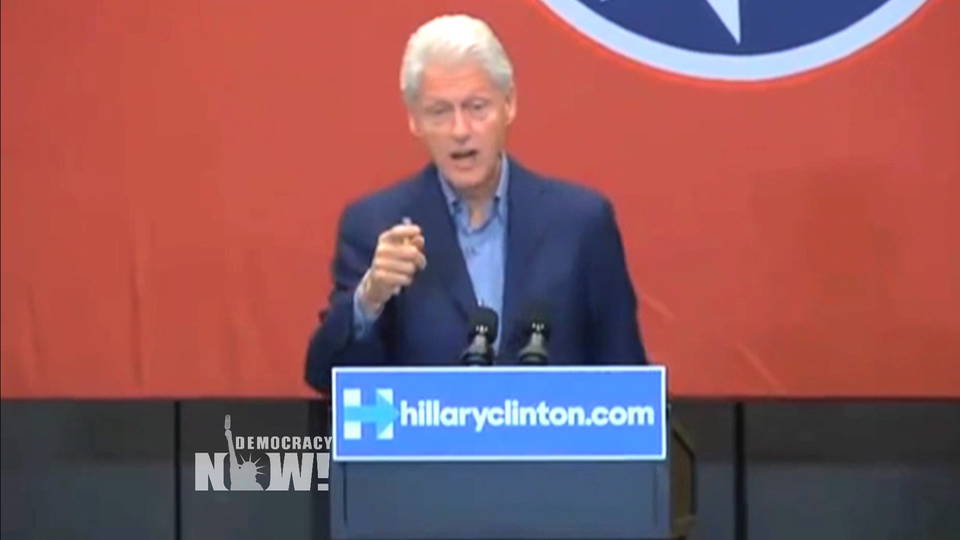
Former President Bill Clinton drew attention for his comments on race while campaigning for his wife Hillary in Tennessee Friday. After he was introduced by Democratic Tennessee Congressmember Steve Cohen as a "heck of a stand-in" for the first black president, Clinton told the crowd in Memphis, "We are all mixed-race."
Bill Clinton: "We learned that unless your ancestors, every one of you, are 100 percent, 100 percent from sub-Saharan Africa, we are all mixed-race people."
Rep. John Lewis: I Didn't Mean to "Disparage" Sanders' Civil Rights Role
Another Hillary Clinton supporter, civil rights icon and Georgia Congressmember John Lewis, has walked back his comments on Democratic rival Bernie Sanders’ involvement in the civil rights movement. Last week Lewis said of Sanders, "I never saw him. I never met him." Lewis later said he did not mean to "disparage [Sanders’] activism," noting "the fact that I did not meet him in the movement does not mean I doubted that Senator Sanders participated."
TOPICS:
Bernie Sanders
Former President George W. Bush Hits Campaign Trail for Brother Jeb
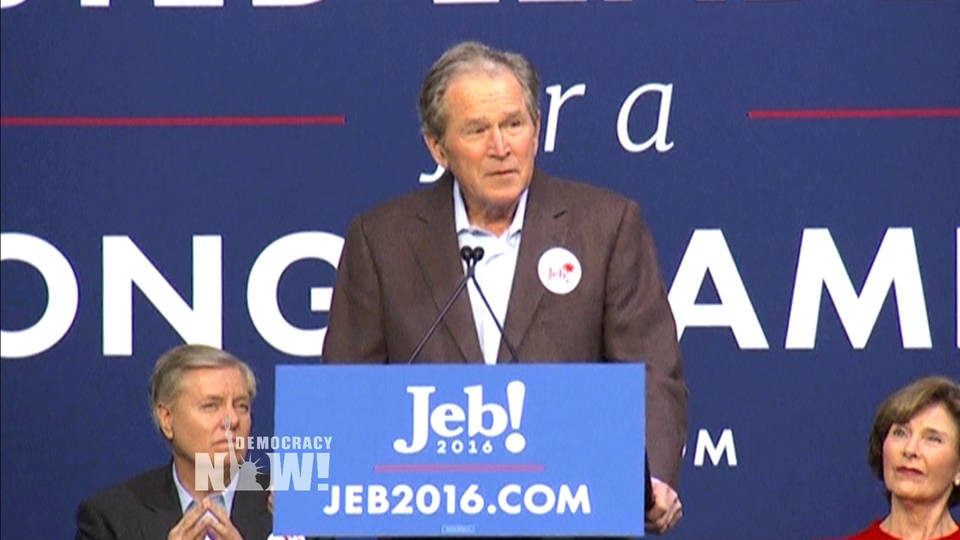
Bill Clinton is not the only former president to hit the campaign trail. Former President George W. Bush returned to the spotlight Monday to campaign for his brother Jeb in South Carolina.
George W. Bush: "This is a serious election for a serious job. So please welcome a serious and thoughtful candidate, a good man, a man I am proud to call my big little brother: Jeb Bush."
George W. Bush’s appearance came after Donald Trump slammed the former president for invading Iraq, calling the war a "big, fat mistake" and saying Bush lied about it.
TOPICS:
Bush
2016 Election
Brazilian State Suspends Larvicide Use After Reports Point to Microcephaly Link

The Brazilian state of Rio Grande do Sul has suspended the use of a larvicide after reports pointed to a potential link between the chemical and the devastating birth defect microcephaly. Brazil has seen a spike in microcephaly cases thought to be linked to the mosquito-borne Zika virus. But two health advocacy groups say the spike may actually be linked to a larvicide made by a Japanese subsidiary of Monsanto that has been used to stop the development of mosquito larvae in drinking water.
TOPICS:
Brazil
Mexico: Pope Francis Asks for Forgiveness from Indigenous People in Chiapas
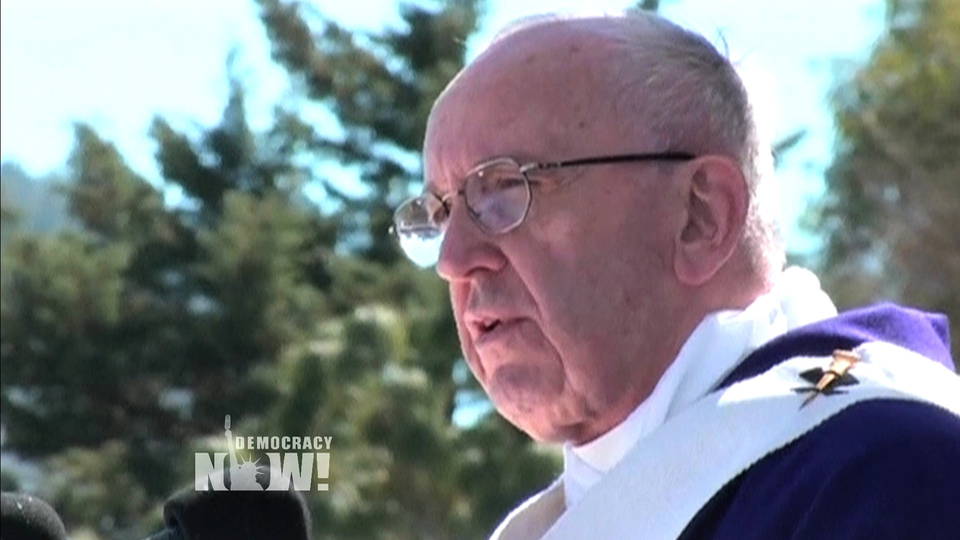
Pope Francis addressed indigenous people in the southern Mexican state of Chiapas, asking for forgiveness over what he called their systematic exclusion from society.
Pope Francis: "Many times, in a systematic and structural way, your people have been misunderstood and excluded from society. Some have even considered you inferior, as well your values, cultures, your traditions. Others, dizzy with power, money and market laws, have robbed you of your lands or have taken part in actions that contaminate the land."
Pope Francis is expected to end his trip to Mexico Wednesday with a visit to Juárez along the U.S.-Mexico border. Ahead of his visit, families separated by U.S. immigration policies lined up to reunite with each other through the border fence.
TOPICS:
Pope Francis
U.K. to Ban Boycotts by Public Institutions in "Attack on Local Democracy"
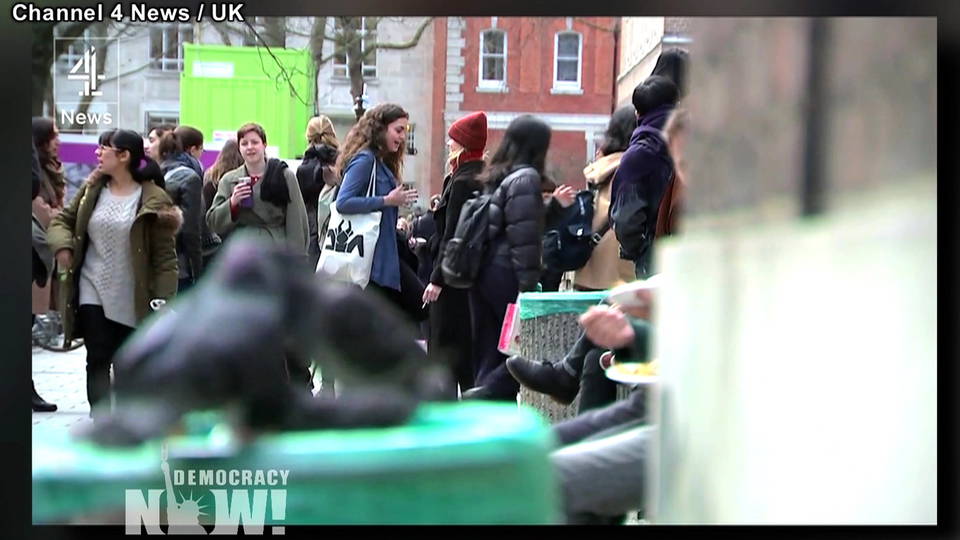
The British government is planning to ban public institutions from engaging in boycotts, including those aimed at pressuring Israel over its occupation of Palestinian lands. Amid the growing Boycott, Divestment and Sanctions movement, and the global campaign to divest from fossil fuel companies over climate change, Britain plans to ban publicly funded institutions from refusing to buy goods from companies. Labour leader Jeremy Corbyn is among those to criticize the plans, calling them "an attack on local democracy."
Colorado Springs Planned Parenthood Reopens After Deadly Attack

A Planned Parenthood clinic in Colorado Springs, Colorado, where an anti-choice gunman killed three people and wounded nine others, has reopened, nearly three months after the attack. The alleged gunman, Robert Lewis Dear, has said he targeted Planned Parenthood "because it’s murdering little babies."
TOPICS:
Abortion
Kendrick Lamar Performs in Prison Garb and Chains, Wins 5 Grammys
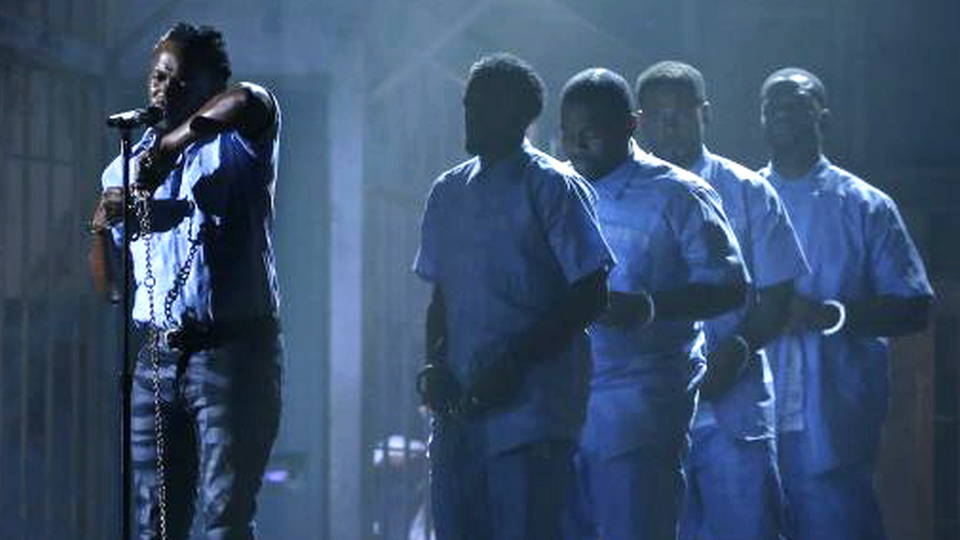
And at the Grammy Awards Monday night, hip-hop artist Kendrick Lamar drew a standing ovation after appearing in prison garb and chains during a medley performance of his songs "Blacker the Berry" and "Alright." At the end of the performance, the word "Compton," Lamar’s hometown, appeared inside a map of Africa. Lamar took home five Grammys, including best rap album. Taylor Swift won best album, becoming the first woman to win the top award twice. Frequent Democracy Now! guest Angélique Kidjo won her third Grammy, for best world music album. And the hit Broadway musical "Hamilton" won best musical theater album. The legendary blind musician Stevie Wonder called for greater accessibility for people with disabilities. He delivered the award for song of the year, reading the name off the card in braille.
Stevie Wonder: "We need to make every single thing accessible to every single person with a disability."
Donate today:
Follow:

Part 2: Ta-Nehisi Coates on Moving to Paris, #BlackLivesMatter, Bill Cosby, #OscarsSoWhite & More
SPEAKING EVENTS

2/22 Columbus, OH
WORK WITH DN!

Broadcast Engineer
Director of Finance and Operations
Director of Development---------------------
Democracy Now! Daily Digest: A Daily Independent Global News Hour with Amy Goodman & Juan González for Monday, February 15, 2016
democracynow.org
Stories:

Scalia's Death Leaves Split Court to Decide Major Abortion, Labor, Voting Rights, Immigration Cases

Stop Hate, Dump Trump: New Campaign Aims to Derail Presidential Bid Built on Racism & Xenophobia

Who is on President Obama's Shortlist to Replace Antonin Scalia?

Kimberlé Crenshaw: Scalia "Bludgeoned" the Constitution That Gave Us Desegregation, Women's Rights

"The War in Iraq was a Big, Fat Mistake": Trump & Bush Spar over War & 9/11
Headlines:
Antonin Scalia, Top Conservative Supreme Court Justice for 30 Years, Dies at 79

Supreme Court Justice Antonin Scalia has died at the age of 79. For nearly 30 years, Scalia was the leading conservative voice on the bench, known, among other things, for his opposition to the Voting Rights Act and gay rights and his support for gun rights. He died Saturday at a hunting resort in West Texas. President Obama, who has 11 months remaining in his term, said he will nominate someone to fill the empty seat.
President Barack Obama: "I plan to fulfill my constitutional responsibilities to nominate a successor in due time. There will be plenty of time for me to do so and for the Senate to fulfill its responsibility to give that person a fair hearing and a timely vote. These are responsibilities that I take seriously, as should everyone. They’re bigger than any one party. They are about our democracy."
Senate Republicans are vowing to block President Obama from filling Scalia’s Supreme Court seat. The next justice could tilt the balance of the Supreme Court, which has been left with four conservatives and four liberals. The vacancy could have an immediate impact on how the now eight-person court will rule in several key cases, including a major abortion case just two weeks away. We’ll have more on the impact of Scalia’s death after headlines.
TOPICS:
Supreme Court
Afghanistan: Record 11,000 Civilians Killed or Injured Last Year

In Afghanistan, the number of civilians killed or injured has risen to a record high for the seventh year in a row. The United Nations says more than 3,500 civilians were killed and more than 7,400 wounded last year, an increase of 4 percent over the year before. Danielle Bell, director of the U.N. human rights program, outlined the findings.
Danielle Bell: "The overall 4 percent increase resulted mainly from a rise in suicide and complex attacks carried out in Kabul city, as well as the Taliban offensive in Kunduz last year. In most parts of Afghanistan in 2015, civilian casualties decreased. Of the 11,002 civilian casualties, one in 10 was a woman, and one in four was a child. Women casualties increased by 37 percent, while child casualties increased by 14 percent."
The report came as Taliban suicide bombers using Humvees captured from the Afghan army attacked a checkpoint in Helmand province, killing six members of the security forces.
TOPICS:
Afghanistan
Syria: Airstrikes Hit 2 Hospitals; Saudi Arabia Sends Warplanes to Turkey

In Syria, airstrikes have hit two separate hospitals. Doctors Without Borders says at least seven people were killed and eight staff are missing after a facility it supports in Idlib province was repeatedly bombed. Separately, a missile reportedly hit a children’s hospital in the rebel-held town of Azaz, killing 10 people and wounding more than 30. Both Russia and the Syrian government are conducting strikes in the area. Meanwhile, Saudi Arabia has deployed warplanes to an airbase in Turkey and repeated its offer to send ground troops into Syria for the fight against ISIL. Meanwhile, up to 40,000 refugees fleeing violence have settled in camps along the Turkish border inside Syria.
TOPICS:
Syria
Saudi Arabia
U.N. Tally: Over 80,000 Refugees Arrive in Europe in First 6 Weeks of 2016

A new tally from the United Nations finds more than 80,000 refugees and migrants have arrived in Europe by boat so far this year alone. More people arrived in the first six weeks of this year than the first four months of last year. Melissa Fleming, spokesperson for the U.N. high commissioner for human rights, said more than 400 have died trying to cross.
Melissa Fleming: "Also to note, we continue to say this is a refugee crisis because, according to our profiling and the statistics we receive from the Greek government, over 91 percent of those arriving in Greece come from the world’s 10 top refugee-producing countries, and the top nationalities are coming from Syria, Afghanistan and Iraq."
TOPICS:
Refugees
Report: Saudis Using Banned, U.S.-Made Cluster Bombs in Yemen

Saudi Arabia’s offer to send ground troops into Syria comes as the U.S. ally faces closer scrutiny over its bombing campaign in Yemen. On Saturday night, a Saudi-led airstrike hit a sewing factory and electronics warehouse in the Yemeni capital Sana’a, reportedly killing 18 people, including a 13-year-old boy. Human Rights Watch has released new evidence the U.S.-backed, Saudi-led coalition is using internationally banned cluster munitions supplied by the United States. Cluster bombs are designed to fan out over a wide area, and their submunitions often fail to explode, posing a massive risk to civilians.
TOPICS:
Yemen
Saudi Arabia
Bahrain: 4 U.S. Journalists Arrested Amid Protests on 5th Anniversary of Uprising

The Associated Press is reporting four American journalists have been arrested in Bahrain while covering protests surrounding the fifth anniversary of the Gulf nation’s pro-democracy uprising. The 2011 protests by Bahrain’s Shiite majority against the Sunni-led monarchy were among the largest seen during the Arab Spring, but they were crushed with the help of Saudi Arabia and the United Arab Emirates. Bahrain is a close U.S. ally, home to the Navy’s Fifth Fleet.
TOPICS:
Bahrain
Pope Francis Takes Aim at Drug Cartels, Corruption in Mexico Visit

Pope Francis took aim at drug cartels and Mexico’s corrupt elite during a visit to one of the cities most impacted by the U.S.-backed drug war. North of Mexico City, Ecatepec has one of the highest murder rates in Mexico and is particularly known for the unsolved murders of scores of women. Montserrat Correa, a student from the city, was among those who watched the pope’s mass.
Montserrat Correa: "There is a high level of crime, so many assassinations. The dangers we live with daily, as women, it’s very difficult in this country, in this state. Anywhere, we fear that something will happen to us. And our families are always worried that something could happen to us and we won’t return home."
Before heading to Mexico, the pope stopped in Havana, Cuba, where he held a historic meeting with Russian Orthodox Patriarch Kirill. It was the first meeting between a pope and the head of the Russian church since the two branches of Christianity split in the 11th century.
TOPICS:
Pope Francis
Mexico
U.S., Cuba to Seal Deal Allowing Commercial Flights
Meanwhile, in other news of healing ties, Cuba and the United States are expected to seal an agreement this week to resume scheduled commercial flights between the two countries for the first time in more than 50 years.
TOPICS:
Cuba
Israeli Authorities Kill 5 Palestinians, Wound 6th After Alleged Attacks

Israeli authorities killed five Palestinians and critically wounded a sixth Sunday, accusing them all of attempted attacks in the Israeli-occupied West Bank and Jerusalem. No Israelis were injured in any of the incidents. Authorities said they killed two Palestinians who shot at Israeli forces with automatic weapons. In a separate incident, soldiers killed two 15-year-olds they accused of throwing rocks and then opening fire. And in two other incidents, Israeli officers shot Palestinians accused of wielding knives, killing a 17-year-old and wounding a 21-year-old woman.
TOPICS:
Israel & Palestine
Haitian Lawmakers Choose Former Aristide Minister as Interim President

Haitian lawmakers have chosen an opposition senator to serve as interim president for 120 days after disputed elections left the country without a president. Former Parliament head Jocelerme Privert served as interior minister under former President Jean-Bertrand Aristide, who was ousted in 2004 in a U.S.-backed coup.
TOPICS:
Haiti
Haitian Democracy Activist Patrick Elie Dies at 66
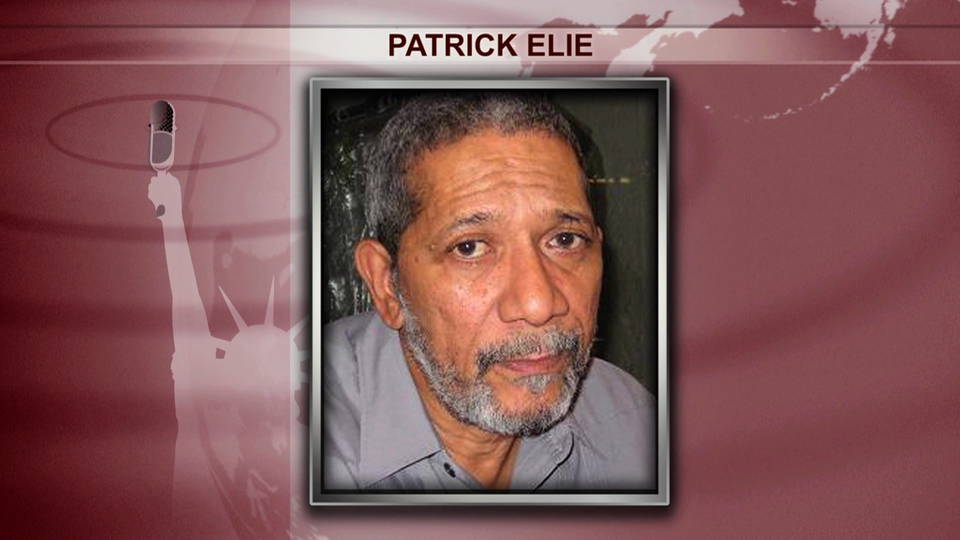
And in other news from Haiti, Patrick Elie, longtime pro-democracy activist and Haiti’s former secretary of state for public security under Aristide, has died at the age of 66. In 2011, he spoke to Democracy Now! from Port-au-Prince on the first anniversary of the devastating earthquake.
Patrick Elie: "So, it’s going to take time, but I do believe that the earthquake is also a signal for us to build Haitian democracy on sound foundations, which means the neighborhood committees, the grassroot organization, instead of trying to build a democracy from the top down. That’s how we built our houses in Port-au-Prince, and you saw what happened."
Patrick Elie died of internal bleeding at a hospital in Port-au-Prince on Friday. He was 66.
Follow:

Beyoncé's Super Bowl Touchdown for Black Lives Matter
SPEAKING EVENTS

2/15 New York, NY
2/22 Columbus, OH
WORK WITH DN!

Broadcast Engineer
Director of Finance and Operations
Director of Development---------------------
Democracy Now! Daily Digest: A Daily Independent Global News Hour with Amy Goodman & Juan González for Friday, February 12, 2016
democracynow.org
Stories:

War on Wall Street or Wall Street's Wars? Clinton and Sanders Debate in Wisconsin

Who Endorsed Hillary Clinton? The Congressional Black Caucus or Its PAC Filled with Lobbyists?

Sanders Slams Clinton's Admiration for "Destructive" Former U.S. Secretary of State Henry Kissinger

Ta-Nehisi Coates: The Ideal Presidential Candidate Would Have "Greater Acknowledgment of History"
Headlines:
Bernie Sanders and Hillary Clinton Face Off in Milwaukee, WI
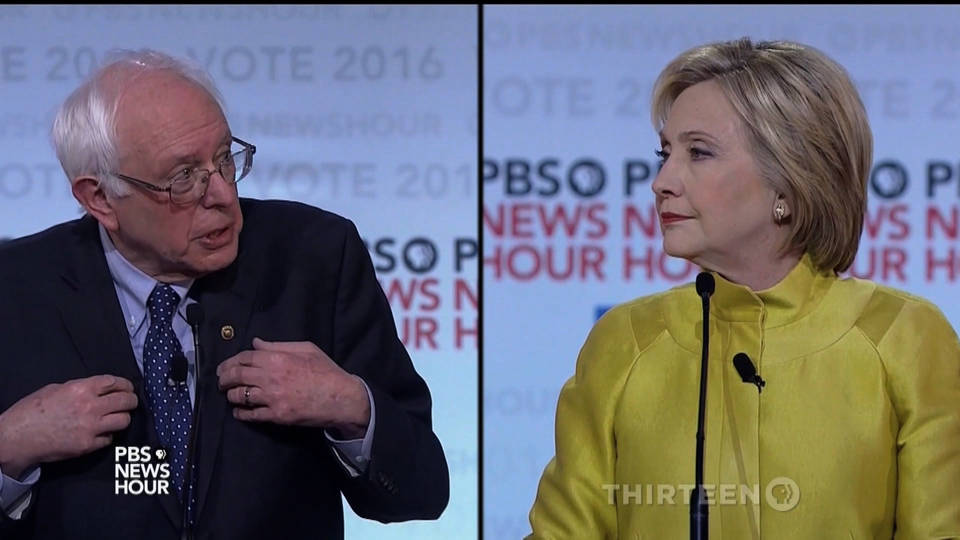
Last night, Democratic presidential candidates Bernie Sanders and Hillary Clinton faced off at a PBS-hosted debate in Milwaukee, Wisconsin. It was the first Democratic debate since Vermont Senator Bernie Sanders’ decisive victory over former Secretary of State Hillary Clinton in Tuesday’s New Hampshire primary. At the debate, Bernie Sanders drew a sharp distinction between himself and the former secretary of state on issues of foreign policy by highlighting Clinton’s close relationship with another former secretary of state, Henry Kissinger.
Sen. Bernie Sanders: "Where the secretary and I have a very profound difference, in the last debate and, I believe, in her book—very good book, by the way—in her book and in this last debate, she talked about getting the approval or the support or the mentoring of Henry Kissinger. Now, I find it rather amazing, because I happen to believe that Henry Kissinger was one of the most destructive secretaries of state in the modern history of this country."
Hillary Clinton, meanwhile, cast herself as the candidate with more experience, and she deflected criticisms of her support for the Iraq War by reminding voters that President Obama picked her to serve as secretary of state.
Hillary Clinton: "As we all remember, Senator Obama, when he ran against me, was against the war in Iraq. And yet, when he won, he turned to me, trusting my judgment, my experience, to become secretary of state. I was very honored to be asked to do that and very honored to serve with him those first four years."
We’ll have more on the debate after headlines.
TOPICS:
2016 Election
Sanders Campaign Raises $6 Million in 24 Hours After NH Primary
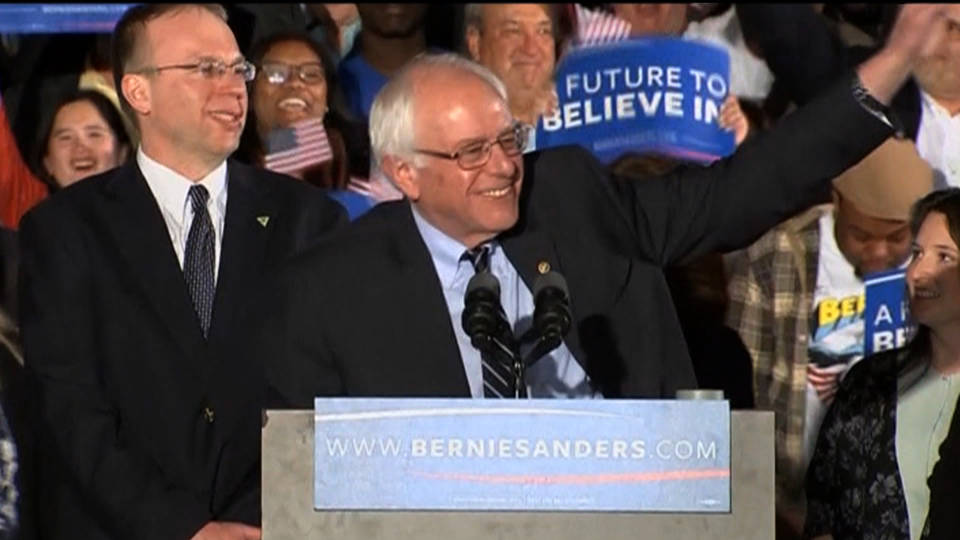
The debate comes as the Sanders campaign says it has broken its own fundraising record by raising more than $6 million in just one day. The campaign says it brought in more than $6 million in the 24 hours after the New Hampshire primary polls closed. The campaign says the average donation amount for the period was $34.
Kerry & World Leaders Meeting in Munich About Syria Conflict
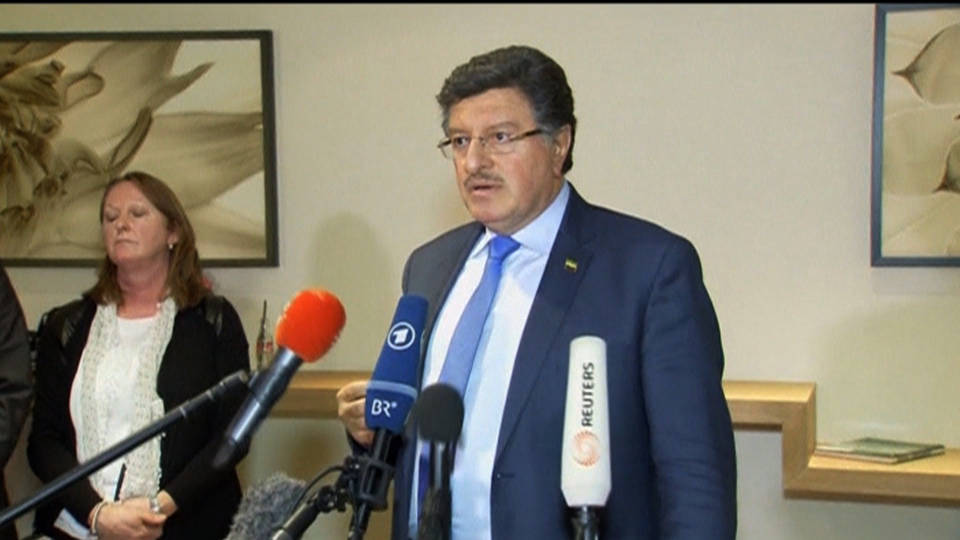
U.S. Secretary of State John Kerry and other world leaders have announced they’ve made progress toward a "cessation of hostilities" in the ongoing conflict in Syria. The announcement comes amid a two-day meeting in Munich of the International Syria Support Group, whose members include the United States, the European Union, the Arab League, China, Egypt, Russia, Saudi Arabia, Turkey and other world powers. The meeting does not include the Assad government or any of the Syrian opposition groups. A different set of U.N.-hosted peace talks that included the Assad government and various members of the opposition fell apart last week. During the meeting in Munich, world leaders agreed to work to ease the fighting within one week and to allow humanitarian aid to reach besieged areas. Syrian opposition spokesperson Salim al-Muslat welcomed the announcement.
Salim al-Muslat: "We welcome the effort that our friends are making to relieve the Syrian people. It must be for all Syrians, We must see action on the ground. Once we see implementation, we will be ready for the political process."
The meeting in Munich comes as intense fighting continues in the northeast city of Aleppo. The Assad government, backed by Russian airstrikes, has been carrying out an offensive on Aleppo, forcing tens of thousands of Syrians to flee to the border with Turkey. On Thursday, the Russian defense minister accused the U.S.-led coalition of also launching airstrikes on Aleppo on this week. U.S. officials deny the allegations.
Turkey: Offices of Two Pro-Government Newspapers Firebombed

In Turkey, the offices of two daily newspapers have been firebombed. On Thursday afternoon, attackers shot at and threw firebombs at the offices of pro-government newspapers. No one was hurt in either attack.
Pentagon: U.S. Carries Out 20 Strikes on ISIL in Afghanistan in 3 Weeks
Pentagon officials say they have stepped up airstrikes against ISIL in Afghanistan, launching about 20 airstrikes in the eastern region of Afghanistan over the last three weeks. This comes after President Obama expanded the Pentagon’s authority to conduct airstrikes against ISIL in Afghanistan. Meanwhile, the Pentagon is sending 500 U.S. soldiers to Helmand province in southern Afghanistan to fight the Taliban. It’s the largest single deployment to Helmand province since President Obama declared an end to the U.S. combat mission in Afghanistan in 2014. The deployment does not increase the overall troop level in Afghanistan, which remains at just under 10,000 soldiers.
NYPD Officer Liang Guilty of Manslaughter in Death of Akai Gurley
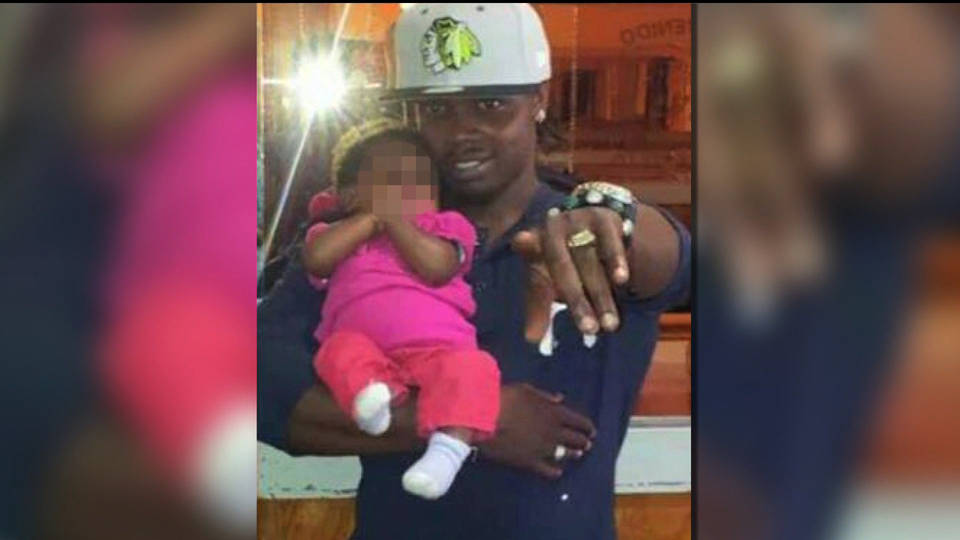
In New York City, a police officer has been found guilty of second-degree manslaughter in the fatal shooting of 28-year-old unarmed African American Akai Gurley. In 2014, NYPD officer Peter Liang shot Gurley in the darkened stairwell of a Brooklyn housing project. Gurley was walking down the stairs with his girlfriend because the elevator was broken. Following the shooting, Officer Peter Liang first texted his union representative before making a radio call for help. On Thursday, a Brooklyn jury found Liang guilty of second-degree manslaughter and official misconduct. He now faces up to 15 years in prison. He will be sentenced on April 14. After the verdict was announced, Akai Gurley’s mother, Sylvia Palmer, spoke out.
Sylvia Palmer: "I was very happy with the verdict. First, I want to thank God. And then I want to thank the District Attorney’s Office, the entire staff at the District Attorney’s Office. They did an awesome job presenting the evidence to the jury and the court. And I just want to say thank you, thank you to everyone, for all your support."
NYPD Tracked Civilian Cellphones Without Warrant 1,000 Times
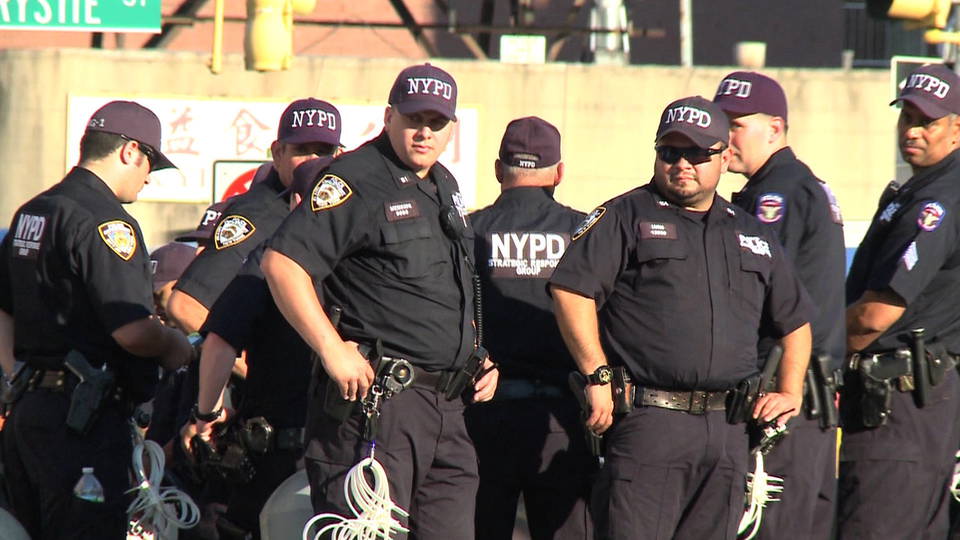
In more news from New York City, public records obtained by the New York Civil Liberties Union shows the NYPD has tracked civilians’ cellphones more than 1,000 times without a warrant since 2008. The ACLU says the NYPD tracked people’s movements via their cellphones by using devices called "stingrays," which mimic cellphone towers to obtain a cellphone’s location at a specific time. The NYPD does not have a policy guiding the department’s use of stingrays.
More People Worldwide Will Own Cellphones Than Have Running Water by 2020

Meanwhile, a new report says 70 percent of the world’s population will have cellphones by 2020. The study by Cisco Systems estimates 5.4 billion people will own mobile phones within just four years. That’s nearly double the number of people worldwide who are estimated to have running water by 2020.
Oregon: Armed Occupation of Malheur Refuge Ends in Surrender
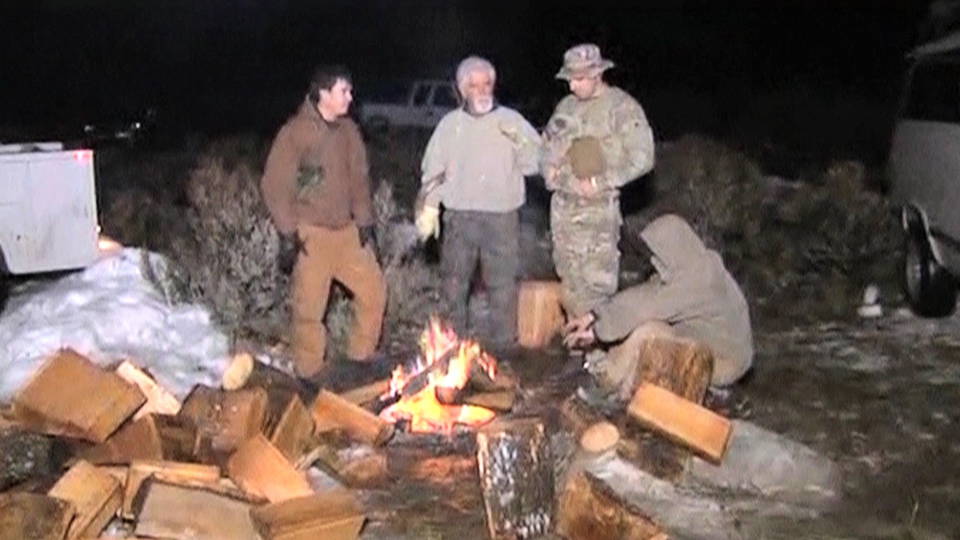
After 41 days, the occupation at the Oregon wildlife refuge has ended, after the remaining four antigovernment militia members surrendered to the FBI. On January 2, the militia members took over the wildlife refuge in support of two ranchers sentenced to prison for setting fires that burned federal land. The ranchers later turned themselves in to authorities. But the militia members continued their occupation. For weeks, local residents and the Paiute Tribe—which has treaty rights to the land—have called on the militia to leave. On January 27, the FBI arrested militia leaders Ammon and Ryan Bundy in a traffic stop that left group spokesperson Robert "LaVoy" Finicum dead. This week, the FBI also arrested Cliven Bundy at the Portland International Airport on charges of conspiracy and assault on a federal law enforcement officer during Cliven Bundy’s standoff with authorities at his Nevada ranch in 2014. In total, more than a dozen people are now facing federal charges related to the Oregon occupation.
Democrats Introduce Keep It in the Ground Act into House

Democratic lawmakers have introduced new legislation that would ban new coal, oil and gas extraction leases on U.S. public land. The introduction of the so-called Keep It in the Ground Act into Congress comes after a coalition of more than 400 organizations have called on the White House to stop issuing new fossil fuel leases on public lands and oceans. A similar version of the bill has already been introduced in the Senate by presidential candidate and Vermont Senator Bernie Sanders. Thursday’s introduction of the bill, which has 16 Democratic co-sponsors, is largely seen as a symbolic gesture, as the House is controlled by Republican lawmakers.
Morgan Stanley to Pay $3.2 Billion to Settle Allegation of Fraud

In news from Wall Street, banking giant Morgan Stanley will pay $3.2 billion to settle a slew of federal and state charges that the bank lied to investors about the value of residential mortgage-backed securities, which played a role in triggering the global financial recession that began in late 2007. This is the latest in a series of financial settlements by banking giants charged with lying about the value of the toxic mortgage-backed securities. President Obama set up a working group in 2012 to investigate wrongdoings in the mortgage market in the lead-up to the financial crisis. So far, this working group has led to Bank of America paying out $16.6 billion, JPMorgan paying out $13 billion and Citigroup paying out $7 billion in settlements, in addition to Morgan Stanley’s settlement announced Thursday. The investigations have not led to criminal charges or jail time for any banking executives involved.
Flint: Emails Suggest Snyder Withheld Lead Test Results for 6 Days

In news from Flint, new emails obtained by The Flint Journal suggest Michigan Governor Rick Snyder told the Department of Environmental Quality to withhold information about the results of lead tests for nearly a week as Snyder’s office tried to determine the best way to present the information to the public. The emails obtained through a Freedom of Information request show that the Department of Environmental Quality withheld the lead test results from Genesee County health officials for at least six days. Agency officials later apologized to the health department officials for the delay, saying the Governor’s Office had asked them not to disclose the information until a scheduled press conference on October 8, 2015. This press conference was when Snyder announced that Flint would reconnect to Detroit’s water system. Under the direction of an unelected emergency manager appointed by Governor Snyder, the city had switched the source of its drinking water to the corrosive Flint River, which caused the city’s lead pipes to corrode, spiking the level of lead in the drinking water. Snyder’s office has denied that it withheld the information about the results of the lead tests.
Protesters to Australia Gov't over Asylum Seekers' Relocation: #LetThemStay
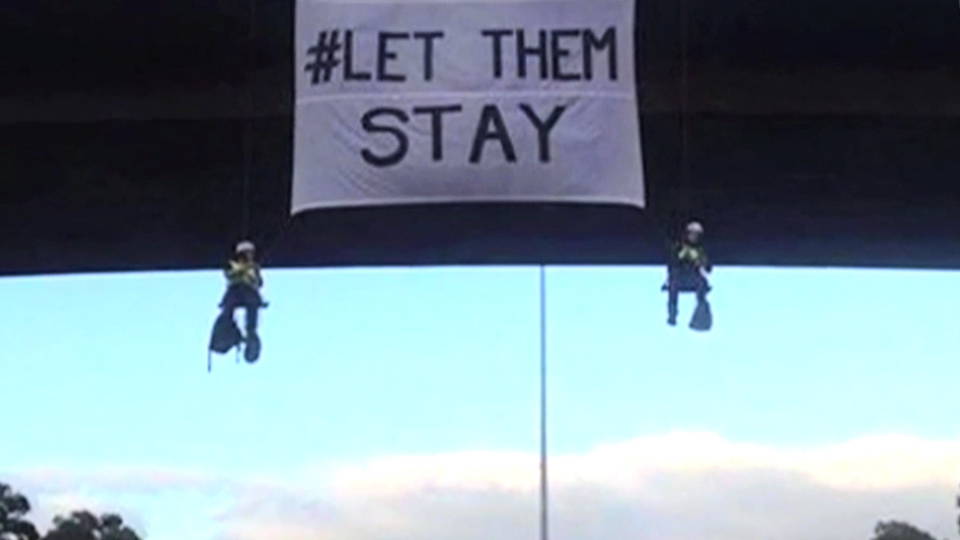
In Australia, two women hung from a bridge and unfurled a giant banner over a Melbourne freeway reading "Let Them Stay," as a protest against the government’s plans to relocate 267 asylum seekers from Australia to detention camps on Nauru. The group of asylum seekers who may be relocated include 37 babies who were born in Australia, as well as 54 children, the majority of whom are now attending Australian schools. On Thursday, Katherine Woskett spoke out before she lowered herself down from the Yarra Bend Bridge over the Eastern Freeway.
Katherine Woskett: "We encourage other Australians to take direct action to stand up for those who can’t. The government needs to let them stay."
Chicago: DACA Mother Reunited with Family After Deportation
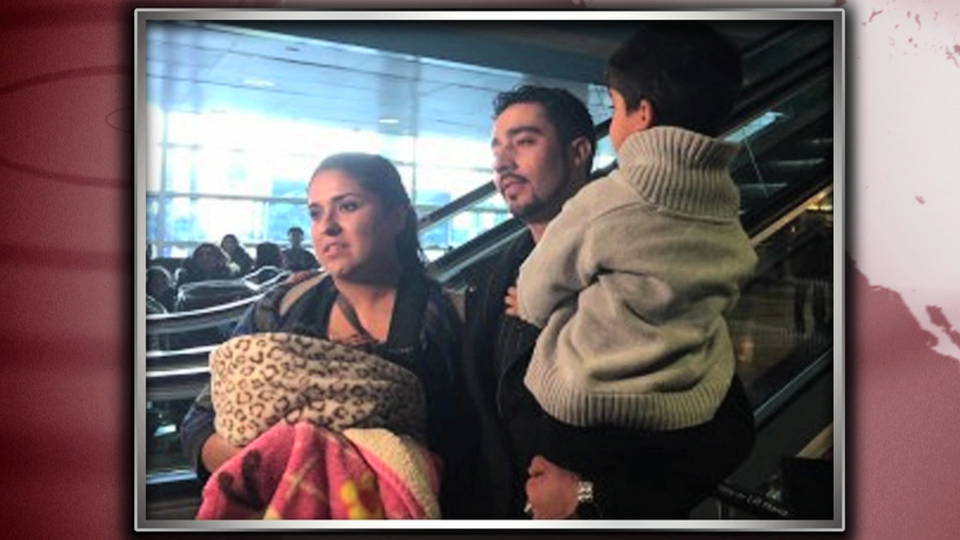
And in Chicago, mother Lesly Sophia Cortez-Martínez has reunited with her family after Border Patrol at O’Hare International Airport deported her last week, despite the fact that Cortez-Martínez had been granted a reprieve from deportation under President Obama’s executive action. Lesly Sophia Cortez-Martínez came to the United States when she was 15. She was granted a reprieve from deportation under Obama’s Deferred Action for Childhood Arrivals Program, or DACA. Cortez-Martínez had reportedly received permission to visit Mexico, but when she was at O’Hare Airport last week, she was deported with her infant and another one of her children. On Thursday, she reunited with her family after receiving permission to return to the United States, although immigrant rights activists say she is still in deportation proceedings.
Donate today:
Follow:

Beyoncé's Super Bowl Touchdown for Black Lives Matter
SPEAKING EVENTS

2/15 New York, NY
2/22 Columbus, OH
WORK WITH DN!

Broadcast Engineer
Director of Finance and Operations
Director of Development
---------------------
Democracy Now! Daily Digest: A Daily Independent Global News Hour with Amy Goodman & Juan González for Thursday, February 11, 2016
democracynow.org
Stories:

As Congressional Black Caucus PAC Prepares to Back Clinton, Barbara Lee Withholds Endorsement

Could Unelected Superdelegates Give Clinton the Nomination Even If Sanders Wins the Primaries?

Barbara Lee: Post-9/11 Vote Should Not Be Used as Blank Check to Keep Waging Perpetual War

Justice Dept. Sues Ferguson, Missouri, to Force Police Reforms
Headlines:
Justice Dept. Sues Ferguson to Force Criminal Justice Reform
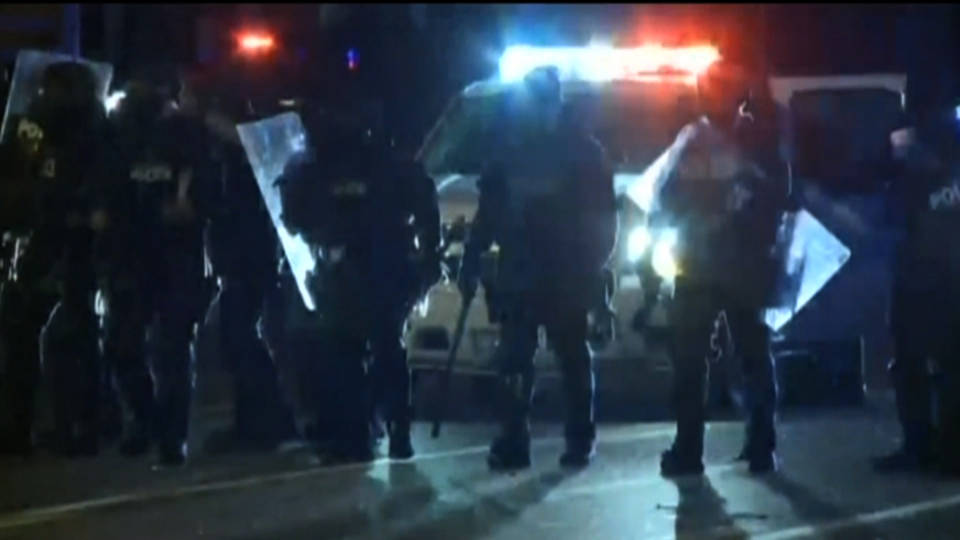
The Department of Justice has sued Ferguson, Missouri, to force an overhaul of the beleaguered city’s criminal justice system. U.S. Attorney General Loretta Lynch filed a civil rights lawsuit Wednesday following a decision by Ferguson’s City Council on Tuesday to challenge several measures in a draft reform agreement that the city had negotiated with federal officials. Speaking at a press conference in Washington, D.C., on Wednesday, Loretta Lynch said, "We intend to aggressively prosecute this case, and we intend to prevail." The lawsuit says Ferguson is guilty of a "pattern or practice" of law enforcement actions violating the First, Fourth and 14th Amendments of the U.S. Constitution and federal civil rights laws.
TOPICS:
Ferguson
Cleveland Bills Family of Tamir Rice $500 for His Ambulance Ride
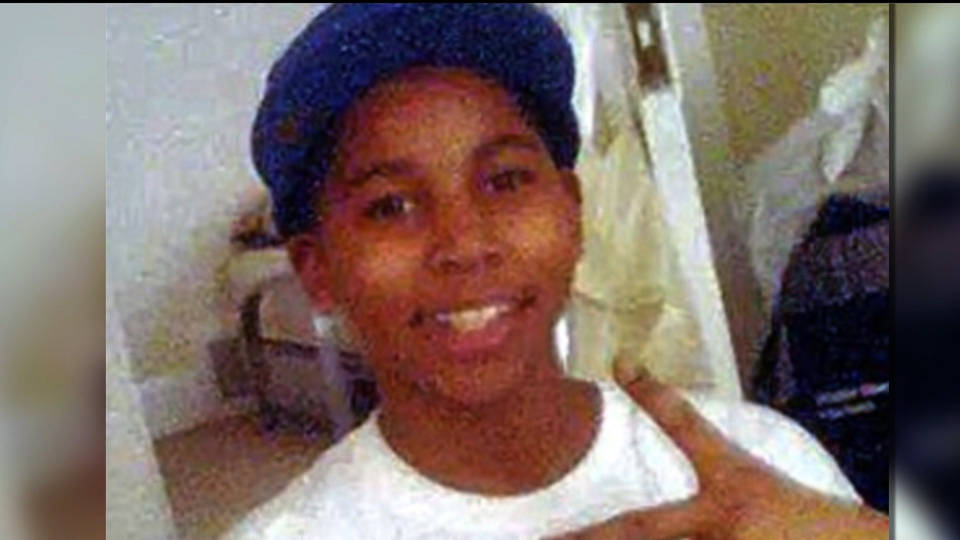
The city of Cleveland has billed the family of Tamir Rice $500 for the ambulance ride to the hospital after the 12-year-old boy was fatally shot by a Cleveland police officer in November 2014. This comes less than two months after a grand jury decided not to indict Officer Timothy Loehmann in Rice’s death. The claim filed Wednesday is "against the estate of Tamir Rice in the amount of Five Hundred Dollars, which is past due and owing for emergency medical services rendered as the decedent’s last dying expense." In response, Rice family attorney Subodh Chandra said, "That the city would submit a bill and call itself a creditor after having had its own police officers slay 12-year-old Tamir displays a new pinnacle of callousness and insensitivity."
TOPICS:
Police Brutality
Federal Grand Jury Examines Death of Eric Garner
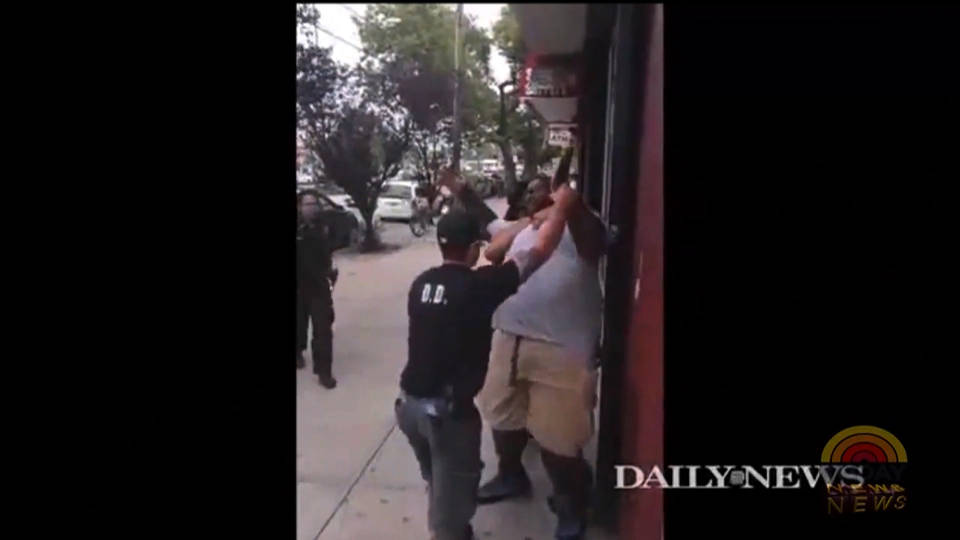
This comes as prosecutors begin introducing evidence to a federal grand jury in Brooklyn impaneled to examine the death of Eric Garner, who died after being placed in an illegal chokehold by white police officer Daniel Pantaleo in July 2014. A Staten Island grand jury failed to indict Officer Pantaleo in December 2014, sparking national protests.
Oregon: FBI Agents Encircle Remaining Occupying Militia Members
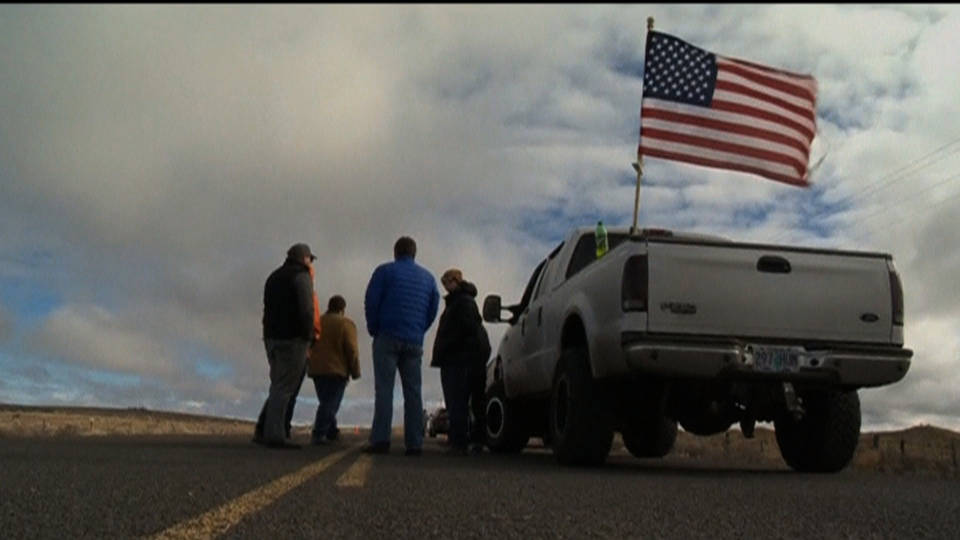
In Oregon, FBI agents have encircled the remaining right-wing militia members occupying the federal wildlife refuge. This comes as Nevada rancher Cliven Bundy was arrested Wednesday night at the Portland International Airport on charges related to his armed showdown with federal authorities in Nevada in 2014. His sons, Ryan and Ammon Bundy, helped start the takeover of the federal wildlife refuge in Oregon and are also in custody facing charges related to this takeover. Meanwhile, the Oregon ACLU has issued a carefully worded defense of right-wing Internet radio show host Pete Santilli, who is also facing a felony charge related to the wildlife refuge occupation. The ACLU says Santilli embedded with the militia members as a journalist. Mat dos Santos, the legal director of the ACLU of Oregon, writes: "We can all agree that we should not hold members of the media or protesters in jail without bail simply because they have shocking or abhorrent views. These are principles that we must stand by, even when we disagree with the message of the speaker."
Carly Fiorina and Chris Christie Drop Out of 2016 Presidential Race
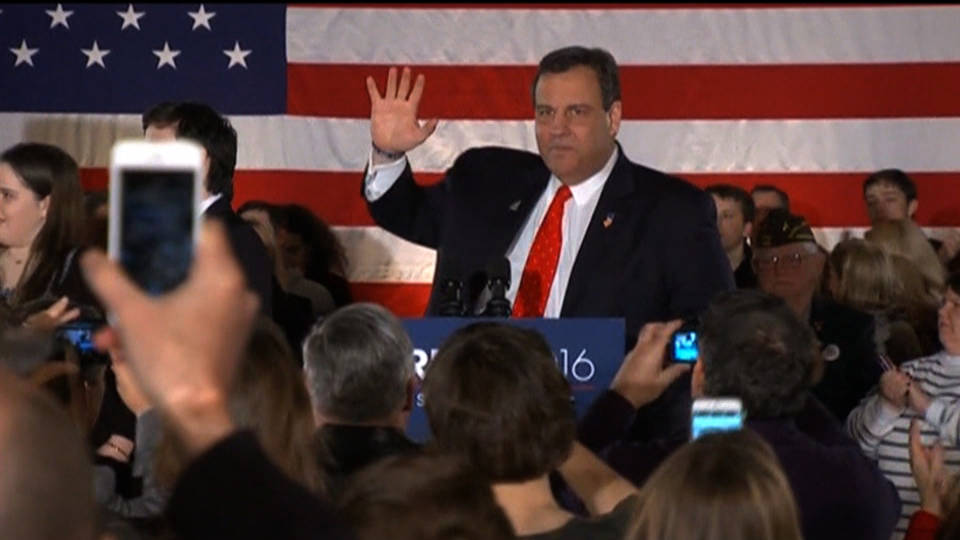
In news from the 2016 presidential race, Republican candidates former Hewlett-Packard CEO Carly Fiorina and New Jersey Governor Chris Christie have dropped out of the race, following poor performances in the New Hampshire primary.
Sanders and Clinton to Face Off in Wisconsin Debate Tonight
PBS is hosting a Democratic presidential debate in Wisconsin tonight. This comes as Clinton is expected to pick up a key endorsement from the political action committee, or PAC, of the Congressional Black Caucus today. Hillary Clinton is also expected to campaign next week with Geneva Reed-Veal, the mother of Sandra Bland, the 28-year-old African-American woman who was found hanged in her jail cell three days after a white Texas state trooper arrested her in July for allegedly failing to signal a lane change. Meanwhile, Michelle Alexander has written a seething critique of Hillary Clinton, published yesterday by The Nation magazine. Alexander, the author of "The New Jim Crow," argues Clinton does not deserve the black vote, pointing to her role in advocating for the passage of the 1994 crime bill, as well as the 1996 Welfare Reform Act. Alexander writes: "It is difficult to overstate the damage that’s been done. Generations have been lost to the prison system; countless families have been torn apart or rendered homeless; and a school-to-prison pipeline has been born that shuttles young people from their decrepit, underfunded schools to brand-new high-tech prisons. ... Hillary believes that she can win this game in 2016 because this time she’s got us, the black vote, in her back pocket—her lucky card. She may be surprised to discover that the younger generation no longer wants to play her game."
30,000 Stranded at Syria-Turkey Border as Aleppo Under Assault

In news from the Middle East, tens of thousands of Syrians fleeing an Assad offensive on the city of Aleppo are massed at the Syria-Turkey border. Turkey has closed this section of the border, leaving tens of thousands of Syrians stranded. There are already 2.5 million Syrian refugees living in Turkey. The Assad offensive on Aleppo is backed by Russian airstrikes. Russia says its airstrikes have hit about 1,900 targets in Syria—including in Aleppo—within the last week alone. On Wednesday, Turkish Prime Minister Ahmet Davutoglu accused the Assad government and Russian military of carrying out a campaign of "ethnic cleansing" in Aleppo.
Prime Minister Ahmet Davutoglu: "We should all accept refugees, but these attacks are also intended to bring about a kind of ethnic cleansing in Syria, so that all people who don’t support the Syrian regime, they are driven out of the country. It’s a systematic ethnic cleansing."
11.5% of Syrians Killed or Injured Since 2011

This comes as a new report by the Syrian Center for Policy Research says 11.5 percent of Syria’s population has either been killed or injured since 2011. About 470,000 Syrians have been killed in the ongoing conflict. Nearly 2 million people have been wounded. Over the last five years, Syria’s life expectancy has dropped from an average of 70 years to only 55 years. Speaking Tuesday, Secretary of State John Kerry condemned the Assad government and the Russian military’s use of cluster bombs in Syria.
Secretary of State John Kerry: "It is urgent, the crisis of humanitarian catastrophe unfolding before the eyes of the world, the pressures on the region of displaced people, of refugees, the dumb bombs, cluster bombs that are being used, that are killing innocent women and children."
That was Secretary of State John Kerry speaking alongside the Egyptian foreign minister at the U.S. Department of State on Tuesday, condemning Russia’s use of cluster bombs in Syria. Yet Kerry did not speak out against the use of U.S.-manufactured cluster bombs in another conflict—the U.S.-backed, Saudi-led offensive in Yemen. Amnesty International says it has new evidence that the U.S.-backed, Saudi-led coalition dropped cluster bombs during an air attack on Sana’a on January 6, which killed a 16-year-old boy and injured at least a half-dozen other civilians. U.N. Secretary-General Ban Ki-moon says the January 6 attack may amount to a war crime.
Two Yemeni Journalists and Three Children Killed in Saudi Airstrikes

Meanwhile, two Yemeni television journalists have died after a U.S.-backed, Saudi-led coalition airstrike hit their home in Sana’a on Tuesday, killing both the journalists and their three children. Thirty-year-old Suaad Hujaira and her husband, 37-year-old Muneer Alhakami, both worked for Yemen TV. This comes as UNICEF is warning of massive food shortages in Yemen as a result of the ongoing conflict. UNICEFspokesperson Mohammed al-Saadi said as many as 1.3 million Yemeni children are suffering from severe and acute malnutrition.
Mohammed al-Saadi: "Since the start of the armed clashes on the 26th of March last year, the number of cases of malnutrition has doubled. We are talking about more than 1.3 million children suffering from severe and acute malnutrition, and this is very dangerous and could lead to death or physical or mental deformities in children."
Nigeria: 58 Killed in Suicide Bomb Attacks in Dikwa Refugee Camp

In Nigeria, 58 people have been killed after attacks by two female suicide bombers at the Dikwa refugee camp Tuesday morning. The attack is being blamed on the militant group Boko Haram. The refugee camp is home to more than 50,000 people who have been forced from their homes by the militant group. Reports say a third would-be suicide bomber who had traveled with the other two girls decided not to detonate her device after she recognized her parents and siblings at the camp.
London: Thousands of Taxi Drivers Stall Traffic in Uber Protest
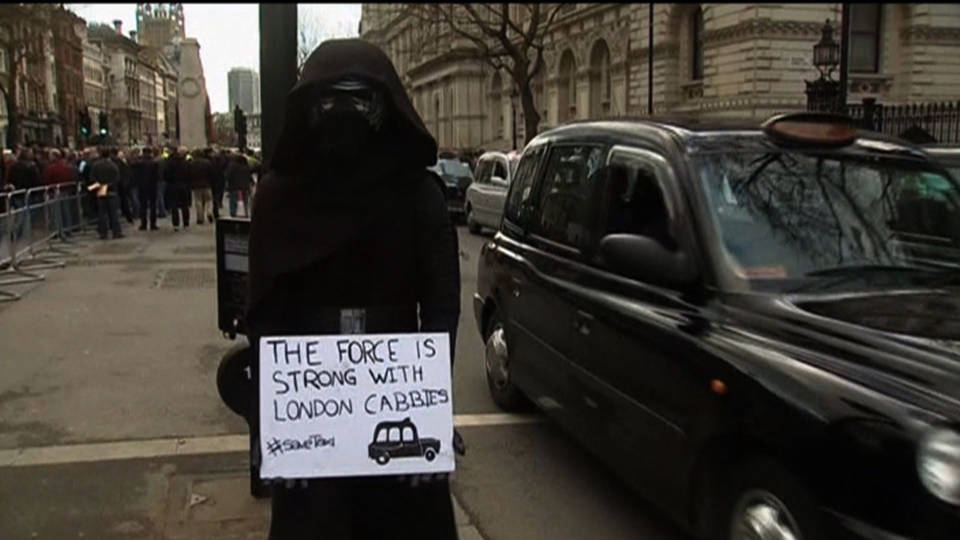
In Britain, thousands of taxi drivers brought downtown London to a standstill during a protest against Uber Wednesday. Thousands of taxi drivers shut down the city’s main streets and the area around Prime Minister David Cameron’s house for 90 minutes. The taxi unions say they are protesting new government regulations they say favor Uber and compromise driver safety. Wednesday’s protest is the latest in a series of demonstrations against Uber. Taxi drivers in Paris, Hong Kong, Miami and other major cities have all protested the Wall Street-backed company, saying Uber threatens their union rights and livelihood.
Mexico: Dozens Dead in Clash, Fire at Monterrey Prison
In breaking news from Mexico, as many as 50 people have died in a prison riot in Monterrey this morning. Both prisoners and prison guards have died. Local reports say that a fire broke out inside the prison.
Mexican Journalist Survives Attack, 1 Day After Another Journalist Found Dead

Meanwhile, journalist Pedro Sala García survived an attack by armed gunmen in his home Wednesday. Sala García is a correspondent for Tabasco Hoy, a daily newspaper in the southern Mexican state of Tabasco. The gunmen beat Sala García unconscious during the attack, but they fled after his wife called for help from their neighbors. Speaking to local reporters from the hospital, Sala García said this is the second attack on his life that he’s suffered during his journalistic career. In 2007, another journalist from his newspaper, Rodolfo Rincón, was kidnapped. His body has never been found. The attack Wednesday comes only one day after journalist Anabel Flores Salazar was found dead. Anabel Flores Salazar covered crime for the newspaper El Sol de Orizaba. She had a baby and a four-year-old son.
Donate today:
Follow:

Part 2: Ta-Nehisi Coates on Moving to Paris, #BlackLivesMatter, Bill Cosby, #OscarsSoWhite & More
SPEAKING EVENTS

2/15 New York, NY
2/22 Columbus, OH
WORK WITH DN!

Broadcast Engineer
Director of Finance and Operations
Director of Development
---------------------
Democracy Now! Daily Digest: A Daily Independent Global News Hour with Amy Goodman & Juan González for Wednesday, February 10, 2016
democracynow.org
Stories:

Ta-Nehisi Coates Is Voting for Bernie Sanders Despite the Senator's Opposition to Reparations

Bernie Sanders on NH Victory: "Tonight We Served Notice to the Political and Economic Establishment"

"An Earthshaking Moment": Sanders Win Reveals Deep Divide Between Voters & Democratic Party Leaders

After Running Xenophobic & Racist Campaign, Donald Trump Wins Easily in New Hampshire
Headlines:
Sanders Wins NH Democratic Primary in a Landslide
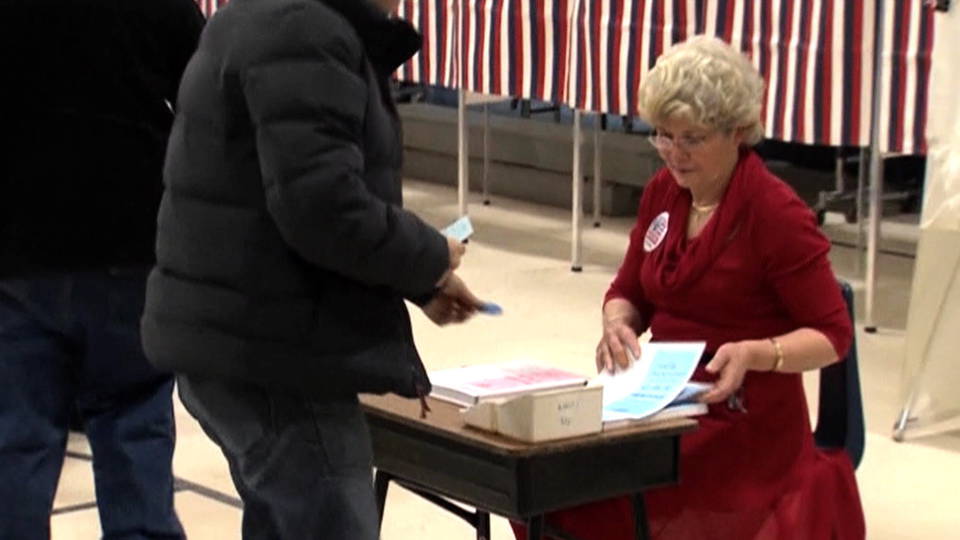
Senator Bernie Sanders and Donald Trump soared to commanding victories in the New Hampshire primaries Tuesday. On the Democratic side, Sanders beat former Secretary of State Hillary Clinton by a margin of 60 to 38 percent. Eight years ago, Clinton won New Hampshire, defeating Senator Barack Obama. When polling first began in New Hampshire, Clinton was projected to win by as much as 50 percent. On Tuesday, Sanders beat Clinton in nearly every demographic area except for senior citizens. According to exit polls, 55 percent of women—including 70 percent of women under 30—backed the Vermont senator. Overall, Sanders won 83 percent of the under-30 vote. Sanders has become the first Jewish candidate to ever win a major presidential primary. He gave his victory speech in Concord, New Hampshire.
Sen. Bernie Sanders: "Together, we have sent a message that will echo from Wall Street to Washington, from Maine to California. And that is that the government of our great country belongs to all of the people and not just a handful of wealthy campaign contributors and their super PACs."
TOPICS:
2016 Election
Donald Trump Wins NH GOP Primary; Kasich Surprise Second
On the Republican side, Donald Trump won 35 percent of the vote. Ohio Governor John Kasich placed a surprising second with 15 percent, followed by Ted Cruz, Jeb Bush, Marco Rubio and Chris Christie. Trump delivered his victory speech in Manchester.
Donald Trump: "First of all, congratulations to Bernie. In all fairness, we have to congratulate him. We may not like it. But I heard parts of Bernie’s speech. He wants to give away our country, folks. He wants to give away. We’re not going to let it happen."
Supreme Court Halts Obama's Coal Plant Rules in Blow to Paris Accord

ISIL Claims Bomb Attack in Syrian Capital for the 1st Time

In news from Syria, ISIL has claimed responsibility for a car bomb attack in the capital Damascus, marking the first time it’s claimed an attack inside the Syrian capital. The Syrian Observatory for Human Rights said eight police officers were killed and about 20 wounded in the explosion, which hit a police officers’ club.
NYC: Protesters Demand Media Coverage of Turkey's "Massacre" of Kurds
Pro-Kurdish activists rallied outside The New York Times and marched to CNNTuesday to protest the lack of media coverage of what they say was a massacre of Kurdish people by government forces in Turkey. Turkey says it carried out a military operation against people it identified as militants with the Kurdistan Workers’ Party, or PKK. Initial state media reports put the death toll at 60, although that number was later retracted. The local governorate said 10 people were killed. But pro-Kurdish lawmakers have accused Turkish forces of massacring dozens of wounded civilians. Protesters rallied here in New York City.
Elif Genc: "My name is Elif Genc. I’m from the HDK NYC, and so that’s the Peoples’ Democratic Congress. And the reason that we’re here today is because we’re just trying to bring awareness to a horrific massacre that occurred over the weekend in Turkey. They’re actually just opening fire and just openly killing, with like reckless abandon, just children, women—it doesn’t matter who. But there should definitely just be some awareness on the part of the international community that Turkey is—put pressure on Turkey to stop this, because if there was—I mean, there are American weapons companies that are selling weapons to the Turkish army to kill these people, to begin with."
Michigan Governor Rick Snyder Skips Congressional Hearing on Flint Water
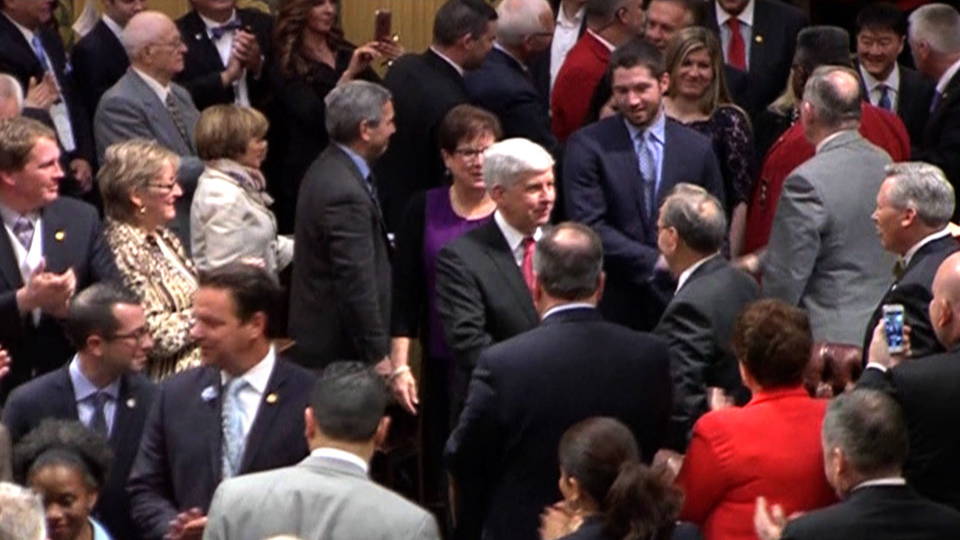
Michigan Governor Rick Snyder will not testify before today’s congressional hearing on children poisoned by lead in Flint’s water supply. Snyder said he could not testify before the House committee hearing because he had to give a budget presentation to the state Legislature. The water contamination in Flint began when an unelected emergency managed appointed by Governor Snyder switched the city’s water supply to the corrosive Flint River. On Tuesday, Todd Flood, a special counsel investigating the crisis for the attorney general, said it could potentially lead to criminal charges, including involuntary manslaughter. Flood has donated $3,000 to Governor Snyder’s past campaigns. Flint Mayor Karen Weaver has laid out a $55 million plan to replace the city’s lead water service pipes within a year. Governor Snyder is expected to seek $195 million to address the Flint water crisis in his budget request today.
Former Greek Finance Minister Launches New Europe-Wide Movement
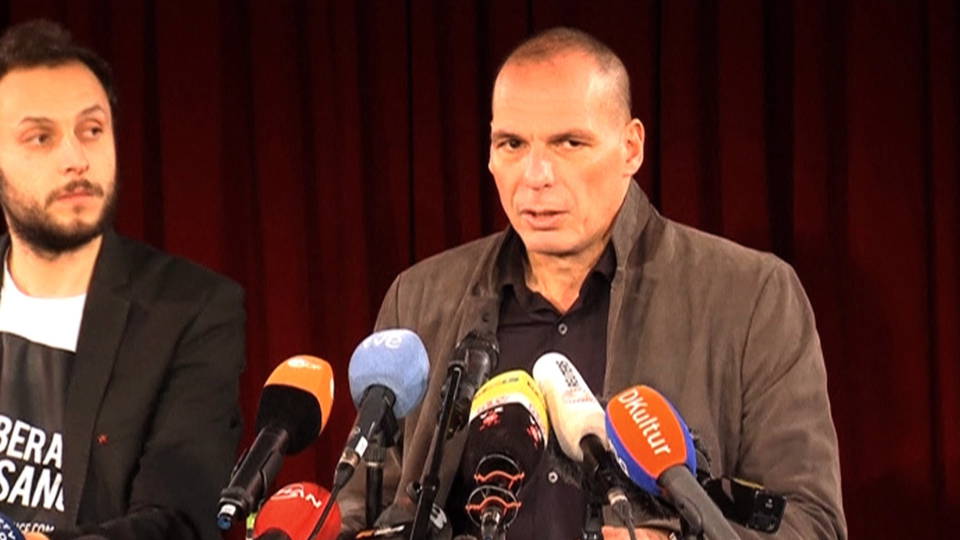
Former Greek Finance Minister Yanis Varoufakis has announced the launch of a new grassroots movement to bring together progressive groups and parties with the goal of democratizing Europe. Varoufakis, known for his stance against German-backed austerity in Greece, made the announcement Tuesday night in Berlin.
Yanis Varoufakis: "The only alternative is to try something we’ve never tried before—a political movement that starts everywhere in Europe at once, cross-border, independently of political—prior political party affiliations, that has one simple objective: to get Europeans around a metaphorical table, digital table, in forums like this one tonight, to discuss, as Europeans, their common problems and what we want our common solutions to these common problems to be."
Mexican Reporter Found Dead; Report Finds Country Leads World in Journalists' Disappearances
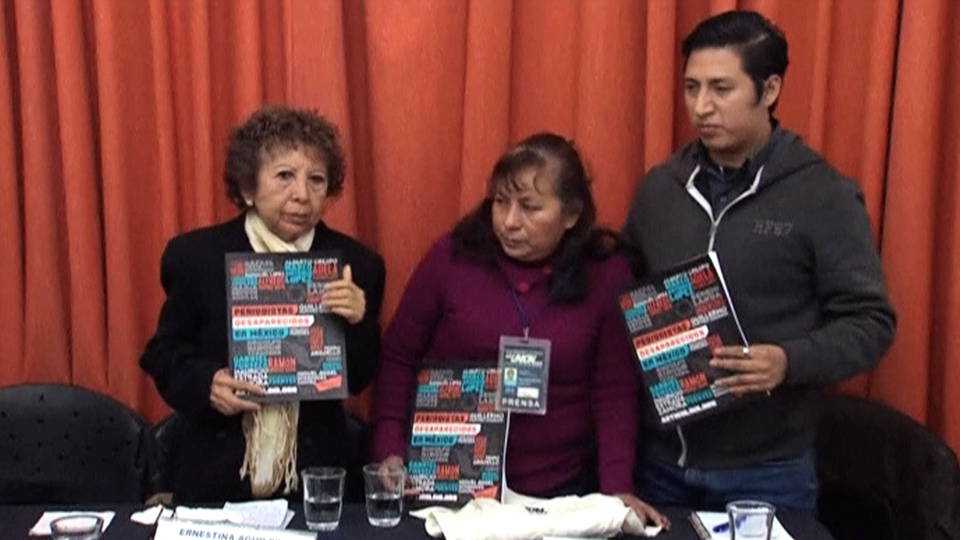
In Mexico, a journalist who was kidnapped from her home in Veracruz Monday has been found dead in the neighboring state of Puebla. Anabel Flores Salazar covered crime for the newspaper El Sol de Orizaba. She had a baby and a four-year-old son. Her death came as the journalism advocacy group Article 19 released a report saying at least 23 journalists have disappeared in Mexico in the past 12 years, the highest number anywhere in the world. Article 19 said there are indications of possible complicity by authorities in the recent death of Anabel Flores Salazar.
U.S. Intel Chief: Smart Home Devices Present "New Opportunities" for Spying

U.S. Director of National Intelligence James Clapper has acknowledged for the first time government agencies might use a range of home devices connected to the Internet in order to conduct spying. Clapper’s comments relate to the so-called Internet of Things, an array of web-connected devices, from kids’ toys to smart TVs and remotely operated thermostats. In testimony submitted to the Senate, Clapper said "widespread vulnerabilities" in the devices represent "new opportunities for our own intelligence services."
Ferguson City Council Backs Most DOJ Reforms, Seeks Delay and Changes
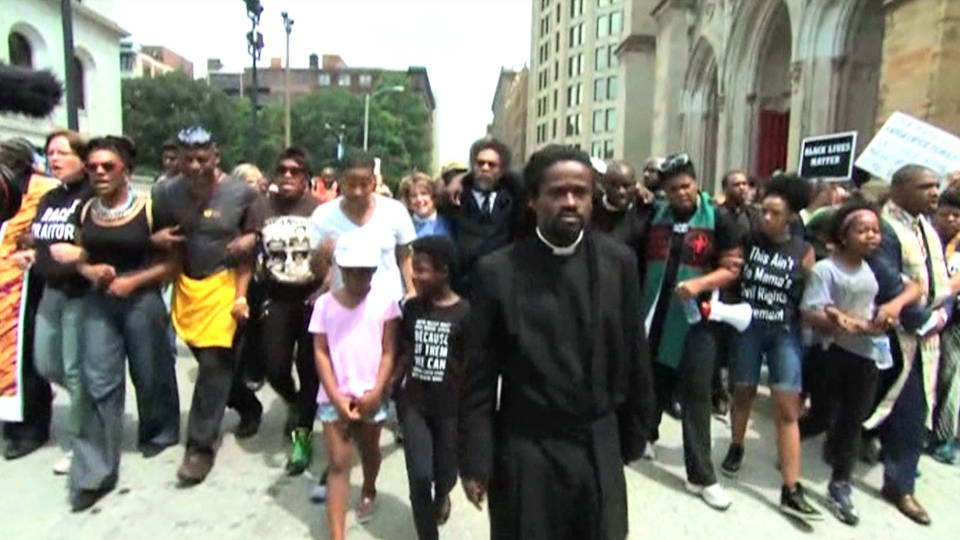
The City Council in Ferguson, Missouri has voted to approve the broad terms of an agreement with the Justice Department to address rampant discrimination in the police and court system. But the council also sought a series of changes, including an additional six months to make the reforms, and an exemption for outside agencies if police work is outsourced. A Justice Department official called the vote an "unfortunate outcome" that "creates an unnecessary delay." A Justice Department probe following the police shooting of Michael Brown found police and courts in Ferguson routinely engaged in a pattern and practice of discrimination against African Americans.
Jury Acquits Reverend Who Knelt in Prayer During Ferguson Protests
Tuesday’s council vote came the same day a St. Louis County jury acquitted local activist and pastor Reverend Osagyefo Sekou of failing to comply with police during protests over Michael Brown’s death. Sekou says he knelt in prayer in front of police as they advanced on peaceful protesters.
NYC: Jury to Determine Fate of Officer Who Shot Akai Gurley in Dark Stairwell
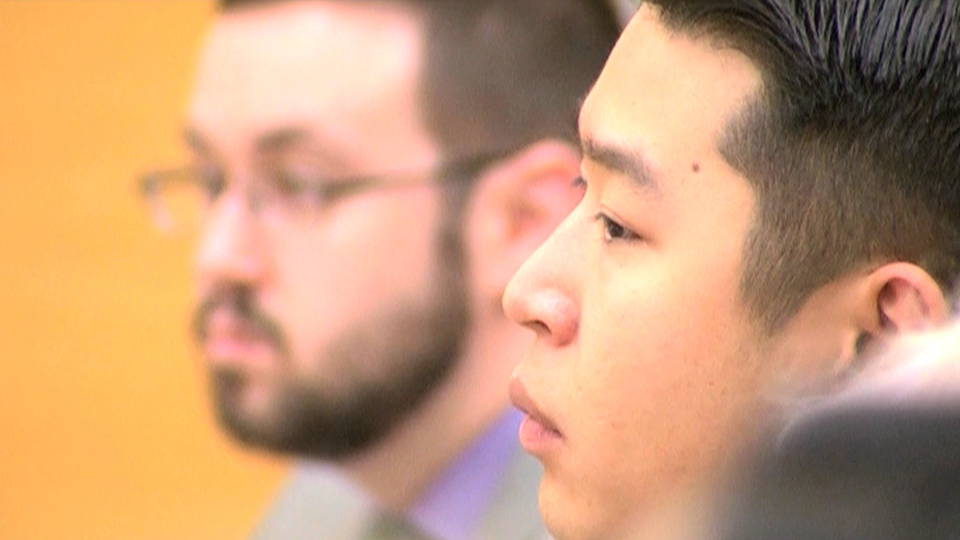
Both sides have presented their closing arguments in the manslaughter trial of New York City police officer Peter Liang for the fatal shooting of unarmed African American Akai Gurley. A jury will now consider the fate of Liang, who shot Gurley in the darkened stairwell of a Brooklyn housing project. Officer Liang said he was startled by a noise and flinched, accidentally firing his gun. But Assistant District Attorney Joseph Alexis said the shooting was no accident.
Joseph Alexis: "The gun did not just go off. This officer took his finger off of the frame of the gun, if it was ever there. He put his finger onto the trigger. He pointed the gun directly in the direction where the sound was. And he fired. And he shot. And the shot that he fired hit off the wall. It’s no accident that it hit off the wall steps away from where Akai Gurley stood. It’s no accident that that bullet then ripped through his heart and landed in his liver and killed him."
Black Lives Matter Activist Kills Himself on Steps of Ohio Statehouse
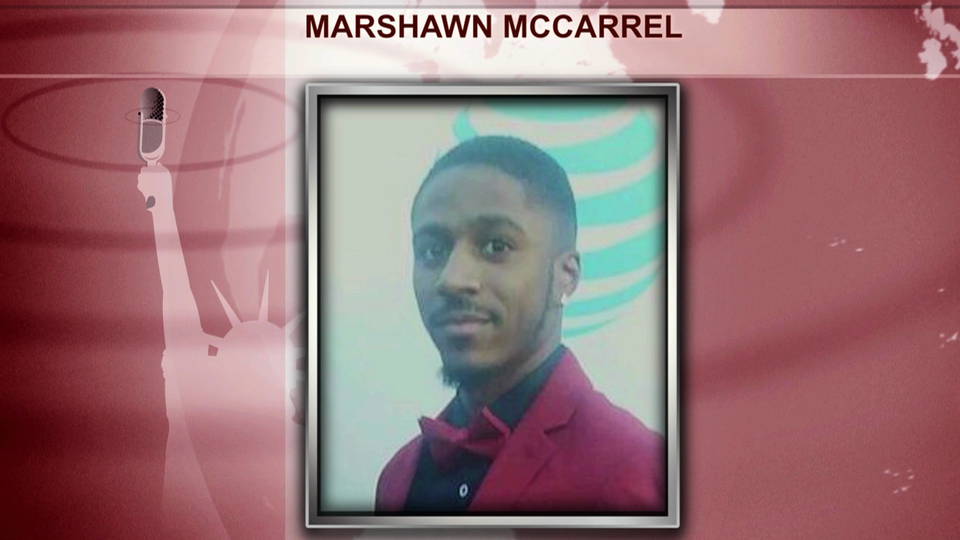
A Black Lives Matter activist has shot himself to death at the entrance to the Ohio Statehouse. MarShawn McCarrel was 23 years old. He organized against the police shooting of Michael Brown in Ferguson and worked to aid the homeless, after he himself was homeless for three months. His last post on Twitter said he wanted to "let the record show" that he urinated on the Statehouse "before I left."
Sikh Actor Gets Apology, Criticizes TSA After Being Barred from Flight
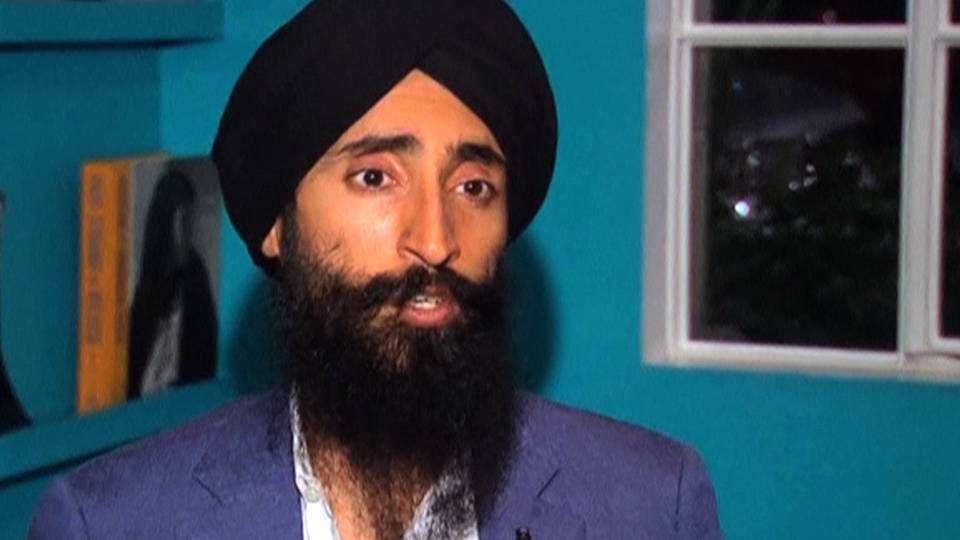
An actor and designer who follows the Sikh religion and was barred from boarding a flight for refusing to remove his turban says the airline, Aeroméxico, has apologized and issued a directive to staff on religious sensitivity. The move follows an outcry after Waris Ahluwalia was prevented from flying to the United States from Mexico. Ahluwalia said he blames U.S. transportation authorities, not the airline.
Waris Ahluwalia: "No part of me is angry at the Aeroméxico gate agents. They didn’t know. Right? This is an issue that they weren’t—they didn’t know how to deal with it. This is a flight that goes back to America, so it comes under the jurisdiction of the TSA. The TSAneeds to make clearer guidelines for foreign airports on how to deal with Sikh travelers, as well as any traveler that has religious articles of faith."
Vermont: Activists Shut Down Eminent Domain Hearing to Stall Gas Pipeline
And in the Vermont capital Montpelier, community members shut down an eminent domain proceeding Tuesday that would have helped pave the way for a gas pipeline—by breaking into song.
Protesters, singing: "Officer, my dear, all the people here are telling you to leave these folks alone. There’s no need to take their land and home. Officer, my dear, all the people here."
The protesters kept singing, and the hearing was adjourned, stalling efforts by Vermont Gas to seize land from Claire Broughton, a 77-year-old resident of Monkton, Vermont. Protesters say the pipeline would fuel global warming by carrying gas extracted through hydraulic fracturing, or fracking.
Donate today:
Follow:

Part 2: Ta-Nehisi Coates on Moving to Paris, #BlackLivesMatter, Bill Cosby, #OscarsSoWhite & More
SPEAKING EVENTS

2/15 New York, NY
2/22 Columbus, OH
WEB EXCLUSIVE

Part 2: Seth Freed Wessler on Uncovering the Deaths of Dozens at Privatized Immigrant-Only Jails
WORK WITH DN!

Broadcast Engineer
Director of Finance and Operations
Director of Development
---------------------
Democracy Now! Daily Digest: A Daily Independent Global News Hour with Amy Goodman & Juan González for Friday, February 5, 2016
democracynow.org
Stories:

Clinton Accuses Sanders of "Artful Smear" for Questioning Why Wall Street Gives Her Millions

"A Significant Victory": Julian Assange Hails U.N. Panel Calling for His Freedom
A United Nations panel has officially concluded WikiLeaks founder Julian Assange has been "arbitrarily detained" and should be allowed to walk free. Assange has been holed up ... Read More →

Hillary Clinton Refuses to Say If She Will Release Copies of Her Paid Speeches to Goldman Sachs

Sanders & Clinton Spar on 2002 Iraq Vote; Clinton Praises Henry Kissinger
Headlines:
Sanders, Clinton Spar over Money in Politics in Heated Debate
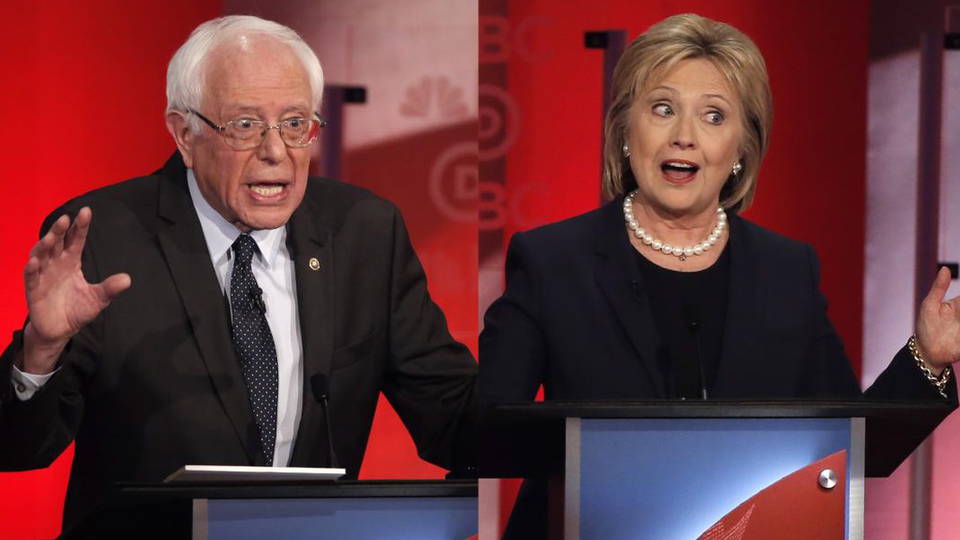
Democratic presidential candidates Bernie Sanders and Hillary Clinton squared off Thursday in a heated debate over the role of money in politics. The debate took place in New Hampshire days before Tuesday’s primary there. Sanders repeatedly questioned Clinton’s progressive credentials, while Clinton accused her opponent of an "artful smear" in suggesting she could be bought by political donations. We’ll havemore on the debate after headlines.
U.N. Panel Calls for Julian Assange's Freedom from "Arbitrary Detention"
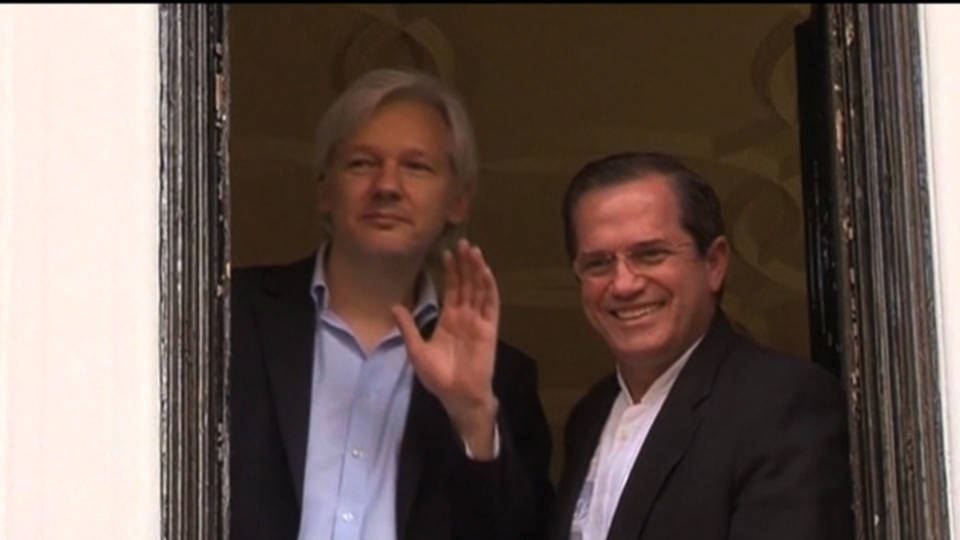
A United Nations panel has officially concluded WikiLeaks founder Julian Assange has been "arbitrarily detained" and should be allowed to walk free. Assange has been holed up in the Ecuadorean Embassy in London for more than three years. He wants to avoid extradition to Sweden over sex crimes allegations, which he has repeatedly denied and for which he has never been charged. He fears Sweden would extradite him to the United States, where he could face trial for WikiLeaks’ revelations. The U.N. panel’s judgment is not legally binding. British Foreign Secretary Philip Hammond dismissed it as "ridiculous." Julian Assange spoke just before our broadcast today; we’ll bring you excerpts later in the broadcast.
Zika Reaches Europe; Colombia Reports 3 Deaths from Related Syndrome

Colombia has confirmed its first three deaths of patients infected with the Zika virus who had contracted Guillain-Barré syndrome—an apparently connected disease that causes paralysis. Colombia has recorded about 100 cases of the syndrome believed to be linked to Zika. Overall, Colombia has confirmed more than 20,000 Zika cases. Meanwhile, Spain has confirmed Zika in a pregnant woman, marking the first known case in Europe. Here in the United States, Florida Governor Rick Scott has declared a state of emergency in five counties affected by Zika; all of the Florida cases were contracted abroad.
U.S. Embraces Saudi Offer to Join Potential Ground Operations in Syria
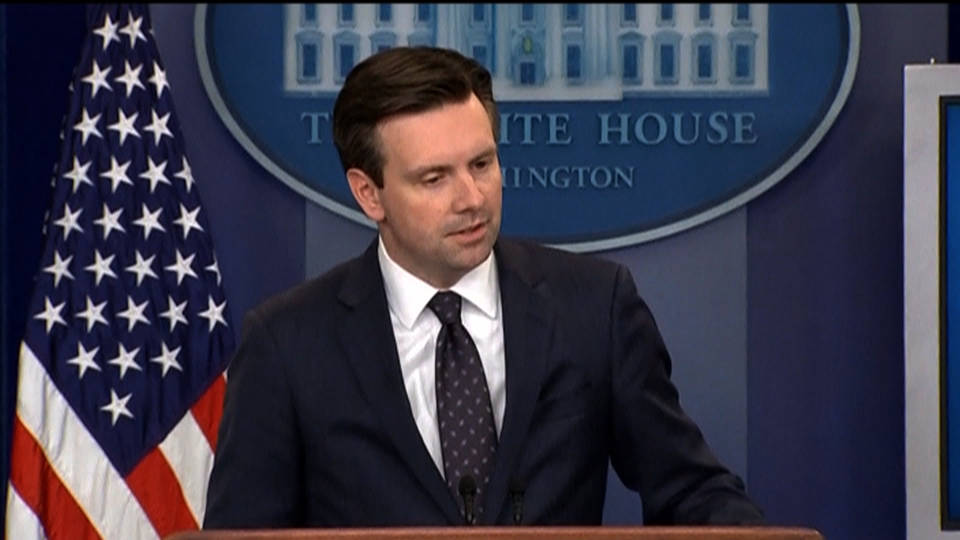
The United States has embraced an offer by Saudi Arabia to join potential ground operations against the self-proclaimed Islamic State in Syria. The news comes as peace talks on the five-year Syrian conflict have broken down. White House Press Secretary Josh Earnest said he hoped the talks would begin again by the end of February.
Josh Earnest: "The U.N. representative, who has been responsible for trying to mediate these discussions, did announce that the talks have been paused. He’s used that terminology primarily because he expects the talks to resume before the end of the month. And we’re obviously hopeful that that will happen. And we’re going to continue to try to encourage both sides in that direction."
Syria: Intensified Violence Drives Up to 70,000 Toward Turkish Border

The aid group Mercy Corps says intensified fighting and airstrikes have cut off the main humanitarian supply route to the Syrian city of Aleppo. Turkey’s prime minister warned up to 70,000 people may be fleeing to the Turkish border. The United States has called for Russia to halt its bombing campaign in Syria immediately.
Australia to Deport Asylum Seekers; Florida Bill Would Allow Military Force Against Refugees
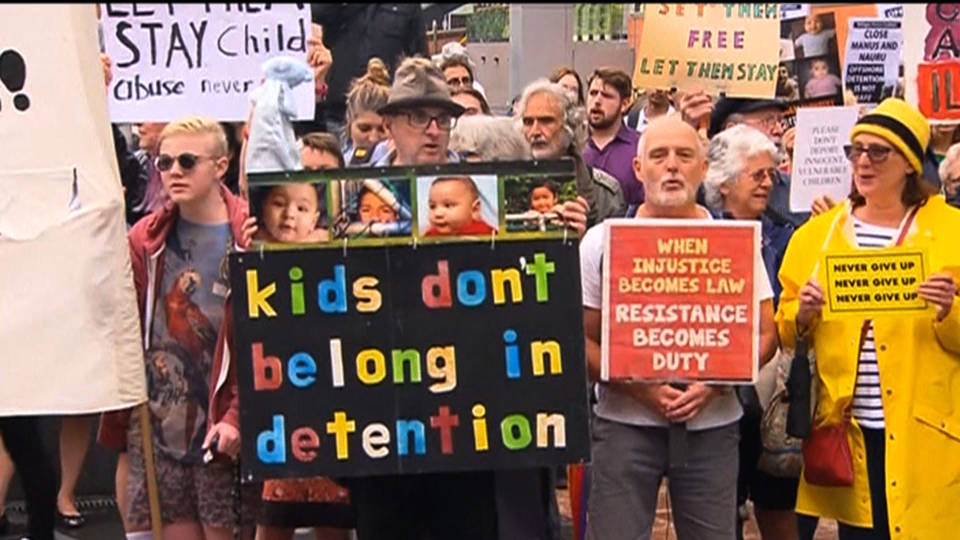
In Australia, thousands of people rallied across the country to protest plans to deport nearly 270 asylum seekers, including 37 babies, to the island of Nauru. The protests came after a court upheld Australia’s offshore detention of asylum seekers. Meanwhile in the United States, a bill passed by a House committee in Florida would allow the Florida governor to use military force to block refugees from entering or resettling in the state.
Egypt: Italian Student Found Dead with Signs of Torture
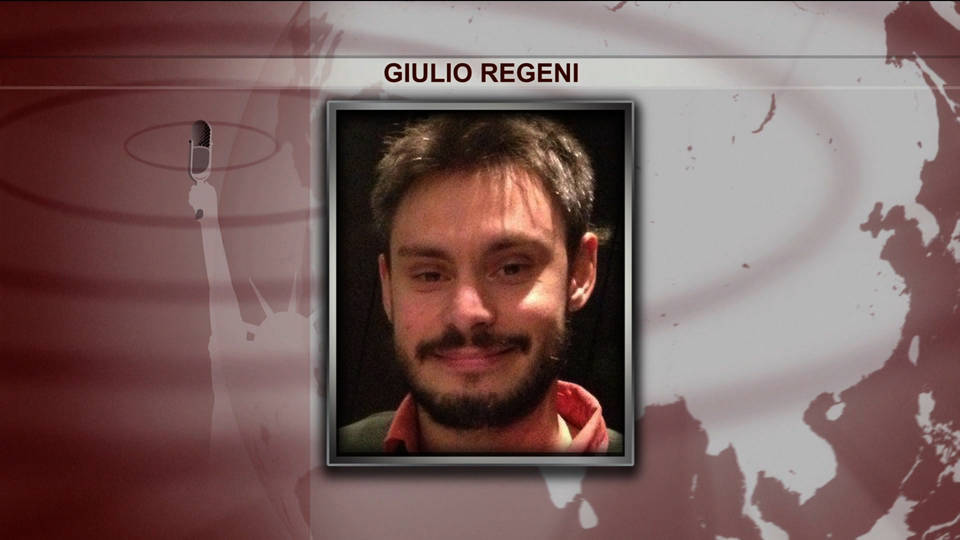
In Egypt, an Italian Ph.D. student has been found dead, his body half-naked and covered with apparent signs of torture. Giulio Regeni went missing on January 25, the fifth anniversary of the revolution that ousted Hosni Mubarak. He had reportedly written about Egyptian labor unions for an Italian newspaper, using a pseudonym over safety concerns. His body showed signs of cigarette burns and head injuries associated with abuses by Egyptian security forces.
Emails Show Michigan Governor's Office Knew of Flint Legionnaires' Link Last March

Newly released emails show top officials in Michigan Governor Rick Snyder’s office knew of a spike in Legionnaires’ disease linked to Flint’s contaminated water long before Governor Snyder told the public. Last month, Snyder said he had only learned of the surge a couple of days prior. But emails released by Progress Michigan show Snyder’s office knew of the outbreak last March, nearly a year ago. The Michigan Democratic Party has joined calls for Snyder to resign. The water crisis began after an unelected emergency manager appointed by Governor Snyder switched Flint’s water to the corrosive Flint River.
Michigan: Judge Slams "Racist" Officers During Sentencing over Beating of Black Man
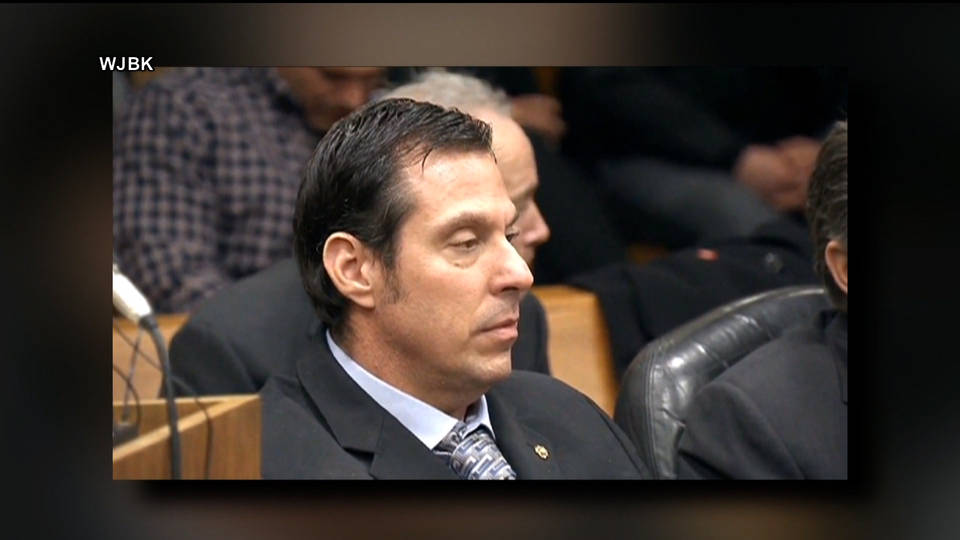
In other news from Michigan, a judge has sentenced former Inkster police officer William Melendez to at least 13 months and up to 10 years in prison for pummeling unarmed African American Floyd Dent in the head 16 times during a traffic stop last year. Melendez, nicknamed RoboCop, has been sued repeatedly for excessive force. Judge Vonda Evans spoke for nearly 30 minutes at Melendez’s sentencing Wednesday.
Judge Vonda Evans: "But the one image that struck [sic] out to the court was looking at Mr. Dent in his cell shaking his head in disbelief of what had occurred to him. If his conduct was indicative of what he was thinking, I would have thought this: What crime did I commit? Being a black man in a Cadillac, stopped for a minor traffic offense by a group of racist police officers looking to do a [N-word]."
State Dept. Finds Classified Emails in Accounts of Colin Powell, Rice Aides
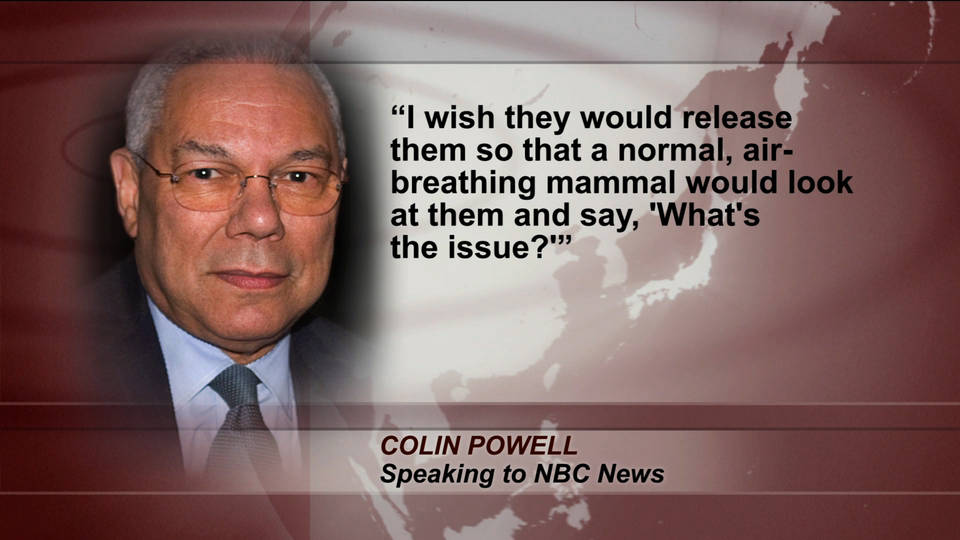
The State Department has found a dozen emails containing classified information sent to the personal email accounts of former Republican Secretary of State Colin Powell and top aides of his successor, Condoleezza Rice. Powell received two of the emails, while Rice’s aides received 10. Powell disputed the classification of the messages, telling NBC News, "I wish they would release them so that a normal, air-breathing mammal would look at them and say, ’What’s the issue?’" The review is part of the fallout over Hillary Clinton’s use of a private email server as secretary of state.
2 Cancer Patients Arrested Protesting Drug Provisions in TPP
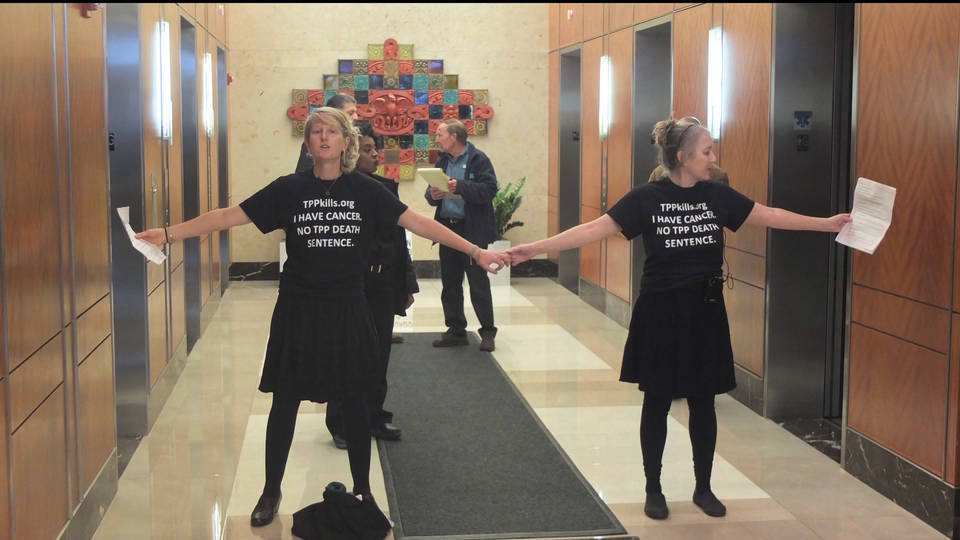
Protests against the Trans-Pacific Partnership trade deal continue after the 12-nation pact was signed Thursday in New Zealand. In Washington, D.C., two cancer patients were arrested after linking arms and refusing to leave the lobby of the building that houses PhRMA, the trade association that has pressed for expanded monopolies in the TPP. Zahara Heckscher spoke as she was arrested.
Zahara Heckscher: "I have advanced breast cancer, and I’m here to tell Congress, 'Reject the Trans-Pacific Partnership.' It hurts people with cancer. It would make cancer medicines even more expensive. We can’t afford the TPP. People with cancer can’t afford the TPP. It’s a life-and-death issue."
To see our interview with Zahara Heckscher, you can go to democracynow.org.
Martin Shkreli Refuses to Answer Lawmakers' Questions About 5,000% Drug Price Hike
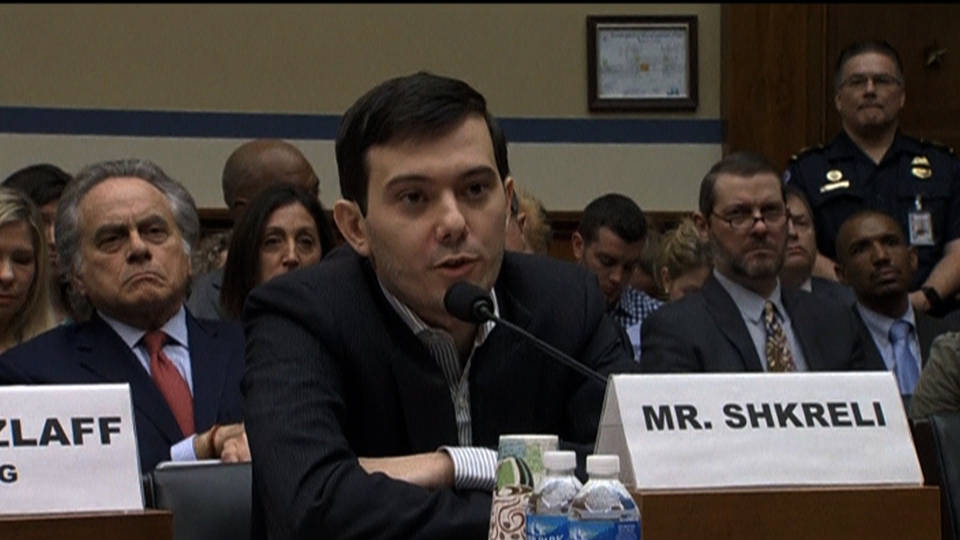
In other news from the pharmaceutical industry, the former hedge fund manager dubbed "the most hated man in America" after he hiked the price of a life-saving drug by more than 5,000 percent has refused to testify before Congress. Martin Shkreli founded Turing Pharmaceuticals, which purchased the drug Daraprim and boosted the price from $13.50 to $750. He was questioned Thursday by members of a House committee, including Utah Congressmember Jason Chaffetz.
Rep. Jason Chaffetz: "What do you say to that single pregnant woman who might have AIDS, no income, and she needs Daraprim in order to survive? What do you say to her when she has to make that choice? What do you say to her?"
Martin Shkreli: "On the advice of counsel, I invoke my Fifth Amendment privilege against self-incrimination and respectfully decline to answer your question."
After refusing to answer any questions, Martin Shkreli took to Twitter, writing, "Hard to accept that these imbeciles represent the people in our government." Shkreli is out on $5 million bail on unrelated charges of cheating hedge fund investors.
Anti-Choice Activist David Daleiden Turns Himself in, Rejects Plea Deal
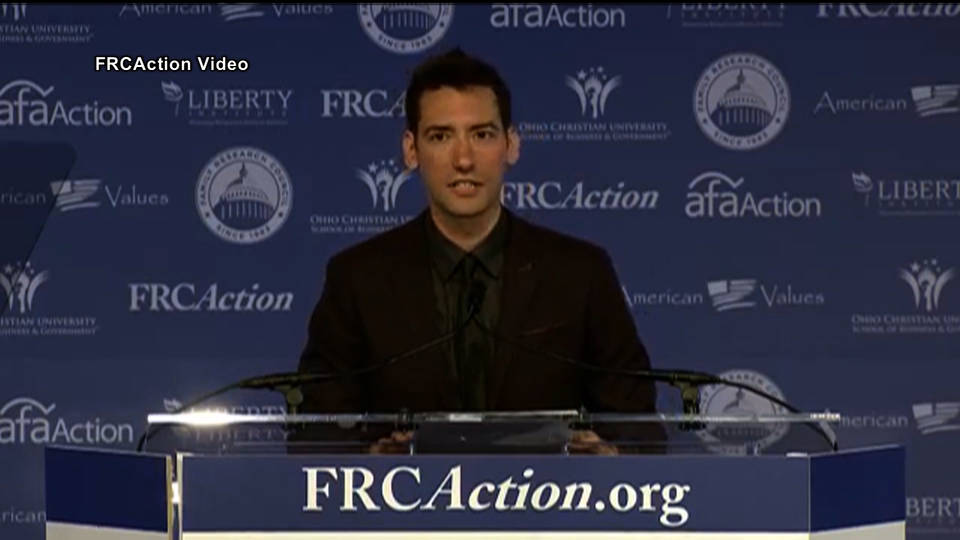
Two anti-choice activists behind the secretly filmed, heavily edited videos of Planned Parenthood officials have turned themselves in to authorities and posted bond. David Daleiden and Sandra Merritt were charged in connection with videos that were edited to accuse falsely Planned Parenthood of profiting off donations of fetal tissue. Last week, a grand jury in Texas tasked with investigating Planned Parenthood instead decided to indict the anti-choice activists. Daleiden’s attorney has said he will reject a proposed plea deal.
Harvard Medical School Students Deliver Petition Demanding Diversity
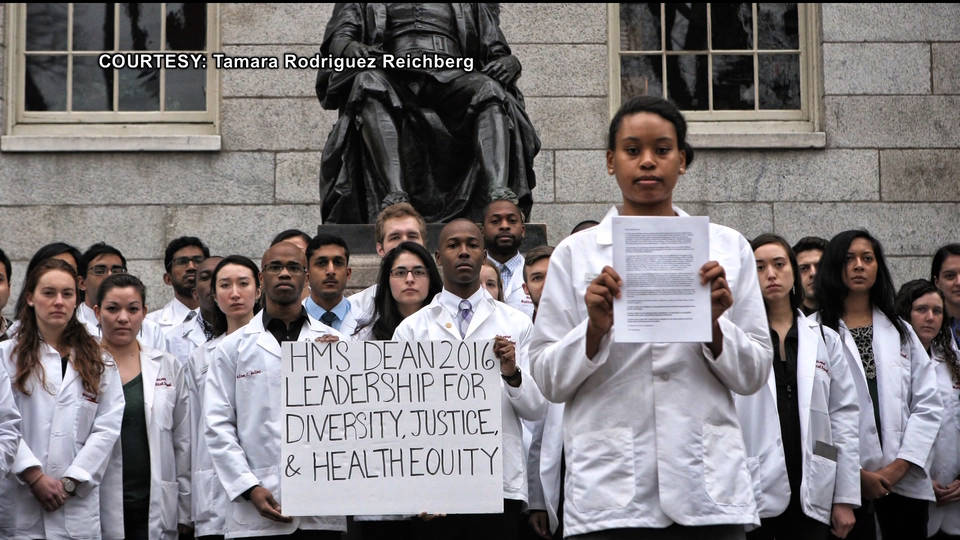
Harvard Medical School students have delivered a petition to their administration calling for more diversity, including a new dean with a commitment to social justce. Out of 165 students in Harvard Medical School’s current first-year class, only two identify as black women.
U.S. Deports Ángel Rosa, Undocumented Guatemalan Who Suffered Gangrene in Custody
And in an update to a story we’ve been following on Democracy Now!, an undocumented Guatemalan man who was recovering from a gangrene infection he contracted while in immigration custody has been deported. Ángel Rosa, father of four U.S.-born children, says he was kept in a cell with an overflowing toilet, prevented from showering and then placed in solitary confinement. He contracted a gangrene infection which caused his rectum to swell shut. Rosa was deported Wednesday, a day after advocates and attorneys filed a medical neglect complaint now under review by the Department of Homeland Security.

The Terror of Flint's Poisoned Water
WEB EXCLUSIVE

Pt 2: Michael Eric Dyson on The Black Presidency: Barack Obama and the Politics of Race in America
FEATURED TOPIC

Julian Assange
WEB EXCLUSIVE

Watch: Hillary Clinton Touts Progressive Record in Speech After Iowa Caucus---------------------
207 West 25th Street, 11th Floor
democracynow.org
Stories:

Scalia's Death Leaves Split Court to Decide Major Abortion, Labor, Voting Rights, Immigration Cases
With Saturday’s death of Justice Antonin Scalia, the most important conservative voice on the Supreme Court in decades, the nation may be heading into a constitutional crisis. Senate Republicans are vowing to block President Obama from filling Scalia’s seat. His death will also have an immediate impact on how the now eight-person court will rule in several key cases on the docket this term, including abortion, contraception, unions, voting rights, affirmative action, immigration and the status of Puerto Rico.
TRANSCRIPT
This is a rush transcript. Copy may not be in its final form.
JUAN GONZÁLEZ: With Saturday’s death of Justice Antonin Scalia, the most important conservative voice on the court in decades, the nation may be heading into a constitutional crisis. Senate Republicans are vowing to block President Obama from filling the Supreme Court seat left by Justice Scalia, who died on Saturday at the age of 79. The next justice could tilt the balance of the Supreme Court, which has been left with four conservative and four liberal justices. Obama, who has 11 months remaining in his term, said he will nominate someone to fill the empty seat after the Senate returns to session on February 22nd. But Republicans are claiming that since this is an election year, the next president should be the one to fill Scalia’s seat. According to a count by ThinkProgress, the Senate has confirmed 17 Supreme Court justices during an election year, most recently in 1988 when the Senate confirmed Anthony Kennedy.
For nearly 30 years, Scalia was the leading conservative voice on the bench. He was appointed by President Reagan and approved by a unanimous vote in the Senate. Joe Biden, who was chair of the Senate Judiciary Committee at the time, said later, quote "the vote that I most regret of all 15,000 votes I have cast as a senator" was "to confirm Judge Scalia"—"because he was so effective."
AMY GOODMAN: Antonin Scalia promoted the idea of "originalism," claiming the U.S. Constitution should be understood in the context of the 18th century era when it was written.
In 2003, he wrote the dissenting opinion in the case Lawrence v. Texas that struck down a Texas law that made gay sex a crime. Scalia wrote, quote, "Today’s opinion is the product of a court, which is the product of a law-profession culture, that has largely signed on to the so-called homosexual agenda," unquote.
In 2000, he voted with the majority in Bush v. Gore case to stop the recounting of ballots in Florida, securing the presidency for George W. Bush.
In 2010, he voted with the majority in the Citizens United case, opening the floodgates for unlimited corporate spending on election campaigns.
Three years later, in 2013, he joined the majority striking down parts of the Voting Rights Act of 1965 in the Shelby County v. Holder case.
And in the 2014 Hobby Lobby case, Scalia and the majority ruled, in a blow to women’s access to contraception, that private businesses can be exempted from certain laws on religious grounds.
JUAN GONZÁLEZ: The death of Antonin Scalia could also have an immediate impact on how the now eight-person court will rule in several key cases on the docket this term, including abortion, contraception, unions, voting rights, affirmative action, immigration and status issues relating to Puerto Rico.
To talk more about the death of Antonin Scalia, we’re joined by three guests.
Ian Millhiser is a senior fellow at the Center for American Progress Action Fund and the editor of ThinkProgress. He is the author of the book Injustices: The Supreme Court’s History of Comforting the Comfortable and Afflicting the Afflicted. His latest piece is headlined "The Simply Breathtaking Consequences of Justice Scalia’s Death."
Linda Hirshman is a lawyer and historian. She’s the author of Sisters in Law: How Sandra Day O’Connor and Ruth Bader Ginsburg Went to the Supreme Court and Changed the World.
And Scott Horton is a human rights attorney and contributing editor at Harper’s Magazine. He’s also a lecturer at Columbia Law School.
And, Scott, we’ll begin with you. Your reaction to the death of Scalia and what it means now in terms of what will happen at the Supreme Court?
SCOTT HORTON: Well, we could talk about the Roberts court, for instance, or the Rehnquist court before that, but to a certain extent, of course, this has been, for the last generation, the Scalia court. Scalia has been the brains behind movement conservatism within the judiciary. He chides his opponents for having a liberal political agenda, but it’s plain enough that he’s had a conservative political agenda, one which focuses on halting the wheels of time, essentially, standing athwart history and saying "stop." And he really is the first figure who’s developed a consistent jurisprudential philosophy to support that. So his role is extremely important, and his departure from the court immediately shifts the nature of the court.
AMY GOODMAN: Ian Millhiser, this piece you wrote, "The [Simply] Breathtaking Consequences of Justice Scalia’s Death." Justice Scalia died on a hunting trip in Marfa, Texas, on Saturday. Talk about the cases that he was most involved with, defined the court with, and what his absence will mean, beginning with now a four-to-four court and then what’s going to happen with the Senate, the Republicans threatening not to hold a hearing for a new Supreme Court justice.
IAN MILLHISER: Sure. I mean, I’ll offer some mild disagreement with what Scott just said, because Scalia hasn’t just spent his career halting the wheels of time, he’s in many cases tried to make them go in reverse. And this term was a term where there was a potential for a lot of regression to happen. There is a direct assault on public sector unions. There now won’t be five votes to let that case go forward, or in a way that will be harmful to those unions. There’s a big redistricting case that could have shifted power away from Latino communities and towards white communities. That case now won’t have five votes to get the result that the plaintiffs wanted. And then there’s two huge reproductive rights cases, where, at the very least, there won’t be five votes in order to shrink women’s rights in that respect.
The problem, though, is that when you have a four-to-four court, what happens in the lower courts winds up mattering a great deal, because the ordinary rule is that when the court evenly divides, the lower court’s order stands. There’s some chance that there will be some re-arguments in cases where they split, but even then, the lower court’s order is going to stand in the interim in most cases. And so you can wind up in this weird situation, and you probably are going to wind up in this situation with some of these cases, where the law in, say, Arkansas, where the court of appeals there shrunk women’s rights to access birth control, is going to be different in Pennsylvania, where those rights remain more robust.
JUAN GONZÁLEZ: Well, Ian Millhiser, specifically on that, just on the issue, for instance, of immigration, that could have a negative effect, because the lower courts basically have struck down—
IAN MILLHISER: Right.
JUAN GONZÁLEZ: —President Obama’s executive order granting temporary status to 5 million undocumented immigrants. So if the court was not able to rule on that, then those lower court decisions would stay in effect, right?
IAN MILLHISER: Yeah. I mean, there’s actually potential for some pretty unprecedented chaos there, because what happened in immigration case—you’re right—the lower court there was the very conservative Fifth Circuit, said that the program is illegal. But there’s really nothing preventing some other litigant, maybe even the government itself, from going to a more liberal circuit and getting an order saying that the program is legal. Normally when you have conflicting orders like that, what would happen is the Supreme Court would resolve it. But if the Supreme Court couldn’t resolve it, I do not know of a precedent for what happens when you have one circuit saying there’s a nationwide injunction blocking this program, another equal circuit says that the program is legal, and the Supreme Court can’t review it. It’s a recipe for chaos.
AMY GOODMAN: Linda Hirshman, you’ve written an interesting Washington Post piece, and you talk about the lower courts and what exactly they mean when cases are turned back in a four-to-four decision.
LINDA HIRSHMAN: Right. Just to pick up on what Ian was saying, if the court splits four to four, then the decision of the lower court stands. So, for example, in the question of whether religious institutions have to do the paperwork to let their female employees get access to contraception, the circuits are split, so that female employees of religious institutions in the circuit—the one circuit which said it was illegal to force the churches to do the paperwork, will not be able to get their contraception paid for, and the women living in all the other circuits will be able to get their contraception paid for.
So, what you have on the ground is—for example, the death penalty. I’m very interested in the death penalty matter, because Florida, which has a tremendous amount of executions, is in the liberal—is in the blue-dominated 11th Circuit, whereas Texas is in the red-dominated Fifth Circuit. So you could have people being killed by the state—otherwise known as the death penalty—in Florida, and, you know, just a few hundred miles away in Texas, have them being—I’m sorry, have them not being killed in Florida and have them being killed in Texas. This is truly a recipe for chaos.
As it happens, the states covered—most of the circuits are dominated by Democratic appointees. So most of the circuits are what I call blue. Of the 13 United States courts of appeals, nine are dominated by the Democrats and only four by the Republicans. So, two-thirds of Americans will be living in blue circuit America, while only one-third of Americans will be living in red circuit America. And their lives will be very different.
JUAN GONZÁLEZ: And, Linda Hirshman, what is the possibility of the court just deciding not to—to postpone decisions on several of these key cases that we’ve mentioned that are supposedly coming up for a decision in this term?
LINDA HIRSHMAN: So, this is something that the court has done. For example, when I was doing the research for my book on O’Connor and Ginsburg, I looked hard at Justice Powell, who sat with O’Connor for so long. And Powell was sick and was away for several weeks. And what the court did, without, of course, saying a word about what they were actually up to—what the court did was they took the cases where they knew or suspected that Powell would be the deciding fifth vote, and they put those off, waiting for him to come back. The difference is, now, that they have—the justices have no idea when there might ever be a ninth justice. So, if Mitch McConnell is true to his word, then it will be January of 2017 before there’s any possibility of a ninth justice. That’s 11 months away. So it’s hard for me to imagine that they would be putting cases off for 11 months.
AMY GOODMAN: Now, this is key, Ian Millhiser, this issue of putting this off. You have Justice Scalia, who was an originalist, a strict constitutionalist. I mean, it is very clear that the president chooses the next—
IAN MILLHISER: Right.
AMY GOODMAN: —Supreme Court justice—and, of course, has to be approved by the Senate. Wouldn’t it be a dereliction of duty—I mean, President Obama is in for almost another year—for him just not to name someone?
IAN MILLHISER: Well, it would certainly be a dereliction of duty for the president not to nominate someone. But what it—
AMY GOODMAN: Right, nominate and send into the Senate.
IAN MILLHISER: Right.
AMY GOODMAN: Or her.
IAN MILLHISER: What this really—this potential crisis highlights is just how political the court has become. I mean, you’re going to have this spectacle of potentially having a seat open for at least a year, and probably for more than a year, possibly for more than a year, because if a year from now we have President Clinton or President Sanders but we still have a Republican Senate, there’s no reason to think that Republican Senate is going to want Clinton or Sanders to fill that seat. We have a case where the Republican Party has decided to play constitutional hardball and fight as hard as they can to keep that seat open.
And there’s one other thing to bear in mind: There are three other justices on the court right now who are very elderly. So, in a few years, we could have four open seats. You could potentially still have a Democratic president and Republican Senate, and no possibility of filling those four seats. And when you go to the Supreme Court, it’s not even clear as a matter of law that they’re allowed to hold hearings if they only have five justices. But even assuming they are, you’re going to go there, and there’s going to be four vacant seats.
... Read More →
Stop Hate, Dump Trump: New Campaign Aims to Derail Presidential Bid Built on Racism & Xenophobia
A coalition of union presidents, activists, actors, professors and others have launched the "Stop Hate, Dump Trump" campaign "to end hatred, fear mongering, bullying, racism in America." We speak to movement co-founder Kimberlé Crenshaw.
TRANSCRIPT
This is a rush transcript. Copy may not be in its final form.
JUAN GONZÁLEZ: And, Kimberlé Crenshaw, I’d like to ask you, as Trump has dominated the Republican contest so far, you’ve been part of a group called Stop Hate, Dump Trump. Can you talk about his impact on the national discourse of these presidential—of this presidential race?
KIMBERLÉ CRENSHAW: Yes. Well, I think we’re seeing precisely the impact of Donald Trump on the coarsening of political discourse. You know, many people point out that in terms of policy, when we look at Cruz, for example, we’re not looking at dramatic distinctions in terms of some of the things that they’ve been advocating for. But our point is that Donald Trump is one of the only people to just actually come out and generate explicit racial stereotypes, with respect to immigrants, for example, and Muslims. And the impact, frankly, in this particular media culture, when the corporate media is dictated more by ratings than by any traditional role that journalism ought to play in a democracy, actually means that he’s encouraged to do more damage to our basic sensibilities. So we began this campaign basically to try to rein in the extent to which this kind of fear mongering with explicit appeals to the basest instincts in many Americans might be rolled back.
Now, having said that—and we still stand by Stop Hate, Dump Trump—it is fascinating how even a broken clock can be right twice a day. And so, in his conversation about the damaging war that we went into, based largely on fabricated information, is a fascinating development. And we are really interested to see whether this debate between the establishment and someone like Trump actually has any traction in the broader American debate.
JUAN GONZÁLEZ: And under your twice-a-day theory, there was a second theory that Trump said, is that he would—he understands why Obama would, should name the Supreme Court justice, and he would if he was president. Scott?
SCOTT HORTON: Well, exactly right, I think. He understands power and the aggressive use of power, which is something to be concerned about here. But I think, again, you know, it shows Trump’s tactical brilliance. He understands how unpopular the leadership of the Republican Party is, so he’s picked a couple of issues, which are the 9/11 issue, the fact that there were no weapons of mass destruction that were found in Iraq. He’s picked issues where he knows the leadership will line up in a circle to defend them, and they’re wrong, they’re untenable. And he will be alone on the stage taking that view. So, tactically, very, very smart play.
AMY GOODMAN: Also on the issue of trade deals, he stands with Bernie Sanders against these deals, and, coming late to it, Hillary Clinton.
SCOTT HORTON: The year of the insurrectionists.
AMY GOODMAN: You have covered, David Cay Johnston, Donald Trump for many years. We spoke to you early on. Now he has won the New Hampshire primary, moving on to South Carolina. What has surprised you? And especially on this issue of his wealth, saying that makes him independent, because—as he stresses all the time, he says, "I am rich," he says, "I am a billionaire"?
DAVID CAY JOHNSTON: Well, first of all, I’m not at all surprised that he’s doing so well. Before he formally announced, unlike almost every other national journalist, I said he is serious about this, and he might win the nomination. I also said I didn’t think he could be elected president, though I can see circumstances, like a terrorist attack in October, that might put him into the White House if he gets the nomination. If he does get the nomination, of course, I believe it will be the end of the Republican Party as we know it. The internal tensions of the party that are tearing at it, Trump is exploiting for his own benefit.
The thing I’m surprised about is that journalists have not been tough at all with Trump. My "21 Questions for Donald Trump," that I wrote at National Memo, nobody is asking the questions about Donald’s drug dealer helicopter pilot, about his dealings with the mob, about his failure to pay people for work that they’ve done for him, both vendors and employees. None of those things are being asked. And when Trump kept asserting, through his tiny staff, that he had a boiler room operations, multiple ones in New Hampshire, and he had people going door to door, the only place I saw anyone ask, "Well, show us these things," was on MSNBC. There may have been others, but clearly, journalists didn’t go and look at what I’m absolutely certain was a nonexistent ground game. And so I’m surprised that he’s not being held to a tough standard about backing up what he says about his campaign.
AMY GOODMAN: And, Professor Crenshaw, I mean, you’re an activist, but you don’t often take on a particular Republican presidential candidate within the primaries, but you have joined with Harry Belafonte, Eve Ensler, Kerry Washington, Noam Chomsky, Alice Walker, Jane Fonda, Lily Tomlin and others in this Stop Hate, Dump Trump campaign. Why him at this early stage?
KIMBERLÉ CRENSHAW: Well, I think precisely for the reasons we just heard. What was so disturbing is that the media have not asked him the tough questions. They have not taken seriously some of the most outrageous things that he’s said. Within days of saying that Muslims should not be allowed to enter the country, he was both on news shows and entertainment shows, and in that context, there was no interrogation whatsoever, so—well, at least no effective interrogation. It was like, "Oh, about that Muslim thing"—
AMY GOODMAN: Five seconds.
KIMBERLÉ CRENSHAW: —was something that Jimmy Fallon said. So, effectively, because he’s both an entertainer and a political figure, and because he generates massive ratings when he comes onto television shows—
AMY GOODMAN: We’re going to have to leave it there, Kimberlé Crenshaw, David Cay Johnston, Scott Horton.
... Read More →
Who is on President Obama's Shortlist to Replace Antonin Scalia?
Nearly 30 years ago, Antonin Scalia was approved by the Senate in a unanimous vote. Analysts are projecting a much tougher road for the next nominee. We look at four potential nominees: California Attorney General Kamala Harris, D.C. Circuit Judge Sri Srinivasan, Ninth Circuit Judge Paul Watford and Eighth Circuit Judge Jane Kelly.
TRANSCRIPT
This is a rush transcript. Copy may not be in its final form.
JUAN GONZÁLEZ: And, Scott Horton, what about this issue of the—what happens from here on in, and also the choices that President Obama has? Does he name a more moderate justice and then really make it difficult for the Republicans to continue to block a nomination, or does he attempt to go to a more liberal justice and really sharpen, in the upcoming election, the choices that voters have when they’re electing a president?
SCOTT HORTON: Well, you know, to me, the political elements here have never been sharper for the Supreme Court. So I think we’re going to see this whole issue of the Supreme Court front and center in the election campaign for the new president. It’s always there in the final rounds of the election; we usually have candidate saying, "Who is selected now as president will determine the makeup of the Supreme Court." And now we’re in the position where that literally is going to be true. So it will be central.
As for Obama’s options, it seems to me he’s going to be—he’s going to play a tactical game at this point, knowing what the position is of the Republican majority and their leader. And it seems to me the Republicans have put themselves in a position in which they’re going to be subject to ridicule based on their own conduct. I think it’s likely that Obama will put forward a nomination of a moderate with outstanding credentials, and probably someone who has recently been approved by the same Republican Senate by a strong vote, and watch them cope with that, because I think if their—if their tactic is simply to block, that’s not going to help them in the presidential election.
JUAN GONZÁLEZ: And what would be some of those—who would be some of those potential folks that he might name?
SCOTT HORTON: Well, Sri Srinivasan, I think, is the most commonly cited figure right now, but I think we’ve got a group, principally, of court of appeals judges who were approved over his two terms as president, who have gotten substantial support, including support from Republicans. There are a half-dozen of them in the holding pen right now. Any of them may be put forward. But I doubt it’s going to be the left equivalent of a Nino Scalia. It’s going to be someone who is more of a moderate, more of a centrist, someone who in normal times would be able to count on Republican support.
AMY GOODMAN: Ian Millhiser, can you talk more about Sri Srinivasan, who he is and his significance?
IAN MILLHISER: Sure. I mean, Sri is—I’ve seen him argue cases before. He’s one of the most brilliant litigators of his generation, truly breathtaking intellect. He also, though, clerked for two Republican judges—for a Republican court of appeals judge and then for Sandra Day O’Connor on the Supreme Court. He spent many years of his careers at a major corporate law firm. So he’s very much perceived as a sort of middle-of-the-road moderate, the sort of candidate a Democrat would put up if they wanted to extend an olive branch and say, "Look, like, I’m going to meet you halfway here by picking someone who wouldn’t necessarily be a Democrat’s first choice, but someone who everyone agrees is an extraordinary intellect," someone who was confirmed 97 to zero the first—when he was confirmed to his current job on the second-highest court on the land. And so I think Sri is going to be attractive to the White House.
There’s a—you know, there are some other candidates—Paul Watford on the Ninth Circuit—
AMY GOODMAN: Just on Sri Srinivasan, he would be the first Indian American. He’s young, he’s 48 years old.
IAN MILLHISER: Yeah.
AMY GOODMAN: Labor unions were not thrilled when he went up to this court, not feeling that his history of representing corporate clients would bode well for them.
IAN MILLHISER: Yeah, that’s right. I mean, what you’re looking at with Sri—and, you know, again, the fact that he had certain kinds of clients as a lawyer doesn’t necessarily predict how he’s going to act as a judge or a justice. But everything we know about him now tells us brilliance and centrism.
AMY GOODMAN: Can you talk about Paul Watford?
IAN MILLHISER: Sure. Judge Watford is a judge on the Ninth Circuit. He has a similar résumé to Sri. He worked at a corporate law firm for many years. Unlike Sri, Judge Watford is—was a clerk for Justice Ginsburg. So he has a similar profile of someone who’s been at the top of the profession since the beginning of his career, a great intellect, someone who shouldn’t be perceived as a bomb thrower and should be perceived as more of an olive branch, because he spent most of his career not doing anything that’s really associated with liberalism, just, you know, going out there and making money as a lawyer. So, you know, if it’s Watford, if it’s Srinivasan, if it’s either of those judges, under normal circumstances, that would be an olive branch to the Republicans.
AMY GOODMAN: And, Linda Hirshman, can you talk about Kamala Harris, attorney general of California, running for Senate—
LINDA HIRSHMAN: Right.
AMY GOODMAN: —to fill Barbara Boxer’s seat?
LINDA HIRSHMAN: Right. She would be my selection, if she’s—you know, if she passes the vetting process, because I would just love to see the next several months occupied with a bunch of old white male Republicans pounding on the first Asian-American, African-American attorney—female attorney general of the state of California.
But I think that it’s mostly about the optics. As I listen to my colleagues just now discussing the pros and cons of the olive branch possibilities and so forth, I think that none of this really matters at all, because the Republicans, as far as I’ve been able to observe, do not care about the universe of perfect logic. And the fact that Srinivasan was confirmed 97 to nothing just recently is an argument which reasonable people would make, but I don’t think it matters. I think that this is about power and optics. And if you are going to be realistic about what’s going to happen, then you have to think about who would make the most optically advantageous appointment. And I think Kamala Harris would be very high on my list of people who would do that.
JUAN GONZÁLEZ: Another—
LINDA HIRSHMAN: That being said—
JUAN GONZÁLEZ: I’m sorry. Another person who’s been mentioned is Jane Kelly from the Eighth Circuit Court of Appeals. Could you talk about her?
LINDA HIRSHMAN: I would be—I would be inclined more in the direction of an African-American woman like Kamala Harris. I don’t—I don’t think that it’s about the woman thing right now.
AMY GOODMAN: Because?
LINDA HIRSHMAN: Because I think that getting African Americans to go to the polls in sufficient numbers to elect a Democrat president of the United States is the critical political issue right now. Obama’s numbers from 2008 to 2012 went down among Hispanics and whites. And only a robust African-American vote was effective in 2012. So I’m thinking politically about this. The Republicans are looking at their red states. Arizona, for example, where I live in the winter, will be in the very liberal Ninth Circuit. They’re looking at their constituents living under the governance of very liberal blue circuits. And they are looking at a—I want them to look at the most attractive, politically attractive, possible nominee.
JUAN GONZÁLEZ: I wanted to ask Scott Horton, with the current split in the court—we’ve got all these big cases coming up this term, have to be decided by June—what is your sense of what the fallout will be on some of these cases, if any, that the court may go ahead with?
SCOTT HORTON: Well, I think labor unions can breathe a huge sigh of relief right now, because they were probably looking at a really powerful adverse ruling on the union dues issue coming in one major case. And one fundamental rule here is, it doesn’t matter how the justices voted in conference or the discussions that went on; the vote that’s taken has got to be the vote as it existed at the time the ruling is handed down. So, nothing that’s happened up to this point matters. We’re dealing with an eight-member court on all of these rulings.
But I think, coming back to what was—what Ian said at the beginning, we’re looking at a court that is likely simply to uphold the rulings below. So, in cases where—as in the immigration rights case and the voting rights cases coming out of Texas, where there is a conservative ruling from a conservative court of appeals, that’s likely to be sustained still, I think, and where it was a more progressive ruling, that will be upheld.
AMY GOODMAN: Ian Millhiser, before we go to break, if you could talk about what Justice Scalia is known for, whether we’re talking about his support for gun rights, his opposition to same-sex marriage and LGBTQ rights, whether we’re talking about abortion, talk about his history, this history of—
IAN MILLHISER: Sure.
AMY GOODMAN: —a man who was appointed by Ronald Reagan.
IAN MILLHISER: Sure. I mean, I think that Justice Scalia is a very tragic figure. I mean, if you read a lot of his scholarship, he would articulate a theory of judicial restraint that I think is admirable, this notion that we should be cautious about courts getting too involved in our lives and that we are a democracy and democracy should rule. As a scholar, I think he made very interesting arguments. But as a judge, he often lacked the character or the self-control to live up to the arguments he made as a scholar.
So, you know, the two most—the two most striking examples of this are the two Obamacare cases, where in the first one he wrote a—or he joined a vicious dissent to his own opinion in another case called Raich, and then, in the second one, he attacked his own theory of judicial—of statutory interpretation that he laid out in a 2012 book. So, he was a great scholar. I think—I wish that he’d been able to live up to his own ideals. But unfortunately, all too often, I think he let ideology and partisanship get in the way of some of the more idealistic notions that he articulated as a scholar.
JUAN GONZÁLEZ: And, Scott, I’d like to ask you about the irony of Scalia being a proponent of originalism, of faithfulness to the letter of the Constitution, and yet now the Republican majority saying, well, the president should not really exercise the powers that the Constitution gives him to name the next Supreme Court justice.
SCOTT HORTON: Well, I think it is highly ironic. I mean, you know, this was a politically driven conservatism. And I think Scalia’s conservatism is unlike what we’ve seen through most of American history. He’s sort of a southern European throne-and-altar type of conservative and not the sort of more progressive conservative that embraces some liberal values we’ve seen through most of American history. And he came up with a formula that would sustain that, which was to try and freeze the country in time constitutionally at 1789, which was a framework that gave him more ballast for his arguments, but certainly didn’t help him win every case.
But I think, you know, his zeal—he undermined himself with his own zeal over and over again, you know, especially in the last few years. He would attack the majority on case after case, saying X, Y, Z is consequence of their opinion, and you’ll see—and, of course, that comment was then used by district courts to sustain a more radical interpretation of the majority’s opinion, and that hastened things along, like marriage equality.
AMY GOODMAN: We’re going to break, then come back to this discussion. I want to thank Ian Millhiser for joining us, editor of ThinkProgress Justice, author of Injustices. Linda Hirshman is staying with us, author of Sisters in Law, a very interesting book about Sandra Day O’Connor and Ruth Bader Ginsburg; the subtitle, How Sandra Day O’Connor and Ruth Bader Ginsburg Went to the Supreme Court and Changed the World. And we’re joined by Scott Horton, human rights attorney and lecturer at Columbia Law School. Kimberlé Crenshaw will now be joining us, as well, from UCLA in California. This is Democracy Now! We’re talking about the death of Justice Scalia and what happens next. Stay with us.
[break]
AMY GOODMAN: With Saturday’s death of Justice Antonin Scalia, the most important conservative voice on the court in decades, the nation may be heading into a constitutional crisis, Senate Republicans vowing to block President Obama from filling Justice Scalia’s seat. We’re joined by three guests. Linda Hirshman is still with us from Phoenix, Arizona, lawyer and historian, author of Sisters in Law: How Sandra Day O’Connor and Ruth Bader Ginsburg Went to the Supreme Court and Changed the World. We’re joined here in New York by Scott Horton, human rights attorney and contributing editor at Harper’s Magazine, a lecturer at Columbia Law School. In a moment, we’ll be joined by Kimberlé Crenshaw, professor of law at UCLA and Columbia University. We’re going to turn, though, to Scott Horton.
JUAN GONZÁLEZ: Scott, I wanted to ask you about Scalia’s last decision, which was on a clean power case last Tuesday. He was the decisive vote on that, as well. Could you talk about that?
SCOTT HORTON: Well, I think it’s clear right now that that injunction that was issued by the Supreme Court would not have been—wouldn’t be issued today. His vote was essential to get it over the hump. And that was a radical move. There is really no precedent for the Supreme Court issuing an injunction staying pending argument in the Supreme Court regulations of general applicability of this sort.
AMY GOODMAN: But just to be clear, this was—struck down regulations of coal-powered plants, which was really the centerpiece of what—on the U.S. position at the U.N. climate summit in Paris.
SCOTT HORTON: Precisely. And, in fact, I think this decision got more attention overseas than it got in the United States, because we saw a number of European nations focused on the fact that it looked like the Supreme Court was going to block United States’ implementation of the Paris Accords, because these regulations were right at the core of it. And now there clearly is not the majority within the Supreme Court in support of that injunction. But we’re going to have to see—either there will have to be a motion for rehearing of the matter by the solicitor general, or we’ll have to await the final decision. But it’s no longer as clear that the situation is ominous for Barack Obama on these regulations.
... Read More →
Kimberlé Crenshaw: Scalia "Bludgeoned" the Constitution That Gave Us Desegregation, Women's Rights
We talk about the legacy of Supreme Court Justice Antonin Scalia, the leading conservative voice on the Supreme Court for decades. "What’s not really being said as much as it should be is just how devastating his legacy is," says Kimberlé Crenshaw, law professor at UCLA and Columbia University. "Justice Scalia was a person who effectively bludgeoned the life out of the living Constitution, the Constitution that gave us desegregation, that gave us women’s rights, that gave us environmental protections and political access."
TRANSCRIPT
This is a rush transcript. Copy may not be in its final form.
AMY GOODMAN: Well, let’s turn to Kimberlé Crenshaw, who is just joining us from Santa Ana, California, a professor of law at UCLA and Columbia University. The significance of the death of Justice Scalia?
KIMBERLÉ CRENSHAW: Well, Amy, I think this is probably the most significant thing to happen on the Supreme Court at least in the last three decades, since he was actually appointed. But I really think the challenge in the way we talk about it is being able to make it clear that while Justice Scalia was enormously influential—and some will even say he was an interesting person—what’s not really being said as much as it should be is just how devastating his legacy is.
What many people, I think, don’t really understand is how much their rights really turn on the interpretation of the Supreme Court. And in that context, Justice Scalia was a person who effectively bludgeoned the life out of the living Constitution, the Constitution that gave us desegregation, that gave us women’s rights, that gave us environmental protections and political access. So, when we think and talk about his influence, we have to think about it and talk about it in ways that give people a strong sense of how significant his judgments were and what this moment presents an opportunity to do, which, frankly, is to recover or reclaim some of what made the Constitution so powerful as a source for equal rights.
JUAN GONZÁLEZ: And, Kimberlé Crenshaw, we’ve asked the other guests, but I’d like to ask you also, your sense of what this means in terms of the possibility that we now face a potential gridlock in the Supreme Court, similar to the gridlock we have in Congress in terms of being able to get things done as a result of partisanship?
KIMBERLÉ CRENSHAW: Well, I agree with all the other guests that what we’re looking at, if Mitch McConnell is able to really stand firm on his claim that they will delay, delay, delay, there will be chaos. And within that chaos there will be some victories that might not have happened, as always, you know, is the case when you have the Supreme Court in the position of merely affirming some of the decisions below.
But I really think that the more fundamental opportunity that this presents is to really point out that the originalist claim is truly an ideological one that is more directed to particular outcomes rather than any coherent position. I mean, the founding fathers would be appalled by the claims of Mitch McConnell and many of the Republicans that the president doesn’t have a role to play in nominating a replacement and the Senate can just choose to delay because they don’t like the potential ideological direction that this nomination might represent. I think it’s important for the American people to know that the position of originalism isn’t itself an originalist position. And this is the opportunity to understand that and see what difference it makes in how we go about thinking about the Supreme Court.
AMY GOODMAN: I mean, isn’t it true that probably they understand that President Obama is going to nominate someone? I mean, in the last cases where there’s been the announcement of someone retiring, he has announced a name within 30 days. So, it’s pretty clear he’s going to move forward. But what this does, this kind of pressure does, is it pushes him to name a more conservative candidate for the Supreme Court. And I wanted to ask Linda Hirshman about one of the cases that’s coming up very soon, on March 3rd, the case of Whole Woman’s Health—on March 2nd, the case of Whole Woman’s Health in Texas. This is a case of abortion. Can you explain the significance of this case and what this Scalia-less court will do?
LINDA HIRSHMAN: So, the Whole Woman’s Health case involves a very onerous law in Texas which requires abortion clinics to have affiliations with hospitals that they simply can’t get and would mostly drive most of the abortion clinics out of Texas, creating an abortion-free zone in Texas. The lower court is the red or conservative Fifth Circuit. So they had said that the law was good. And there was some betting about whether the Supreme Court would break five to four, with Kennedy switching to the liberals to strike down the Texas law. So, the question now is, essentially, again on Kennedy. If Kennedy switches to the liberals, then the law will be struck down five to three. If Kennedy stays with the conservatives, then the court will, exactly as we’ve been—
AMY GOODMAN: We just lost Linda Hirshman; we lost the satellite in Phoenix, Arizona. She is the lawyer and historian, author of Sisters in Law: How Sandra Day O’Connor and Ruth Bader Ginsburg Went to the Supreme Court and Changed the World. Can you finish her thought, Scott Horton?
SCOTT HORTON: Well, the alternative is that there is an even split, four to four, and the ruling of the Fifth Circuit stands. And that accentuates, again, the likely evolution of a divided country by judicial districts. The more liberal, the blue courts of appeals will probably strike down efforts to undermine abortion rights, whereas the red courts of appeals will sustain them.
AMY GOODMAN: Well, we’re going to switch gears. We’re going to break, and when we come back, we’re going to talk about the latest Republican debate. Now, Justice Antonin Scalia had just died. There was a lot of discussion about him. And there was a lot of a debate around, for example, Donald Trump attacking Jeb Bush around George Bush’s going into the war in Iraq, saying that George W. Bush lied. We’re going to stay with our guests and talk about that debate in a moment.
... Read More →
"The War in Iraq was a Big, Fat Mistake": Trump & Bush Spar over War & 9/11
At Saturday’s Republican debate in Greenville, South Carolina, Donald Trump and Jeb Bush had a tense exchange over former President George W. Bush’s record in Iraq. "Obviously, the war in Iraq was a big, fat mistake," Trump said. "George Bush made a mistake. We can make mistakes. But that one was a beauty. We should have never been in Iraq. We have destabilized the Middle East." Jeb Bush responded: "I am sick and tired of him going after my family. … And while Donald Trump was building a reality TV show, my brother was building a security apparatus to keep us safe. And I’m proud of what he did."
TRANSCRIPT
This is a rush transcript. Copy may not be in its final form.
JUAN GONZÁLEZ: We turn now to Saturday night’s Republican debate in Greenville, South Carolina. It was the ninth Republican debate of the election cycle. Donald Trump and Jeb Bush had a tense exchange over George Bush’s record in Iraq.
DONALD TRUMP: Obviously, the war in Iraq was a big, fat mistake. All right? Now, you can take it anywhere you want. It took Jeb—it took Jeb Bush, if you remember, at the beginning of his announcement, when he announced for president, took him five days. He went back. It was a mistake, it wasn’t a mistake. Took him five days before his people told him what to say. And he ultimately said it was a mistake. The war in Iraq, we spent $2 trillion, thousands of lives. We don’t even have it. Iran is taking over Iraq, with the second-largest oil reserves in the world. Obviously, it was a mistake.
JOHN DICKERSON: So—
DONALD TRUMP: George Bush made a mistake. We can make mistakes, but that one was a beauty. We should have never been in Iraq. We have destabilized the Middle East.
JEB BUSH: I’m sick and tired of Barack Obama blaming my brother for all of the problems that he’s had. And frankly, I could—I could care less about the insults that Donald Trump gives to me. It’s bloodsport for him. He enjoys it, and I’m glad he’s happy about it. But I am sick and tired—
DONALD TRUMP: He spent $22 million in ads against me.
JEB BUSH: I am sick and tired of him going after my family. My dad is the greatest man alive, in my mind. And while—while Donald Trump was building a reality TV show, my brother was building a security apparatus to keep us safe. And I’m proud of what he did. And he’s had the gall to go after my mother.
DONALD TRUMP: The World Trade Center came down during your brother’s reign. Remember that.
JEB BUSH: He’s had the gall to go after my mother.
AMY GOODMAN: That was Jeb Bush and Donald Trump going at it in the Greenville, South Carolina, Republican presidential primary debate. Senator Marco Rubio and Donald Trump also debated George W. Bush’s record on 9/11.
SEN. MARCO RUBIO: I just want to say, at least on behalf of me and my family, I thank God, all the time, that it was George W. Bush in the White House on 9/11, and not Al Gore.
DONALD TRUMP: How did he keep us safe, when the World Trade Center [inaudible]? The World—excuse me, I lost hundreds of friends. The World Trade Center came down during the reign of George Bush. He kept us safe? That’s not safe. That is not safe, Marco.
JOHN DICKERSON: All right. Marco?
DONALD TRUMP: That is not safe.
SEN. MARCO RUBIO: The World Trade Center came down because Bill Clinton didn’t kill Osama bin Laden when he had the chance to kill him.
AMY GOODMAN: That was Marco Rubio, Florida senator, presidential candidate.
We’re joined now by three guests: David Cay Johnston, Pulitzer Prize-winning investigative reporter, previously with The New York Times, currently a USA Today columnist and Syracuse Law lecturer, his latest book, Divided: The Perils of Our Growing Inequality; still with us, Professor Kimberlé Crenshaw of UCLA and Columbia University; and Scott Horton, human rights attorney, contributing editor at Harper’s Magazine, lectures at Columbia.
Well, why don’t we begin with David Cay Johnston? Your thoughts on this debate and Donald Trump really going at Jeb Bush on the issue of his brother, George W. Bush, saying he lied to get into the war in Iraq?
DAVID CAY JOHNSTON: Well, I think this was a very carefully picked audience that does not want to address the fundamental facts here. The Republicans have worked very hard to make it sound like George Bush didn’t mess up, when we were attacked, after he had been warned. And we recall George Bush later said, "What was I supposed to do?" because he had not a clue about what to do. So I think that what you were hearing from that crowd was attacking Trump for taking down one of the big myths, one of the big lies, that’s been sold among Republicans. And the notion that a President Donald Trump would respect the Constitution, I think we should wonder about—notice his use of the word George Bush’s "reign." Presidents don’t reign.
JUAN GONZÁLEZ: And, David Cay Johnston, I’d like to ask you about the debates in general. Your sense of how these Republican candidates have dealt with the economic issues that you’ve written so much about?
DAVID CAY JOHNSTON: I feel like my children, when I had children at home squabbling over a broken toy. There’s no substance to them. And all you have to do is compare the last Democratic debate, where you had Hillary Clinton and Bernie Sanders talking about real issues—not as carefully as I’d like, because we don’t pick the moderators based on interviewing skills, we pick them for entertainment value, but talking about real issues. And when you watch the Republicans, by and large, it’s like a bunch of children squabbling over a toy or who hit Willie, a lot of personality. The Republicans have allowed themselves, the other candidates, to be baited by Donald Trump into personality matters and areas that add to his strength. So, it’s very good, I think, that we’re now seeing some audiences—this one in Greenville, South Carolina—push back with Trump; unfortunately, it was about things Trump said that actually have merit.
... Read More →Antonin Scalia, Top Conservative Supreme Court Justice for 30 Years, Dies at 79

Supreme Court Justice Antonin Scalia has died at the age of 79. For nearly 30 years, Scalia was the leading conservative voice on the bench, known, among other things, for his opposition to the Voting Rights Act and gay rights and his support for gun rights. He died Saturday at a hunting resort in West Texas. President Obama, who has 11 months remaining in his term, said he will nominate someone to fill the empty seat.
President Barack Obama: "I plan to fulfill my constitutional responsibilities to nominate a successor in due time. There will be plenty of time for me to do so and for the Senate to fulfill its responsibility to give that person a fair hearing and a timely vote. These are responsibilities that I take seriously, as should everyone. They’re bigger than any one party. They are about our democracy."
Senate Republicans are vowing to block President Obama from filling Scalia’s Supreme Court seat. The next justice could tilt the balance of the Supreme Court, which has been left with four conservatives and four liberals. The vacancy could have an immediate impact on how the now eight-person court will rule in several key cases, including a major abortion case just two weeks away. We’ll have more on the impact of Scalia’s death after headlines.
TOPICS:
Supreme Court
Afghanistan: Record 11,000 Civilians Killed or Injured Last Year

In Afghanistan, the number of civilians killed or injured has risen to a record high for the seventh year in a row. The United Nations says more than 3,500 civilians were killed and more than 7,400 wounded last year, an increase of 4 percent over the year before. Danielle Bell, director of the U.N. human rights program, outlined the findings.
Danielle Bell: "The overall 4 percent increase resulted mainly from a rise in suicide and complex attacks carried out in Kabul city, as well as the Taliban offensive in Kunduz last year. In most parts of Afghanistan in 2015, civilian casualties decreased. Of the 11,002 civilian casualties, one in 10 was a woman, and one in four was a child. Women casualties increased by 37 percent, while child casualties increased by 14 percent."
The report came as Taliban suicide bombers using Humvees captured from the Afghan army attacked a checkpoint in Helmand province, killing six members of the security forces.
TOPICS:
Afghanistan
Syria: Airstrikes Hit 2 Hospitals; Saudi Arabia Sends Warplanes to Turkey

In Syria, airstrikes have hit two separate hospitals. Doctors Without Borders says at least seven people were killed and eight staff are missing after a facility it supports in Idlib province was repeatedly bombed. Separately, a missile reportedly hit a children’s hospital in the rebel-held town of Azaz, killing 10 people and wounding more than 30. Both Russia and the Syrian government are conducting strikes in the area. Meanwhile, Saudi Arabia has deployed warplanes to an airbase in Turkey and repeated its offer to send ground troops into Syria for the fight against ISIL. Meanwhile, up to 40,000 refugees fleeing violence have settled in camps along the Turkish border inside Syria.
TOPICS:
Syria
Saudi Arabia
U.N. Tally: Over 80,000 Refugees Arrive in Europe in First 6 Weeks of 2016

A new tally from the United Nations finds more than 80,000 refugees and migrants have arrived in Europe by boat so far this year alone. More people arrived in the first six weeks of this year than the first four months of last year. Melissa Fleming, spokesperson for the U.N. high commissioner for human rights, said more than 400 have died trying to cross.
Melissa Fleming: "Also to note, we continue to say this is a refugee crisis because, according to our profiling and the statistics we receive from the Greek government, over 91 percent of those arriving in Greece come from the world’s 10 top refugee-producing countries, and the top nationalities are coming from Syria, Afghanistan and Iraq."
TOPICS:
Refugees
Report: Saudis Using Banned, U.S.-Made Cluster Bombs in Yemen

Saudi Arabia’s offer to send ground troops into Syria comes as the U.S. ally faces closer scrutiny over its bombing campaign in Yemen. On Saturday night, a Saudi-led airstrike hit a sewing factory and electronics warehouse in the Yemeni capital Sana’a, reportedly killing 18 people, including a 13-year-old boy. Human Rights Watch has released new evidence the U.S.-backed, Saudi-led coalition is using internationally banned cluster munitions supplied by the United States. Cluster bombs are designed to fan out over a wide area, and their submunitions often fail to explode, posing a massive risk to civilians.
TOPICS:
Yemen
Saudi Arabia
Bahrain: 4 U.S. Journalists Arrested Amid Protests on 5th Anniversary of Uprising

The Associated Press is reporting four American journalists have been arrested in Bahrain while covering protests surrounding the fifth anniversary of the Gulf nation’s pro-democracy uprising. The 2011 protests by Bahrain’s Shiite majority against the Sunni-led monarchy were among the largest seen during the Arab Spring, but they were crushed with the help of Saudi Arabia and the United Arab Emirates. Bahrain is a close U.S. ally, home to the Navy’s Fifth Fleet.
TOPICS:
Bahrain
Pope Francis Takes Aim at Drug Cartels, Corruption in Mexico Visit

Pope Francis took aim at drug cartels and Mexico’s corrupt elite during a visit to one of the cities most impacted by the U.S.-backed drug war. North of Mexico City, Ecatepec has one of the highest murder rates in Mexico and is particularly known for the unsolved murders of scores of women. Montserrat Correa, a student from the city, was among those who watched the pope’s mass.
Montserrat Correa: "There is a high level of crime, so many assassinations. The dangers we live with daily, as women, it’s very difficult in this country, in this state. Anywhere, we fear that something will happen to us. And our families are always worried that something could happen to us and we won’t return home."
Before heading to Mexico, the pope stopped in Havana, Cuba, where he held a historic meeting with Russian Orthodox Patriarch Kirill. It was the first meeting between a pope and the head of the Russian church since the two branches of Christianity split in the 11th century.
TOPICS:
Pope Francis
Mexico
U.S., Cuba to Seal Deal Allowing Commercial Flights
Meanwhile, in other news of healing ties, Cuba and the United States are expected to seal an agreement this week to resume scheduled commercial flights between the two countries for the first time in more than 50 years.
TOPICS:
Cuba
Israeli Authorities Kill 5 Palestinians, Wound 6th After Alleged Attacks

Israeli authorities killed five Palestinians and critically wounded a sixth Sunday, accusing them all of attempted attacks in the Israeli-occupied West Bank and Jerusalem. No Israelis were injured in any of the incidents. Authorities said they killed two Palestinians who shot at Israeli forces with automatic weapons. In a separate incident, soldiers killed two 15-year-olds they accused of throwing rocks and then opening fire. And in two other incidents, Israeli officers shot Palestinians accused of wielding knives, killing a 17-year-old and wounding a 21-year-old woman.
TOPICS:
Israel & Palestine
Haitian Lawmakers Choose Former Aristide Minister as Interim President

Haitian lawmakers have chosen an opposition senator to serve as interim president for 120 days after disputed elections left the country without a president. Former Parliament head Jocelerme Privert served as interior minister under former President Jean-Bertrand Aristide, who was ousted in 2004 in a U.S.-backed coup.
TOPICS:
Haiti
Haitian Democracy Activist Patrick Elie Dies at 66

And in other news from Haiti, Patrick Elie, longtime pro-democracy activist and Haiti’s former secretary of state for public security under Aristide, has died at the age of 66. In 2011, he spoke to Democracy Now! from Port-au-Prince on the first anniversary of the devastating earthquake.
Patrick Elie: "So, it’s going to take time, but I do believe that the earthquake is also a signal for us to build Haitian democracy on sound foundations, which means the neighborhood committees, the grassroot organization, instead of trying to build a democracy from the top down. That’s how we built our houses in Port-au-Prince, and you saw what happened."
Patrick Elie died of internal bleeding at a hospital in Port-au-Prince on Friday. He was 66.
Follow:

Beyoncé's Super Bowl Touchdown for Black Lives Matter
SPEAKING EVENTS

2/15 New York, NY
2/22 Columbus, OH
WORK WITH DN!

Broadcast Engineer
Director of Finance and Operations
Director of Development---------------------
Democracy Now! Daily Digest: A Daily Independent Global News Hour with Amy Goodman & Juan González for Friday, February 12, 2016
democracynow.org
Stories:

War on Wall Street or Wall Street's Wars? Clinton and Sanders Debate in Wisconsin
Democratic presidential candidates Vermont Senator Bernie Sanders and former Secretary of State Hillary Clinton faced off Thursday night in the first Democratic debate since Sanders’ decisive victory over Clinton in Tuesday’s New Hampshire primary and drew sharp distinctions between each other on everything from foreign policy to how they plan to pay for the programs they’ve proposed, to campaign finance reform. Our two guests respond. Reacting to Clinton’s claim she helped negotiate a ceasefire in Syria, Jeffrey Sachs argues, "She has backed a CIA-led attempt at regime change that has led to a bloodbath there." Sachs is a leading economist and the director of The Earth Institute at Columbia University, whose recent article for The Huffington Post is headlined "Hillary is the Candidate of the War Machine." He adds that, domestically, Clinton "is basically saying the status quo is just fine." But New York Congressmember Gregory Meeks, chair of the Congressional Black Caucus political action committee, which has just endorsed Hillary Clinton, says Sanders has promised change that he will be unable to deliver. "If you’re running on just a dream, and not how you can do something in reality, then I think that is misleading the American people," Meeks says.
TRANSCRIPT
This is a rush transcript. Copy may not be in its final form.
AMY GOODMAN: In the first Democratic debate since Vermont Senator Bernie Sanders’ decisive victory over former Secretary of State Hillary Clinton in Tuesday’s New Hampshire primary, the two candidates faced off in Milwaukee, Wisconsin. Sanders and Clinton drew sharp distinctions between them on everything from foreign policy to how they plan to pay for the programs they’ve proposed, to campaign finance reform.
SEN. BERNIE SANDERS: Secretary Clinton’s super PAC, as I understand it, received $25 million last reporting period, $15 million from Wall Street. Our average contribution is $27. I’m very proud of that.
HILLARY CLINTON: I would just say, I debated then-Senator Obama numerous times on stages like this, and he was the recipient of the largest number of Wall Street donations of anybody running on the Democratic side ever. Now, when it mattered, he stood up and took on Wall Street. He pushed through and he passed the Dodd-Frank regulation, the toughest regulations since the 1930s. So, let’s not in any way imply here that either President Obama or myself would in any way not take on any vested interest, whether it’s Wall Street or drug companies or insurance companies or, frankly, the gun lobby, to stand up to do what’s best for the American people.
SEN. BERNIE SANDERS: OK, let’s not—but let’s not—let’s not insult—let’s not insult the intelligence of the American people. People aren’t dumb. Why in God’s name does Wall Street make huge campaign contributions? I guess, just for the fun of it. They want to throw money around. Why does the pharmaceutical industry make huge campaign contributions? Any connection maybe to the fact that our people pay the highest prices in the world for prescription drugs? Why does the fossil fuel industry pay—spend huge amounts of money on campaign contributions? Any connection to the fact that not one Republican candidate for president thinks and agrees with the scientific community that climate change is real and that we have got to transform our energy system?
And when we talk about Wall Street, let’s talk about Wall Street. I voted for Dodd-Frank, got an important amendment in it. My view, it doesn’t go anywhere near far enough. But when we talk about Wall Street, you have: Wall Street and major banks have paid $200 billion in fines since the great crash; no Wall Street executive has been prosecuted.
AMY GOODMAN: For more on Thursday’s debate and the overall Democratic race, we’re joined by two guests. Joining us from Capitol Hill, New York Congressman Gregory Meeks, chair of the Congressional Black Caucus political action committee, which has just endorsed Hillary Clinton. And here in New York, Jeffrey Sachs is with us, leading economist, director of The Earth Institute at Columbia University, author of many books, most recently, The Age of Sustainable Development. His recent article for The Huffington Post is headlined "Hillary is the Candidate of the War Machine."
We welcome you both to Democracy Now! Congressman Meeks, let’s begin with you. Can you talk about the significance of the endorsement of the Congressional Black Caucus’s political action committee?
REP. GREGORY MEEKS: Well, it is—as we believe the campaign is now really starting, as we move into states that are more reflective of America, it is important and significant that we’ve had two senators. I mean, when she was a senator here in the United States Senate, Bernie, who had worked with—both on the House and on the Senate side, who has been a partner for, particularly, Democrats in getting Democrats elected, so that we could have majorities in the House and in the Senate, because whoever is the president—you know, President Obama has substantial obstacles because no longer, after the first two years, did he have any Democrats. The person that has been a partner to get Democrats elected to the House and to the Senate, the person who has worked to make sure that there is a difference in the country and has partnered with the CBC PAC has been Hillary Clinton. And we think that it’s important to get that message out, so that individuals know what has taken place. And that is why we endorsed Senator Clinton yesterday, or Secretary Clinton.
AMY GOODMAN: You’re very critical, Professor Jeffrey Sachs, of Hillary Clinton. You say—the headline of your Huffington Post piece, "Hillary is the Candidate of the War Machine." Your response?
JEFFREY SACHS: I think last night’s debate was really a terrific debate, because it did clarify many different things. It also confused a few things, when Hillary Clinton, for example, said that she negotiated the 2012 ceasefire. There was no ceasefire in Syria. She was the reason why the ceasefire never took place then, because she has backed a CIA-led attempt at regime change that has led to a bloodbath there. That’s what I wrote about a few days ago.
And also, on the domestic side, she basically said, "I will change nothing." And that, I think, is really sobering for those of us who believe in a progressive agenda. She said, "Don’t dream. We can’t do it. Don’t go with this guy. He can’t make these changes." And that’s very sad, actually, to just be campaigning on the grounds, "No, we can’t." I think the fact of the matter is, we could accomplish a great deal. And she’s basically saying that the status quo is just fine.
When she said that the bankers were still—had no influence in the Obama administration, it’s an amazing statement, because after all this big campaign support from Wall Street, President Obama put in bankers and strong Wall Street supporters into the White House. And I remember in 2009—and I could go chapter and verse—that they absolutely treated the banks with kid gloves. And that’s why not one executive not only didn’t go to jail, didn’t even resign, after their banks paid tens, even up to $200 billion of fines. This was an administration that did not go after Wall Street. And this has been the problem of the Democratic Party for 20 years, since President Clinton brought Wall Street into the Democratic Party.
AMY GOODMAN: Congressman Meeks, can you respond?
REP. GREGORY MEEKS: Absolutely. Again, you, you know, forget about—this country was on the brink of default when President Obama came in. And if you look at where we are today compared to where we were in 2008 when he took over, we are substantially better than we were.
And Senator Clinton is not a one-party thing. When you listen to Mr. Leeds [sic] and you listen to Senator Sanders, it’s as if, get rid of Wall Street, and all of the problems of the world will be gone. Well, there’s still racism. There’s still a number of things that are being worked on, that this president has been working on. If you listen to president—if you listen to Mr. Leeds [sic] and if you listen to Mr. Sanders, he will be better on race relations than Barack Obama, better on women issues than Hillary Clinton, better on humanitarian issues than Ted Kennedy. He is the only one and the only issue. I mean, there’s no one better than he. He can do it all. That is a dream. And that dream is not reality.
In order to get things done in the United States Congress, you—and in Washington, you have to have a Congress that’s willing to work with a president. There has to be compromise. There is no absolute, because you have different people with different viewpoints from different parts of the country and, yes, even different parties. And so, the question that often comes is: Do you get done something that you can accomplish, or do you leave the status quo and do nothing?
And so, I think that when you look at, whether it’s healthcare, whether it’s Dodd-Frank, whether it’s equal day for equal pay for women, whether you look at all of those progresses that was done under the Obama administration, that will be continued and improved upon about the Clinton administration, but nothing changes overnight. That is a dream. And if you’re running on just a dream and not how you can do something in reality, then I think that’s misleading the American people.
AMY GOODMAN: Professor Sachs?
JEFFREY SACHS: Well, Congressman, we agree on probably just about everything, in practice, except for the idea that the status quo is where we want to be right now. And when Hillary Clinton says, "Oh, the total cost of my plan is $100 billion," people should understand that we have nearly a $20 trillion economy. She’s basically saying, "I’m not going to change anything."
When we talk about foreign policy, we have a spreading war, and she has been a leading agent of that spread of war, from Iraq to Libya to Syria. This is CIA-led regime change that has led to chaos. And we need a different foreign policy. And that’s why it’s extremely important that people understand what the underlying roots of this problem is. It is the military-industrial complex, and she has supported it all along.
She has supported Wall Street all along. She’s surrounded by bankers and bankers’ friends. Larry Summers back in the White House? No, thank you, not in my book, because in 2009 he absolutely made sure that the bankers got their bonuses. I was on the phone with him, saying, "Are you kidding? These bankers made all these abuses." He said, "Oh, it was very important we let them have their bonuses. That’s the rule of law," he said. This is ridiculous. It’s time actually—
REP. GREGORY MEEKS: Let me say—
JEFFREY SACHS: —to go up against these vested interests.
AMY GOODMAN: Congressman Meeks?
REP. GREGORY MEEKS: Look, absolutely, when you look at the Obama administration, talking about foreign policy, he fundamentally, with Hillary Clinton as the secretary of state, changed our foreign policy. If you look at what we were doing prior, under the Bush administration, when it was a go-alone, no allies, no one working with us, that was the Bush administration. What Hillary Clinton and Barack Obama, when they came in, they became partners, because in a globalized world, guess what. The United States has to work with other nations, have to make sure that there’s coalitions, have to make sure that we’re bringing people together. And that’s what Hillary Clinton as secretary of state did, and President Obama started working in coalitions.
It used to be, you know, old Europe, and we were calling people names and changing from—"freedom fries" from "French fries." What Clinton did was sat down with our European allies, sitting down with our allies in the Arab states, sitting down with our folks in Central and South America, trying to work with a coalition of folks what is good for all of us. And in that, there is a give and take, and you do share intelligence and try to figure out how you can move forward. That has been the philosophy of the State Department under Hillary Clinton and under President Barack Obama, which is a huge change from what it was previously.
AMY GOODMAN: Jeffrey Sachs, does that represent—
REP. GREGORY MEEKS: So, to say that there has not been any change, that is not accurate.
AMY GOODMAN: Does that represent change?
JEFFREY SACHS: I’ll tell you who she sat down with. I would encourage viewers to go back to The New York Times a couple of weeks ago when they unveiled what many of us knew, which was the secret deal of Saudi Arabia and the CIA to fund the destabilization of Syria. That’s who Hillary Clinton sat down with, with the CIA and with Saudi Arabia. And the bloodbath that we have underway right now is irresponsible. And it’s the same kind—
REP. GREGORY MEEKS: Sir, go talk to NATO. Go talk to—
JEFFREY SACHS: And it’s the same—and it’s the same kind of irresponsibility of going in to take out Gaddafi and then leaving a civil war and ISIS in Libya. And it’s the same irresponsibility of going in to take out Saddam Hussein. This is a repeated military-industrial complex, CIA-led coup change. And it’s bipartisan, by the way.
REP. GREGORY MEEKS: You couldn’t be further from the truth.
... Read More →
Who Endorsed Hillary Clinton? The Congressional Black Caucus or Its PAC Filled with Lobbyists?
This week’s endorsement of former Secretary of State Hillary Clinton for president by the Congressional Black Caucus political action committee prompted some confusion due to a lack of familiarity with the PAC. We look at the many lobbyists who comprise its board, including those who work for Purdue Pharma, the makers of highly addictive opioid OxyContin, and others who represent Philip Morris and Wal-Mart, the largest gun distributor in America. We also speak with the CBC PAC’s chair, Rep. Gregory Meeks, who notes the PAC "also includes the labor groups, labor organizations," and argues, "We in the Congressional Black Caucus have to raise money so we can elect folks. But if you look at how the Congressional Black Caucus votes, no one can say that they don’t vote in a very progressive way." Our guest Jeffrey Sachs, a leading economist, notes it is important to understand "what this endorsement meant" and adds, "Our politics has been corrupted by the money. That’s why our policies are so bizarre."
TRANSCRIPT
This is a rush transcript. Copy may not be in its final form.
AMY GOODMAN: Our guests are Columbia University professor, leading economist, Jeffrey Sachs, here in New York, and joining us from the Capitol rotunda, Congressmember Gregory Meeks of New York. He is chair of the Congressional Black Caucus political action committee, which has just endorsed Hillary Clinton.
Can you talk about this endorsement? A lot of headlines have gotten it wrong, Congressmember Meeks. They’ve said that the CBC, the Congressional Black Caucus, endorsed, but it is the Congressional Black Caucus’s PAC. And one of the members of the Congressional Black Caucus, Congressmember Keith Ellison, said— tweeted the "Cong’l Black Caucus (CBC) has NOT endorsed in presidential. Separate CBCPAC endorsed withOUT input from CBC membership, including me." And then he had a follow-up tweet saying, "The point [is] that endorsements should be the product of a fair open process. Didn’t happen," he said. Can you respond to that?
REP. GREGORY MEEKS: Absolutely. But first let me apologize to Professor Sachs. I think I called him "Leeds" in my reply, so I just want to make sure I got that straight.
Yes, the Congressional Black Caucus does not ever endorse in any race at any time, because it is a composite group that can include and does include Republicans as well as Democrats. And it is a nonpolitical entity that just focuses on legislation. The political wing of the Congressional Black Caucus is a—is the Congressional Black Caucus political action committee. It is the only group of the Congressional Black Caucus that is not a 501(c)(3) or (c)(4) or anything of that nature, and it does engage in political actions. And so—and it has a board. And the board considers, as part of its consideration, where the majority of members are in the Congressional Black Caucus.
For example, in this race, not only did we know and had had a prior and long-standing working relationship and partnership with Senator Clinton in making sure that we moved Democrats and democracy forward in a progressive way, it is also the fact that—and with Senator Sanders, who actually is an independent and not a Democrat, who we have pleasure—we’re greatly—he caucuses with us, but has not gone out to partner with us to elect Democrats. And so, that’s what the process is. Same thing like the Progressive Party, from what I understand.
AMY GOODMAN: So—so then—
REP. GREGORY MEEKS: They just make a—
AMY GOODMAN: So then, let me—
REP. GREGORY MEEKS: They just make an endorsement based upon who they have. And that’s why they endorsed Senator Sanders.
AMY GOODMAN: Let me—let me ask you—Congressmember Meeks, let me ask you about what Lee Fang wrote in The Intercept: quote, "Members of the CBC PAC board include Daron Watts, a lobbyist for Purdue Pharma, the maker of the highly addictive opioid OxyContin; Mike Mckay and Chaka Burgess, both lobbyists for Navient, the student loan giant that was spun off of Sallie Mae; former [Rep. Albert] Wynn, D-Md., a lobbyist who represents a range of clients, including work last year on behalf of Lorillard Tobacco, the maker of Newport cigarettes; and William A. Kirk, who lobbies for a cigar industry trade group on a range of tobacco regulations.
"And a significant percentage of the $7,000 raised this cycle by the CBC PAC [...] was donated by white lobbyists, including Vic Fazio, who represents Philip Morris and served for years as a lobbyist to Corrections Corporation of America, and David Adams, a former Clinton aide who now lobbies for Wal-Mart, the largest gun distributor in America."
That’s what Lee Fang wrote at The Intercept. I was wondering if you could respond, Congressmember Meeks.
REP. GREGORY MEEKS: Yes, and also includes labor groups, labor organizations. It includes, you know, the whole scenario of individuals here in Washington. And I think that’s the point that Hillary Clinton was making last night, because we, in the Congressional Black Caucus, have to raise money, so we try to raise, so that we can elect folks. But if you look at how the Congressional Black Caucus votes, it is clear—no one can say that they don’t vote in a very progressive way, all the time.
AMY GOODMAN: Right, that’s the Congressional Black Caucus. But what Lee Fang is describing—
REP. GREGORY MEEKS: And the members of the Congressional—and the—
AMY GOODMAN: —is the CBC PAC and who’s on the board of that PAC.
REP. GREGORY MEEKS: But—that’s right. And the members of the CBC—and there are Congressional Black Caucus members. It’s not just—it’s a balance of members and others to raise money. And so, there are a number of members that you heard from, like Cedric Richmond, yesterday, like Terri Sewell, like G. K. Butterfield. So, you could see—and I can go on and on about other members that are on that board. I am the chair. Look at the CBC members that are on there and how we vote and how the candidates that we support, how they vote. They all vote in a very progressive way. So, to say that the money that we raise will cause us or cause the CBC or members of the CBC—because also 41 out of 46 CBC members have endorsed Senator Clinton. And to say that that money has caused us to vote other than what we or how we represent our communities is simply not true.
AMY GOODMAN: Right.
REP. GREGORY MEEKS: Look at how we vote.
AMY GOODMAN: Well, again, they’re talking about the Congressional Black Caucus PAC, the political action committee.
REP. GREGORY MEEKS: Right, but the—
AMY GOODMAN: Professor Sachs?
JEFFREY SACHS: Amy, it’s—
REP. GREGORY MEEKS: But the indication is that the money means that we will vote differently. And it does not.
JEFFREY SACHS: Amy, I want to say, that’s great reporting, because you’re clarifying something that confused a lot of us in the last day. We couldn’t understand how progressives, like Keith Ellison, great congressman, was suddenly making this endorsement, when progressives know that Hillary Clinton has been part of this lobbying machine for years and years. And I think you’ve helped us to understand this morning something I didn’t realize, which is what this endorsement meant and how the lobbyists have completely infiltrated this process.
Because that’s what Bernie Sanders is talking about every day. Our politics have been corrupted by the money, which is pervasive. And it’s the big health insurers. It’s Wall Street. It’s the military-industrial complex. And that’s why our policies are so bizarre: why we have the most expensive healthcare system in the world—Bernie Sanders wants to address that; why we’re in constant war—because we have the military-industrial complex constantly pushing this; why we have a destabilized financial system—because Wall Street is pumping in money.
And it’s not true, what Hillary Clinton said yesterday, that they’ve taken care of the bankers. They let the bankers have a free ride on all of this, after this massive collapse in 2008. And we have financial stability every day now. Morgan Stanley paying the billions in fines? They’re one of the biggest backers of Hillary Clinton. They’re on the top of the—near the top of the list, actually. This is what’s wrong with our system. The money is everywhere in this politics, except Bernie Sanders saying, "Stop. We’ve got to have democracy again."
AMY GOODMAN: Well, Congressmember Meeks, we began with you, so we end with you. Jeffrey Sachs, I want to thank—
REP. GREGORY MEEKS: I just wanted to say one thing, and I think that we agree on this, because the problem with the money that got in the system is not because of the members. If you look at Citizens United, who put all of the money in the game. And everybody, in the Congressional Black Caucus or the Congressional Black Caucus PAC, would love to get the money out of the game. That’s why this election is important. Three Supreme Court justices are on the line. And how you get the money out of the game is ending Citizens United.
AMY GOODMAN: We’ll leave it there. Congressmember Gregory Meeks, Democrat of New York, chair of the Congressional Black Caucus political action committee, has—the political action committee has just endorsed Hillary Clinton. And Jeffrey Sachs, leading economist, director of The Earth Institute at Columbia University, author of many books—his latest, The Age of Sustainable Development. His recent article for The Huffington Post, "Hillary is the Candidate of the War Machine."
When we come back, Ta-Nehisi Coates, Part 2. Stay with us.
... Read More →
Sanders Slams Clinton's Admiration for "Destructive" Former U.S. Secretary of State Henry Kissinger
During Thursday’s Democratic debate, Bernie Sanders picked up on a point that Hillary Clinton made during last week’s face-off in New Hampshire about her admiration for former Secretary of State Henry Kissinger. "She talked about getting the approval or the support or the mentoring of Henry Kissinger," Sanders said. "Now, I find it rather amazing, because I happen to believe that Henry Kissinger was one of the most destructive secretaries of state in the modern history of this country. … I am proud to say that Henry Kissinger is not my friend. I will not take advice from Henry Kissinger." Clinton responded that Sanders has failed to answer questions about whom he would have advise him on foreign policy. Sanders told her, "Well, it ain’t Henry Kissinger. That’s for sure." We get reaction from economist Jeffrey Sachs, whose recent article is headlined "Hillary is the Candidate of the War Machine," and from Congressmember Gregory Meeks, Democrat of New York and chair of the Congressional Black Caucus political action committee, which has endorsed Hillary Clinton.
TRANSCRIPT
This is a rush transcript. Copy may not be in its final form.
AMY GOODMAN: Finally, I want to go back to the debate last night in Milwaukee, when Bernie Sanders picked up on a point that Hillary Clinton made during last week’s debate in New Hampshire—that is, Clinton’s admiration, and his admiration for her, talking about Henry Kissinger.
SEN. BERNIE SANDERS: Where the secretary and I have a very profound difference, in the last debate and, I believe, in her book—very good book, by the way—in her book and in this last debate, she talked about getting the approval or the support or the mentoring of Henry Kissinger. Now, I find it rather amazing, because I happen to believe that Henry Kissinger was one of the most destructive secretaries of state in the modern history of this country. I am proud to say that Henry Kissinger is not my friend. I will not take advice from Henry Kissinger.
And, in fact, Kissinger’s actions in Cambodia, when the United States bombed that country, overthrew Prince Sihanouk, created the instability for Pol Pot and the Khmer Rouge to come in, who then butchered some 3 million innocent people—one of the worst genocides in the history of the world. So, count me in as somebody who will not be listening to Henry Kissinger.
GWEN IFILL: Secretary Clinton?
HILLARY CLINTON: Well, I know journalists have asked who you do listen to on foreign policy, and we have yet to know who that is.
SEN. BERNIE SANDERS: Well, it ain’t Henry Kissinger. That’s for sure.
HILLARY CLINTON: I—that’s fine. That’s fine.
AMY GOODMAN: That’s Hillary Clinton and Bernie Sanders debating last night in Milwaukee. The significance of what Bernie Sanders raised, Professor Sachs?
JEFFREY SACHS: He’s raising the basic point that when Hillary Clinton says she has experience, her experiences of regime change, that’s the Henry Kissinger mode of operation. It is to back the CIA and the military-industrial complex for violent regime change. She’s done it now three times, that has led to disaster: Iraq, Libya and now Syria. No responsibility. Most of it’s secret, except when The New York Times gives a little bit of a public window to what’s happening. That experience is a dreadful experience, and it is a significant mark against her candidacy.
AMY GOODMAN: Congressman Gregory Meeks?
REP. GREGORY MEEKS: Yes. Well, let me—first, let’s go back to Libya, because I don’t know where Mr. Leeds [sic] was—
AMY GOODMAN: Well, could you—could you respond, though, on this issue of using Henry Kissinger as an example?
REP. GREGORY MEEKS: Well, Henry Kissinger, I will tell you, as a member of the Foreign Affairs Committee, I talk to all people, especially if someone has an expertise in one area or another, so that I can dissect and determine what did happen, what has happened in the past, utilize advice, take in and take out. I know that I talk to all, because that’s the best way for me to make a decision, as opposed to just leaving someone out. So if I was going to be or was appointed secretary of state, I think that I would talk to as many secretaries of states that had been alive to figure—get from them what they did, when they did it, how—their advice. It’s similar to when you have a transition team. And even if it’s a different party, you talk to your former colleagues to find out what they did and how they did it. And sometimes, you might find a bit of advice that you could utilize, and some you may not.
And I think that what she was talking about was that, for example, one of the things that was important was the opening up of relationships and dialogue with China. It was extremely important. Just as Mr. Sanders admitted and said today the same thing: There’s a huge difference when we talk and open up a dialogue with Cuba. And we would want to make sure that those kinds of things are happening. So, if—
AMY GOODMAN: I mean, interestingly, on that issue of China that Hillary Clinton raised, how important Henry Kissinger was, Bernie Sanders replied that it was about offshoring jobs, companies moving to China. Jeffrey Sachs?
JEFFREY SACHS: I think the problem for Hillary is that she has a record. She has a foreign policy record, which is not an enviable one. And she has a domestic record of going with the special interests.
AMY GOODMAN: We’re going to break here and come back for another five minutes, and then I know Congressmember Meeks has to leave. This is Democracy Now! We’re talking to the chair of the Congressional Black Caucus political action committee, Queens Congressmember Gregory Meeks, and Professor Jeffrey Sachs, economist, a professor at Columbia University. Stay with us.
... Read More →
Ta-Nehisi Coates: The Ideal Presidential Candidate Would Have "Greater Acknowledgment of History"
Acclaimed writer Ta-Nehisi Coates made headlines this week when he said on Democracy Now! that he would be voting for Democratic presidential candidate Bernie Sanders. Coates had previously penned a widely read article criticizing the Vermont senator for saying he did not support reparations for slavery because it was too "divisive" an issue. But on Wednesday, Coates said he is voting for Senator Sanders anyway. After his appearance was picked up by news outlets, from CNN, MSNBC and BBC to The New York Times, Ta-Nehisi Coates published a follow-up for The Atlantic titled "Against Endorsements," writing that his "answer has been characterized, in various places, as an 'endorsement,' a characterization that I’d object to. Despite my very obvious political biases, I’ve never felt it was really my job to get people to agree with me." In Part 2 of our conversation with Coates, whose book "Between the World and Me" won the National Book Award, Coates elaborates on who he would like to see elected, and much more. "If I could have anything—you know, and this is across the board for any presidential candidate—I would have a greater acknowledgment of history in our policy and in our affairs," Coates says. He also discusses the Black Lives Matter movement, Bill Cosby and the growing number of actors and filmmakers pushing for a boycott of the Oscars after no actors of color were nominated for a second year in a row.
TRANSCRIPT
This is a rush transcript. Copy may not be in its final form.
AMY GOODMAN: The acclaimed writer Ta-Nehisi Coates made headlines this week on Democracy Now! in newspapers around the world and on networks, when he said he’d be voting for Democratic presidential candidate Bernie Sanders. Coates had previously penned a widely read article criticizing the Vermont senator for saying he did not support reparations for slavery because it was too "divisive" an issue. But on Wednesday, Ta-Nehisi Coates told me he’s voting for Senator Sanders anyway.
TA-NEHISI COATES: One can say Senator Sanders should have more explicit antiracist policy within his racial justice platform, not just more general stuff, and still cast a vote for Senator Sanders and still feel that Senator Sanders is the best option that we have in the race. But just because that’s who you’re going to vote for doesn’t mean you then have to agree with everything they say.
AMY GOODMAN: Will you be voting for Senator Sanders?
TA-NEHISI COATES: I will be voting for Senator Sanders. I have tried to avoid this question, but, yes, I will be voting for Senator Sanders. I try to avoid that, because I want to write as a journalist—do you know what I mean?—and separate that from my role as, I don’t know, a private citizen. But I don’t think much is accomplished by ducking the question. Yes, I will vote for Senator Sanders. My son influenced me.
AMY GOODMAN: After Ta-Nehisi Coates’s appearance on Democracy Now! was picked up by news outlets, from CNN to MSNBC, to BBC, to The New York Times, to The Washington Post and The Baltimore Sun and many other outlets, Ta-Nehisi Coates published a follow-up for The Atlantic titled "Against Endorsements." He wrote he answered my question about his decision to vote for Sanders because, quote, "I’ve spent my career trying to get people to answer uncomfortable questions. Indeed, the entire reason I was on the show was to try to push liberals into directly addressing an uncomfortable issue that threatens their coalition. It seemed wrong, somehow, to ask others to step into their uncomfortable space and not do so myself," he wrote.
Ta-Nehisi Coates also wrote, quote, "My answer has been characterized, in various places, as an 'endorsement,' a characterization that I’d object to. Despite my very obvious political biases, I’ve never felt it was really my job to get people to agree with me," he said.
We turn now to Part 2 of my conversation with Ta-Nehisi Coates, whose book Between the World and Me won the National Book Award. He recently moved to Paris with his wife and his son Samori. In Part 2 of our conversation, I asked Ta-Nehisi what it’s like to live in France.
TA-NEHISI COATES: You know, to be honest, I have to tell you, the biggest influence that it’s had on me, I mean, just in terms of what we talked about in terms of Senator Sanders, to be in a country which has much greater social protections than we have here, a much stronger safety net than we have here, and to meet with black people over there, to meet with, you know, Maghrébin people over there, and to see that even with all of those—you know, that expansive safety net that they have that’s so much stronger than ours, it hasn’t cured racism. You know? Not only has it not cured racism, in many ways, you know, folks are struggling with the vocabulary of how to talk about it. You know, maybe curing racism is too high of a bar. But to see that it actually remains an issue, that the idea of identity across Western Europe—in fact, not just in France, across Western Europe, in Germany, because, you know, when you see these sort of issues with the, quote-unquote, "refugee crisis" and everything, it’s actually the same thing. It’s very, very much the same thing—a continent that is becoming browner and struggling with the idea of who’s going to actually be protected by these safety nets. I’m really early in the process of learning about this. But it’s very, very clear that the United States is not necessarily different, you know, in terms of the issues it’s dealing with.
AMY GOODMAN: You know, we were just in Paris for the U.N. climate summit, and it was right after the attacks of November 13th—
TA-NEHISI COATES: Yes, yes.
AMY GOODMAN: —the state of emergency that was imposed, no protests and everything. And then immediately the authorities started raiding homes, businesses, mosques, thousands of them. The treatment of the Arab community in France?
TA-NEHISI COATES: It is brazen. You know, it’s tremendously, tremendously brazen. The minister of justice over there, Christine Taubira, just resigned because they are passing a law to strip you of your citizenship, you know, should you be convicted of a terrorist act. It is—you know, one of the cases I tried to make in the book was this notion that—you know, the idea that racism necessarily follows from race is in fact backwards—people decide to do something, there’s a relationship that exists, and then people are cast in a certain way. And I have to tell you, you know, again, just being at the beginnings of seeing this, just being at the start of experiencing it, I really feel like I can see it there.
You know, France has a particular relationship with its colonies—its past colonies. It has a particular relationship with Algeria. It has a particular relationship with West Africa. And that casts so much about how folks see each other. You know, so when I’m somewhere and I speak in my horrible French accent, you know, which automatically signals I’m an American, you know, the reaction is very, very different. You know, the way I’m treated is very, very different. What I’m saying is it’s a result of a system that’s already in place, beliefs that are there. It’s not just a matter of looking at somebody and deciding you don’t like them.
AMY GOODMAN: The recommendation on your book is by Toni Morrison: If you’re going to read one book, read this. And she talks about the hole that was left when James Baldwin died, and she feels that has now been filled by you, Ta-Nehisi. And, of course, James Baldwin also went to France. What is it about France?
TA-NEHISI COATES: You know, I have no idea. That’s the one—you know, I can speak about how Baldwin influenced me in terms of just his bravery, his courage, you know, in terms of him really being willing to go out on the edge, you know, the ledge, in terms of his political imagination. I can speak about him as a beautiful, beautiful writer and a beautiful craftsman of sentences. But in terms of France, it’s very, very hard. And I think it’s because I went through a different route. You know, I went through a more family route. My wife fell in love with the country, really wanted the family to spend more time there. And so, it wasn’t, in that sense—you know, certainly in Between the World and Me, but in that specific sense, I wasn’t so much chasing Baldwin; however, you know, I may have a different answer in 10 years, because maybe there’s something about that that’s working on a larger level. I just—I don’t particularly see it right now.
AMY GOODMAN: And what is it like? If you could say a little more about what it’s like to look at the United States from France, particularly these elections? I mean, you’re not getting the same 24-hour—
TA-NEHISI COATES: No.
AMY GOODMAN: —cable network—
TA-NEHISI COATES: No.
AMY GOODMAN: —inundation.
TA-NEHISI COATES: No.
AMY GOODMAN: One of the classic images just in the last 24 hours, you had Chris Christie at a town hall in New Hampshire, and they actually play a clip of this. It’s not usually substance; it’s all polls. And a woman says, "I don’t know who I’m going to vote for. I’d like to vote for you. But I need to know what you’re going to do about Social Security." And he gets down on his knee to beg her to vote.
TA-NEHISI COATES: Wow.
AMY GOODMAN: So, at the point where he gets down on his knee to say, "Please, I want your vote," before he answers the question, that’s when they cut away. And they don’t talk about his answer to what he’s going to do about Social Security.
TA-NEHISI COATES: Wow.
AMY GOODMAN: They talk about the kneeling part.
TA-NEHISI COATES: Wow.
AMY GOODMAN: And we never know the content—
TA-NEHISI COATES: Wow.
AMY GOODMAN: —of what these people actually stand for.
TA-NEHISI COATES: Wow, wow.
AMY GOODMAN: But you have—so, how do you absorb what’s happening there?
TA-NEHISI COATES: Well, in some respects, what it makes you realize is how little actual information is being conveyed, because, you’re right, you know, I don’t have the same sort of inundation anymore. And I think maybe I’m a better person for it. You know, just being able to look away for a little while, I think, has been really, really, really good. I am not surprised that, you know, you ultimately don’t get the content answer in that situation. But for me, for my own personal health, I think following this—I went through this in '08 a little too closely—too much can actually be unhealthy. So I'm happy to have something else to do.
AMY GOODMAN: I wanted to play for you a clip of Hillary Clinton, also at the Iowa—
TA-NEHISI COATES: Sure.
AMY GOODMAN: —Black and Brown Presidential Forum last month, when they were asked about reparations.
TA-NEHISI COATES: Sure.
AMY GOODMAN: She was asked by an audience member about what the term "white privilege" meant to her.
HILLARY CLINTON: It is hard when you’re swimming in the ocean to know exactly what’s happening around you, so much as it is when you’re standing on the shore perhaps watching. For me, you know, look, I was born white, middle-class in the middle of America. I went to good public schools. I had a very strong supportive family. I had a lot of great experiences growing up. I went to a wonderful college. I went to law school. I never really knew what was or wasn’t part of the privilege. I just knew that I was a lucky person and that being lucky was in part related to who I am, where I’m from and the opportunities I had.
AMY GOODMAN: Your response, Ta-Nehisi, to what Hillary Clinton said?
TA-NEHISI COATES: That’s about right. That’s about right. I think she was trying her best there. I think what is notably absent from that answer is history. It is not simply that Hillary Clinton had fairer skin and, you know, lighter hair, and therefore certain things were conferred upon her. Systems were in place. Long, ancient historical systems were in place to make her, as she said, lucky in the first place. If I could have anything—you know, and this is across the board for any presidential candidate—I would have a greater acknowledgment of history in our policy and in our affairs. And I don’t mean, you know, a dry historical lecture. But it could have taken 30 seconds for her to maybe explain why she was a little luckier than other folks. It’s not that hard to understand. It’s not that hard to know. I’m not familiar particularly with Hillary Clinton’s neighborhood, but I wish people were a little bit more curious about what we call privilege and about why it’s there. Black people in this country have no choice but to be curious. We have to know. I wish folks would do a little bit more investigation.
AMY GOODMAN: Ta-Nehisi Coates, the issue, overall, in this country around the discussion of race, do you feel—how do you feel the Black Lives Matter movement has changed things? Very interestingly, we had a debate yesterday between Madeleine Kunin, the former Vermont governor, who’s for Hillary Clinton; Ben Jealous, the former head of the NAACP, who’s now come out for Bernie Sanders; as well, Darnell Moore, who is with Black Lives Matter in New York, and they have decided, as a network, not to endorse a candidate. But they’ve certainly played a role—
TA-NEHISI COATES: Mm-hmm.
AMY GOODMAN: —as they’ve interrupted forum, demanded answers from presidential candidates. They’re really helping to shape this debate.
TA-NEHISI COATES: Well, they are. They are. I mean, you know, if you want tangible evidence of that, New York City, where we live, you know, for whatever you think of this, has decided to change certain policies in terms of how it records officer encounters and violence that officers inflict on people. That’s a real thing that’s actually happened. This debate about body cameras, you know, would not be up there. There’s this push to have greater funding. That’s a direct result of the kind of attention that Black Lives Matter has brought to the issue. So they’ve had a literal tangible policy impact across the board. And, you know, I have to say, even my position on Senator Sanders in terms of reparations, they saw some things before I saw them. You know, I think—I didn’t write this, you know, and I wouldn’t have written this, but like a lot of other people, when I saw the interrupting of his platform, I didn’t quite get it, I didn’t quite understand it. And it was only in the course of, you know, working on the stuff that I’ve worked on in the past few weeks related to Senator Sanders that I came to understand in greater detail their frustrations.
AMY GOODMAN: Were you surprised by the pushback that you got after writing this piece?
TA-NEHISI COATES: Yeah, a little bit. A little bit, I was. But it’s been a great opportunity, you know? I have been extremely, extremely fortunate, in the sense that I feel like I’ve been saying the same sort of caliber of things for the past 10, 15 years now, but I have been lucky enough to get a platform at The Atlantic that makes people pay attention to things that, were I writing in other well-respected platforms that may be a little to the left, the same amount of attention would not be granted. And so, yeah, I was a little surprised, but I plan to take as much advantage of it as I can to push this conversation about racism and white supremacy as close as I can to the forefront. That’s why I’m here.
AMY GOODMAN: So let me ask you about two other issues. One is Bill Cosby. On Tuesday, Kanye West took to Twitter to defend Bill Cosby, who’s been accused of sexually assaulting and drugging over 50 women. West tweeted an all-caps, three-word message, that’s since generated much social media debate. Those words: "BILL COSBY INNOCENT." So, Ta-Nehisi Coates, you wrote an article called "Bill Cosby and His Enablers"—
TA-NEHISI COATES: Right.
AMY GOODMAN: "Even victims of discrimination can look away from—and thereby enable—other forms of violence." Lay out your article for us.
TA-NEHISI COATES: Well, I mean, we’ve seen numerous celebrities, African-American celebrities, and to some extent, you know, a relatively large amount of people within the African-American community who automatically disbelieve this. And what folks will tell you is there is a long history of American forces conspiring against African Americans, and that’s certainly true. You know, you can look at the history of Paul Robeson, Martin Luther King, Malcolm X, whoever. Nevertheless, nevertheless, you know, that can’t be an explanation for not applying one’s critical faculties. And racism is not the sole power vector at work in the United States of America, just like, you know, as I was making the case with Senator Sanders, class is not the sole power vector at work in the United States of America. And so, when you have over 40, 50 women coming forth, a lot of them with stories that are remarkably similar about what happens to them, it takes some sort of—I don’t—particular mindset to say, "Oh, no, all of them are lying. All of them are in conspiracy." And I think that is related directly to that other power vector of sexism, which has historically been very, very, very strong. You know? And so I think that that can’t be ignored. And the fact that somebody has a boot on your neck, the fact that you, too, are a member of an oppressed class, does not mean that you, too, can’t, in some sense, cooperate with the oppression of other people.
AMY GOODMAN: And, of course, many of the women are African-American.
TA-NEHISI COATES: And that’s true. And that’s true. That’s exactly true, yes.
AMY GOODMAN: And finally, looking at this country from your perch in Paris right now, but also being here, the whole issue of the Oscars that are coming up, the Academy Awards, a growing number of actors and filmmakers pushing for a boycott of the Oscars after no actors of color were nominated for a second year in a row—in no category—supporting actress/actor, best actor/actress and director—was there an African American named. While movies about African Americans, like Straight Outta Compton and Creed, received nominations, they went to the white writers of Straight Outta Compton and white actor Sylvester Stallone for Creed. The African-American directors and nonwhite actors were excluded. Director Spike Lee, actress Jada Pinkett Smith, actor Will Smith—who actually starred in Concussion, was not given an Oscar nod—and others have said they plan to skip the Oscars. Last month, Spike Lee appeared on Good Morning America.
SPIKE LEE: I have never used the word "boycott." All I said was my wife, my beautiful wife Tonya, we’re not coming. That’s it. Then I gave the reasons. So I’ve never used the word "boycott." I never have said to anybody—it’s like, do you. We’re not coming, not going. This whole Academy thing is a misdirection play.
GEORGE STEPHANOPOULOS: OK. How?
SPIKE LEE: We’re chasing the guy down the field; he doesn’t even have the ball. The other guy is high-stepping in the end zone. So, this goes—it goes further than the Academy Awards. It has to go back to the gatekeepers.
GEORGE STEPHANOPOULOS: Studios.
SPIKE LEE: Yes, the people who have the greenlight vote. Have you seen Hamilton yet?
GEORGE STEPHANOPOULOS: I have seen Hamilton. Unbelievable.
SPIKE LEE: You know the song, "You’ve Got to Be in the Room"?
GEORGE STEPHANOPOULOS: Yeah.
SPIKE LEE: We’re not in the room. We are not in the room. The executives, when they have these greenlight meetings, quarterly, where they look at the scripts, they look at who’s in it, and they decide what we’re making, what we’re not making.
GEORGE STEPHANOPOULOS: How about your own experience? You get—you make your movies. Do you feel like you’ve been snubbed, like you haven’t had a fair hearing?
SPIKE LEE: What won best film 1989?
GEORGE STEPHANOPOULOS: I don’t know, actually.
SPIKE LEE: Driving Miss F-in’ Daisy.
GEORGE STEPHANOPOULOS: And which film did you have in 1989?
SPIKE LEE: Do the Right Thing. That film is being taught in colleges, schools, all—no one’s watching this Driving Miss Daisy now. So it also shows you that the work is what’s important, because that’s the stuff that’s going to stand for years, not an award, not whether it be a Grammy, a Tony or whatnot.
GEORGE STEPHANOPOULOS: So, even if you don’t get the Oscar, there is some success, but there’s still a huge problem in the whole studio system.
SPIKE LEE: From top to bottom.
AMY GOODMAN: That was Spike Lee being interviewed by George Stephanopoulos on ABC. We were at Sundance. We interviewed Dawn Porter, the documentarian, Stanley Nelson; they’re both supporting a boycott. Spike Lee’s just not going. Your response to all of this?
TA-NEHISI COATES: [inaudible] actually, there’s a lot of wisdom in all of that. You know, I—this is personal; this is not, you know, a grand political statement. I appreciate the not using the terminology "boycott" and going for the "Listen, do you. I’m staying home. Just out of, you know, personal pride, I’m just going to stay home. I just don’t have to stand for that." And I think he’s exactly right, because what he was pointing to, when he was talking about being in the room, was systemic issues. In other words, by the time you get to an—and, you know, you begin to see formulas across the whole—the entire system in terms of racism. And one of the things is, people shout, and everybody gets upset by the time you get to the end result, which in this case is the Oscars. But what Spike is saying is there’s like five other things that happen before that.
AMY GOODMAN: Acclaimed writer Ta-Nehisi Coates. To see Part 1 of our conversation with the author of Between the World and Me, the National Book Award winner, you can go to our website at democracynow.org.
... Read More →Bernie Sanders and Hillary Clinton Face Off in Milwaukee, WI

Last night, Democratic presidential candidates Bernie Sanders and Hillary Clinton faced off at a PBS-hosted debate in Milwaukee, Wisconsin. It was the first Democratic debate since Vermont Senator Bernie Sanders’ decisive victory over former Secretary of State Hillary Clinton in Tuesday’s New Hampshire primary. At the debate, Bernie Sanders drew a sharp distinction between himself and the former secretary of state on issues of foreign policy by highlighting Clinton’s close relationship with another former secretary of state, Henry Kissinger.
Sen. Bernie Sanders: "Where the secretary and I have a very profound difference, in the last debate and, I believe, in her book—very good book, by the way—in her book and in this last debate, she talked about getting the approval or the support or the mentoring of Henry Kissinger. Now, I find it rather amazing, because I happen to believe that Henry Kissinger was one of the most destructive secretaries of state in the modern history of this country."
Hillary Clinton, meanwhile, cast herself as the candidate with more experience, and she deflected criticisms of her support for the Iraq War by reminding voters that President Obama picked her to serve as secretary of state.
Hillary Clinton: "As we all remember, Senator Obama, when he ran against me, was against the war in Iraq. And yet, when he won, he turned to me, trusting my judgment, my experience, to become secretary of state. I was very honored to be asked to do that and very honored to serve with him those first four years."
We’ll have more on the debate after headlines.
TOPICS:
2016 Election
Sanders Campaign Raises $6 Million in 24 Hours After NH Primary

The debate comes as the Sanders campaign says it has broken its own fundraising record by raising more than $6 million in just one day. The campaign says it brought in more than $6 million in the 24 hours after the New Hampshire primary polls closed. The campaign says the average donation amount for the period was $34.
Kerry & World Leaders Meeting in Munich About Syria Conflict

U.S. Secretary of State John Kerry and other world leaders have announced they’ve made progress toward a "cessation of hostilities" in the ongoing conflict in Syria. The announcement comes amid a two-day meeting in Munich of the International Syria Support Group, whose members include the United States, the European Union, the Arab League, China, Egypt, Russia, Saudi Arabia, Turkey and other world powers. The meeting does not include the Assad government or any of the Syrian opposition groups. A different set of U.N.-hosted peace talks that included the Assad government and various members of the opposition fell apart last week. During the meeting in Munich, world leaders agreed to work to ease the fighting within one week and to allow humanitarian aid to reach besieged areas. Syrian opposition spokesperson Salim al-Muslat welcomed the announcement.
Salim al-Muslat: "We welcome the effort that our friends are making to relieve the Syrian people. It must be for all Syrians, We must see action on the ground. Once we see implementation, we will be ready for the political process."
The meeting in Munich comes as intense fighting continues in the northeast city of Aleppo. The Assad government, backed by Russian airstrikes, has been carrying out an offensive on Aleppo, forcing tens of thousands of Syrians to flee to the border with Turkey. On Thursday, the Russian defense minister accused the U.S.-led coalition of also launching airstrikes on Aleppo on this week. U.S. officials deny the allegations.
Turkey: Offices of Two Pro-Government Newspapers Firebombed

In Turkey, the offices of two daily newspapers have been firebombed. On Thursday afternoon, attackers shot at and threw firebombs at the offices of pro-government newspapers. No one was hurt in either attack.
Pentagon: U.S. Carries Out 20 Strikes on ISIL in Afghanistan in 3 Weeks
Pentagon officials say they have stepped up airstrikes against ISIL in Afghanistan, launching about 20 airstrikes in the eastern region of Afghanistan over the last three weeks. This comes after President Obama expanded the Pentagon’s authority to conduct airstrikes against ISIL in Afghanistan. Meanwhile, the Pentagon is sending 500 U.S. soldiers to Helmand province in southern Afghanistan to fight the Taliban. It’s the largest single deployment to Helmand province since President Obama declared an end to the U.S. combat mission in Afghanistan in 2014. The deployment does not increase the overall troop level in Afghanistan, which remains at just under 10,000 soldiers.
NYPD Officer Liang Guilty of Manslaughter in Death of Akai Gurley

In New York City, a police officer has been found guilty of second-degree manslaughter in the fatal shooting of 28-year-old unarmed African American Akai Gurley. In 2014, NYPD officer Peter Liang shot Gurley in the darkened stairwell of a Brooklyn housing project. Gurley was walking down the stairs with his girlfriend because the elevator was broken. Following the shooting, Officer Peter Liang first texted his union representative before making a radio call for help. On Thursday, a Brooklyn jury found Liang guilty of second-degree manslaughter and official misconduct. He now faces up to 15 years in prison. He will be sentenced on April 14. After the verdict was announced, Akai Gurley’s mother, Sylvia Palmer, spoke out.
Sylvia Palmer: "I was very happy with the verdict. First, I want to thank God. And then I want to thank the District Attorney’s Office, the entire staff at the District Attorney’s Office. They did an awesome job presenting the evidence to the jury and the court. And I just want to say thank you, thank you to everyone, for all your support."
NYPD Tracked Civilian Cellphones Without Warrant 1,000 Times

In more news from New York City, public records obtained by the New York Civil Liberties Union shows the NYPD has tracked civilians’ cellphones more than 1,000 times without a warrant since 2008. The ACLU says the NYPD tracked people’s movements via their cellphones by using devices called "stingrays," which mimic cellphone towers to obtain a cellphone’s location at a specific time. The NYPD does not have a policy guiding the department’s use of stingrays.
More People Worldwide Will Own Cellphones Than Have Running Water by 2020

Meanwhile, a new report says 70 percent of the world’s population will have cellphones by 2020. The study by Cisco Systems estimates 5.4 billion people will own mobile phones within just four years. That’s nearly double the number of people worldwide who are estimated to have running water by 2020.
Oregon: Armed Occupation of Malheur Refuge Ends in Surrender

After 41 days, the occupation at the Oregon wildlife refuge has ended, after the remaining four antigovernment militia members surrendered to the FBI. On January 2, the militia members took over the wildlife refuge in support of two ranchers sentenced to prison for setting fires that burned federal land. The ranchers later turned themselves in to authorities. But the militia members continued their occupation. For weeks, local residents and the Paiute Tribe—which has treaty rights to the land—have called on the militia to leave. On January 27, the FBI arrested militia leaders Ammon and Ryan Bundy in a traffic stop that left group spokesperson Robert "LaVoy" Finicum dead. This week, the FBI also arrested Cliven Bundy at the Portland International Airport on charges of conspiracy and assault on a federal law enforcement officer during Cliven Bundy’s standoff with authorities at his Nevada ranch in 2014. In total, more than a dozen people are now facing federal charges related to the Oregon occupation.
Democrats Introduce Keep It in the Ground Act into House

Democratic lawmakers have introduced new legislation that would ban new coal, oil and gas extraction leases on U.S. public land. The introduction of the so-called Keep It in the Ground Act into Congress comes after a coalition of more than 400 organizations have called on the White House to stop issuing new fossil fuel leases on public lands and oceans. A similar version of the bill has already been introduced in the Senate by presidential candidate and Vermont Senator Bernie Sanders. Thursday’s introduction of the bill, which has 16 Democratic co-sponsors, is largely seen as a symbolic gesture, as the House is controlled by Republican lawmakers.
Morgan Stanley to Pay $3.2 Billion to Settle Allegation of Fraud

In news from Wall Street, banking giant Morgan Stanley will pay $3.2 billion to settle a slew of federal and state charges that the bank lied to investors about the value of residential mortgage-backed securities, which played a role in triggering the global financial recession that began in late 2007. This is the latest in a series of financial settlements by banking giants charged with lying about the value of the toxic mortgage-backed securities. President Obama set up a working group in 2012 to investigate wrongdoings in the mortgage market in the lead-up to the financial crisis. So far, this working group has led to Bank of America paying out $16.6 billion, JPMorgan paying out $13 billion and Citigroup paying out $7 billion in settlements, in addition to Morgan Stanley’s settlement announced Thursday. The investigations have not led to criminal charges or jail time for any banking executives involved.
Flint: Emails Suggest Snyder Withheld Lead Test Results for 6 Days

In news from Flint, new emails obtained by The Flint Journal suggest Michigan Governor Rick Snyder told the Department of Environmental Quality to withhold information about the results of lead tests for nearly a week as Snyder’s office tried to determine the best way to present the information to the public. The emails obtained through a Freedom of Information request show that the Department of Environmental Quality withheld the lead test results from Genesee County health officials for at least six days. Agency officials later apologized to the health department officials for the delay, saying the Governor’s Office had asked them not to disclose the information until a scheduled press conference on October 8, 2015. This press conference was when Snyder announced that Flint would reconnect to Detroit’s water system. Under the direction of an unelected emergency manager appointed by Governor Snyder, the city had switched the source of its drinking water to the corrosive Flint River, which caused the city’s lead pipes to corrode, spiking the level of lead in the drinking water. Snyder’s office has denied that it withheld the information about the results of the lead tests.
Protesters to Australia Gov't over Asylum Seekers' Relocation: #LetThemStay

In Australia, two women hung from a bridge and unfurled a giant banner over a Melbourne freeway reading "Let Them Stay," as a protest against the government’s plans to relocate 267 asylum seekers from Australia to detention camps on Nauru. The group of asylum seekers who may be relocated include 37 babies who were born in Australia, as well as 54 children, the majority of whom are now attending Australian schools. On Thursday, Katherine Woskett spoke out before she lowered herself down from the Yarra Bend Bridge over the Eastern Freeway.
Katherine Woskett: "We encourage other Australians to take direct action to stand up for those who can’t. The government needs to let them stay."
Chicago: DACA Mother Reunited with Family After Deportation

And in Chicago, mother Lesly Sophia Cortez-Martínez has reunited with her family after Border Patrol at O’Hare International Airport deported her last week, despite the fact that Cortez-Martínez had been granted a reprieve from deportation under President Obama’s executive action. Lesly Sophia Cortez-Martínez came to the United States when she was 15. She was granted a reprieve from deportation under Obama’s Deferred Action for Childhood Arrivals Program, or DACA. Cortez-Martínez had reportedly received permission to visit Mexico, but when she was at O’Hare Airport last week, she was deported with her infant and another one of her children. On Thursday, she reunited with her family after receiving permission to return to the United States, although immigrant rights activists say she is still in deportation proceedings.
Donate today:
Follow:

Beyoncé's Super Bowl Touchdown for Black Lives Matter
SPEAKING EVENTS

2/15 New York, NY
2/22 Columbus, OH
WORK WITH DN!

Broadcast Engineer
Director of Finance and Operations
Director of Development
---------------------
Democracy Now! Daily Digest: A Daily Independent Global News Hour with Amy Goodman & Juan González for Thursday, February 11, 2016
democracynow.org
Stories:

As Congressional Black Caucus PAC Prepares to Back Clinton, Barbara Lee Withholds Endorsement
After the New Hampshire vote, the focus of the Democratic race has largely become South Carolina. Senator Bernie Sanders and former Secretary of State Hillary Clinton are making concerted efforts to win the state’s African-American vote. The Congressional Black Caucus PAC is expected to endorse Clinton today. Meanwhile, on Wednesday Sanders met with the Rev. Al Sharpton in Harlem and received an unexpected boost when acclaimed writer Ta-Nehisi Coates announced on Democracy Now! that he would vote for the Vermont senator. We talk to Rep. Barbara Lee (D-CA) about why she has not yet endorsed either candidate. She also points out today’s Clinton endorsement is coming from the Congressional Black Caucus political action committee, not the Congressional Black Caucus.
TRANSCRIPT
This is a rush transcript. Copy may not be in its final form.
AMY GOODMAN: We also want to talk about the Democratic presidential race, ahead of the votes in South Carolina and Nevada. On the morning after his victory in New Hampshire, Bernie Sanders traveled to Harlem to meet with Reverend Al Sharpton in New York. Sharpton spoke to reporters after the meeting.
REV. AL SHARPTON: I think it is very important that he sent the signal that on the morning after a historic victory—it’s the widest margin we’ve seen in the history of New Hampshire—he would come to Harlem and have breakfast with me. I think that is why you see Ben Jealous, who is the former head of the NAACP, has already endorsed him. Senator Perkins is here, who is the—we’re in his district. And I think it is important that these issues be raised. I asked him very bluntly about Flint. I’ve asked him very bluntly about affirmative action. I’ve asked him very bluntly about the issues of police brutality and police misconduct, things that I want to hear. He’s agreed also to meet with the heads of national civil rights organizations. All of us are meeting with Mrs. Clinton. I have not made an endorsement and will not ’til after that meeting. Probably after that meeting, I will.
AMY GOODMAN: The acclaimed writer Ta-Nehisi Coates made headlines yesterday on Democracy Now! when he announced that he will be voting for Bernie Sanders.
TA-NEHISI COATES: One can say Senator Sanders should have more explicit antiracist policy within his racial justice platform, not just more general stuff, and still cast a vote for Senator Sanders and still feel that Senator Sanders is the best option that we have in the race. But just because that’s who you’re going to vote for doesn’t mean you then have to agree with everything they say.
AMY GOODMAN: Will you be voting for Senator Sanders?
TA-NEHISI COATES: I will be voting for Senator Sanders. I have tried to avoid this question, but, yes, I will be voting for Senator Sanders. I try to avoid that, because I want to write as a journalist—do you know what I mean?—and separate that from my role as, I don’t know, a private citizen. But I don’t think much is accomplished by ducking the question. Yes, I will vote for Senator Sanders. My son influenced me.
AMY GOODMAN: And today, Hillary Clinton is expected to pick up a key endorsement from the PAC of the Congressional Black Caucus. Congressmember Barbara Lee, you’re a member of the Congressional Black Caucus, which is announcing today its support for Hillary Clinton. Do you join in that endorsement?
REP. BARBARA LEE: Amy, first of all, I want to make it clear there’s a clear distinction between the Congressional Black Caucus and the Congressional Black Caucus PAC. We actually have a Republican in the Congressional Black Caucus. I don’t want the viewers, your viewers, to believe that the Congressional Black Caucus and the Congressional Black Caucus PAC are one and the same.
I have not endorsed in the campaign. I think what is important is that the issues be addressed, as Reverend Al said. I think it’s important that both candidates answer these questions in a forthright manner. And I believe that right now, for many of us, the importance of getting people to vote, the importance of getting people to the polls in November, to make sure that we do not have a Republican in the White House, that is high priority for me—voter registration, get out to vote—and really making sure that our young people, especially, are energized, mobilized and get to the polls in November. We cannot have a Republican president in the White House. I think we see now what the Republicans stand for, who they are, all of the candidates, the values. And so, it’s absolutely essential that we get the vote out in November to win.
AMY GOODMAN: Congressmember Lee, this distinction you’re making, I think, is lost on most people, so if you would explain it further. I mean, the big headlines today are that the Congressional Black Caucus is endorsing Hillary Clinton. Can you explain the difference between the Congressional Black Caucus PAC and the Congressional Black Caucus?
REP. BARBARA LEE: The Congressional Black Caucus, like the Congressional Progressive Caucus, the Congressional Hispanic Caucus, the Congressional Asian Pacific American Caucus, the New Dems, the Blue Dogs, we have caucuses here in the House of Representatives which reflect points of views, political philosophy, the approach to our democracy, you know, and how we work within the policy framework of the House of Representatives. The Congressional Black Caucus PAC is a PAC that supports candidates. It raises money, and it helps candidates win elections. And there’s a clear distinction between that—as I said earlier, we have a Republican in the Congressional Black Caucus. That has nothing to do with the Congressional Black Caucus PAC.
AMY GOODMAN: Who is the PAC? Who decided to endorse Hillary Clinton?
REP. BARBARA LEE: Well, I am not a member of the CBC political action committee. And I think it’s important to discuss that with the PAC members. Once again, there’s a clear firewall. There’s a clear distinction.
AMY GOODMAN: Certainly, your endorsement, whoever you endorse, would make a huge difference in South Carolina. I mean, the significance of the vote, not only of African Americans, but of African-American women, is the key deciding factor in South Carolina. Are you leaning in one direction or another?
REP. BARBARA LEE: I don’t think my support really is that important at this point with regard to candidates. We have some phenomenal member of the—women members of the Congressional Black Caucus. We have a great leader, Mr. Clyburn, who represents many constituents, who really represents South Carolina, when you look at his constituency. They are very clear on their political viewpoints and political positions. And so I don’t think it’s about one person. People can decide, members of Congress can decide who they think the best candidate is at this point. But it’s really going to be the people of South Africa [sic]. It’s going to be the get-out-to-vote effort. It’s going to be which candidate—
AMY GOODMAN: You mean South Carolina.
REP. BARBARA LEE: Excuse me, South Carolina. It’s going to be which candidate speaks to the aspirations of the people of South Carolina. I think we need to let the people speak and let democracy play out the way it should and encourage people to get to the polls, encourage a large turnout. And hopefully, that will be sufficient to determine who the choice is of the people of South Carolina.
AMY GOODMAN: Not to belabor this point, but you did make a decision in December of 2007, even before the Iowa caucus, to endorse Barack Obama over Hillary Clinton. Is there a reason that you’re holding out now?
REP. BARBARA LEE: I endorsed President Obama early, because at that point I believed—and I stand by that endorsement—that he was the right person at the right time to really become the president of the United States. I believe that his record is very clear, that that was the correct endorsement, and I’m very proud of the work that he has done. We decide how we’re going to endorse and when we’re going to endorse based on what decisions we think are necessary to get us to that point and when we are needed in campaigns and when we see—at least myself, personally, when I see my support really will help turnout and help us win the White House. That is what my criteria is. And I think that when that day comes, I will endorse, but it won’t be until I see that I can really help, in terms of making sure we do not have a Republican in the White House.
NERMEEN SHAIKH: Representative Lee, could you talk a little bit about what issues you would like to see discussed on the campaign trail and what issues would be a litmus test for you in making your decision?
REP. BARBARA LEE: There’s really no litmus test, but I think the issues that are being discussed now, that Reverend Al earlier talked about, are extremely important. We have to talk about climate change and environmental injustice, environmental racism. Just look at the tragic decisions that were made in Flint and the fact that now thousands of children and families are dealing with health hazards and dealing with really long-term health implications of bad decisions—would not happen in an affluent white community. And so, environmental issues, environmental justice, environmental racism, climate change, that has got to be addressed.
Secondly, we’ve got to address income inequality, but cannot forget that racial inequality and income inequality go together. There is a clear nexus. And so we have to really ask the candidates how they see these issues being addressed in terms of job creation, in terms of the elimination of poverty, a national strategy to reduce poverty—I have legislation to do that—and really lifting people out of poverty into the middle class. That’s extremely important in terms of opportunity and creating jobs.
Education, workforce training. We have a world now in which technology is driving every decision and every aspect of our lives. I co-chair the CBC’s TECH 2020 initiative with Chairman Butterfield. We’re looking at how we ensure that there’s inclusion in the tech sectors, in terms of the workforce, in terms of entrepreneurial opportunities, business opportunities. And so STEM education and helping young children of color, African Americans and Latino children, Asian Pacific American children, get the best possible education they can, so that they’ll be prepared for this new world of technology, that’s extremely important.
Housing, affordable housing. I haven’t heard much during the campaign about how we address gentrification and affordability in terms of the housing crisis that’s taking place all over the country. And we need to step up and really look at what some of the economic and racial implications are of gentrification, and how we can ensure that everyone, regardless of their income level, can stay where they want to stay, whether it’s in urban areas or in rural areas.
And finally, let me just say, I want to hear more about this defense budget. It’s just obscene. When you’re talking about a slush fund called the overseas contingency account, that funds these wars off budget, that needs to be dismantled, if you ask me. And we need to have a defense budget that’s rational. It’s over $600 billion now. You know, it’s based on, I think, a lot of fear, as it relates to Putin. And I think we have to really take a pause and look at what is taking place in the world, develop a defense budget that’s rational, ensures our national security, but not play into the defense contractors and the research and the R&D budgets that are really there for contractors who are developing systems for a Cold War era that doesn’t exist. And so we need a defense budget that does not include the waste, fraud and abuse that we’ve seen in the past, and methods to audit the defense budget. And I have not heard candidates say that, talk about that. I have legislation—it’s been bipartisan for many years now—just to have an audit of the defense, of the Pentagon. We still don’t know how this money is being spent. There’s a lot of waste, fraud and abuse. And I think much of the press is beginning to uncover some of that. So, I want to hear that being discussed in the campaigns also.
And mass incarceration, how we’re going to really make sure that we have a criminal justice system that works for everyone. Police misconduct, how our civil rights laws are going to be strengthened as it relates to criminal justice reform.
And voter participation. We have to have, you know, candidates talk about the Voting Rights Act and how we’re going to make sure that everyone has the right to vote and is not disenfranchised as a result of the court decisions. We have legislation—and I hope the candidates support that—that would really revisit the Voting Rights Act and put it back to where it should be, where it affords everyone the opportunity to vote, regardless of where they live and who they are.
NERMEEN SHAIKH: Representative Barbara Lee, very quickly, before we conclude—we just have 30 seconds. You talked about the question of the defense budget, and one of the concerns you’ve raised about the U.S. war against ISIS is how much it’s cost. Can you tell us how much it’s cost?
REP. BARBARA LEE: We don’t know right now how much it’s cost. And that’s because we have accounts that are not really readily transparent. But I can tell you we’re talking billions of dollars, which could be invested in creating jobs here at home and creating educational opportunities for our young people. But also, understand that I’m not talking about not addressing ISIS and not having a defense budget that’s going to help us address all of the threats in the world, which we must do. I’m talking about a defense budget that is consistent with what our national security threats are and consistent with our national security needs, but not over the top, and making sure that we get rid of the waste, fraud and abuse in our defense budget. And so, we’re talking about billions of dollars. We need to audit the Pentagon, and we need to really have a defense budget that is rational.
AMY GOODMAN: We want to thank you so much for being with us, Oakland Congressmember Barbara Lee, Democrat of California, chair of the Congressional Progressive Caucus Peace and Security Task Force, also former chair of the Congressional Black Caucus.
This is Democracy Now! When we come back, how is it that, well, in New Hampshire Bernie Sanders could trounce Hillary Clinton—what was the percentage?—60 to 38 percent, but they come away with the same number of delegates? Could Hillary Clinton or Bernie Sanders win the popular vote in the primaries and actually lose, ultimately, because of delegates? We’ll find out what this is all about. Stay with us.
... Read More →
Could Unelected Superdelegates Give Clinton the Nomination Even If Sanders Wins the Primaries?
With Bernie Sanders’ double-digit victory over Hillary Clinton in Tuesday’s New Hampshire primary and near tie with her in last week’s Iowa caucuses, it would seem that the race for the Democratic nomination would be neck and neck. But that is not the case. In New Hampshire, Sanders trounced Clinton 60 to 38 percent—but they split the delegates evenly thanks to unelected superdelegates siding with the former secretary of state. Overall, Clinton sits far ahead of Sanders when you factor in these superdelegates—the congressmen, senators, governors and other elected officials who often represent the Democratic Party elite. We speak to Duke professor David Rohde and Matt Karp, assistant professor of history at Princeton University and contributing editor at JacobinMag.com.
TRANSCRIPT
This is a rush transcript. Copy may not be in its final form.
NERMEEN SHAIKH: With Bernie Sanders’ double-digit victory over Hillary Clinton in Tuesday’s New Hampshire primary and nearly tying her in last week’s Iowa caucuses, it would seem that the race for the Democratic nomination would be neck and neck. But that is not the case. In New Hampshire, Sanders trounced Clinton 60 to 38 percent, but they split the delegates evenly, thanks to unelected superdelegates siding with the former secretary of state.
Overall, Clinton sits far ahead of Sanders when you factor in these superdelegates—the congressmen, senators, governors and other elected officials who often represent the Democratic Party elite. Because superdelegates are free to support any candidate, independent of election results, they are often wooed by and align with candidates very early in the campaign season. As early as August of last year, months before the first ballot would be cast, the Clinton campaign had reported a superdelegate count of more than 400 out of an available 712. At a Democratic National Committee meeting in September last year, Bernie Sanders addressed the issue of swaying Clinton superdelegates.
SEN. BERNIE SANDERS: In terms of superdelegates, let me say this. The people in here are smart people; they’re not dummies. They want to see a Democrat win the White House. And I understand that, you know, Secretary Clinton’s people have been talking to these folks for a very, very long time, so she has a huge advantage over us in that respect—not to say that, for a lot of people, [inaudible]. But I think as our campaign progresses, as people see us do better and better, you’re going to see a lot of superdelegates—I just met with one as I was walking in 10 minutes ago who said, "Well, you swayed me. I’m on your side now." I think you’re going to see that. So, it’s one thing for people to say, "Well, you know, I’m with the secretary today." We’ll see where people will be three months from now.
AMY GOODMAN: The Democratic Party implemented the superdelegate system in the early '80s to try to balance the wishes of rank-and-file voters with the party's need to nominate electable candidates, they said. The critics of the superdelegates’ role in the nominating process say that it works against insurgent candidates—well, like Bernie Sanders—and only serves to ensure that establishment candidates stay in power. And Sanders’ supporters worry that despite his early success at the polls, the election might be decided in the back room rather than the voting booth.
Well, for more, we’re joined by two guests. David Rohde is with us, professor of political science at Duke University. He’s co-author of a number of books on every national election since 1980. And Matt Karp joins us, assistant professor of history at Princeton University and contributing editor at JacobinMag.com. His most recent article there is "The War on Bernie Sanders."
And we welcome you both to Democracy Now! Professor Rohde, let’s begin with you. Explain how the system works. People might be floored when they hear the 60-to-38 trouncing in New Hampshire that took place, but that Clinton came away with the same number of delegates as Bernie Sanders. How exactly does it work?
DAVID ROHDE: Well, it works in different ways in every state. And either the state government or the state parties decide what framework to use. So sometimes delegates are allocated by the showing of candidates within each congressional district. Sometimes they’re allocated proportionally based on statewide totals. Sometimes it’s a combination of those two things. So it’s going to vary from one state to another.
NERMEEN SHAIKH: And, Professor Rohde, could you explain why the Democratic Party came up with the superdelegate system and whether the Republican Party follows the same system?
DAVID ROHDE: Let me take the second part first. The Republicans have—do have some superdelegates, but it’s—I believe the number is three per state. So it’s not very important. It’s for the national party representatives from the state.
The reason that the Democrats adopted the superdelegate plan was really because of the possibility of insurgent candidates, not for their own sake, but insurgent candidates who might not be successful in general elections. So it doesn’t do the party a lot of good to nominate a candidate that reflects the wishes of the party and then to go on and lose the general election. And the poster child for this, of course, was George McGovern, and that—who was an insurgent candidate, won out against the party establishment and then got beaten by 20 points in the national election in a gigantic landslide.
So, the Hunt Commission, the commission that was looking at various aspects of the way the party was organized, after the 1980 election, thought that having superdelegates—and they—in the Democratic Party, they are the members of the National Committee, of which there are a little more than 400, Democratic members of the U.S. House, Democratic members of the U.S. Senate and Democratic governors. And that adds up to 712. And the Hunt Commission thought that having those elected officials play a part in choosing the nominee would be a partial balance that would give more weight to the considerations of electability than might otherwise be placed by the delegates that were elected in the primaries and caucuses.
AMY GOODMAN: So, Professor Rohde, explain exactly how it works. I remember when Biden was weighing whether he was going to get in. All the talk in the Clinton campaign was about how many superdelegates she had secured, which was a way to say, you know, "You’ve already lost, so you shouldn’t get in." But what does it mean to secure a superdelegate? They can change their mind at any point, right?
DAVID ROHDE: That’s right. That’s exactly the point. The other thing to consider—I’ll come back to that point in a second. But the other thing to consider is that 700 sounds like a large number, but there are about 4,800 Democratic convention delegates, so the superdelegates are about 15 percent of the total. That’s surely not trivial, but it’s also not completely determinative of the outcome.
And the other part is what you mentioned, that these people are not committed in the same sense that delegates elected in the primaries and caucuses are committed. So, it’s perfectly within the rules for a superdelegate to say today, "I’m for candidate X," and then tomorrow say, "I’m for candidate Y," and to switch—even switch back and forth during the campaign. And indeed, that was part of the idea, that these people would be sensitive to the changing tides that would happen during a campaign.
NERMEEN SHAIKH: Professor Rohde, so could you explain, is it possible for Bernie Sanders to win the popular vote, win the largest number of regular delegates, and still lose the party nomination?
DAVID ROHDE: Oh, surely. It is possible. I don’t think it’s very likely. I mean, it’s funny, as I’ve had this kind of conversation eight years ago, when Obama and Clinton were facing off, talking to people from the media. And the reality is that, especially when there are only two candidates, the likelihood is that this is going to be settled long before the convention happens. And so, we’re not going to go down to the wire and have the superdelegates decide the outcome. It’s possible that it will happen, but it’s extremely unlikely, I think. I think we’ll know who the nominee is within six, eight weeks.
AMY GOODMAN: Professor Matt Karp, you say that the Democratic Party elite has thrown its full weight behind Hillary Clinton. How is this reflected in superdelegates? And do you think—how do you see this as any different than when Barack Obama first announced he was running for president and started the primary caucus process?
MATT KARP: Well, I think it’s very different. I think if you sort of zoom out and look at how the Sanders campaign compares to previous sort of insurgent Democratic campaigns in recent memory, I think there are three ways that it really diverges. First, Sanders is ideologically significantly to the left of Clinton and of, in some ways, the mainstream of the elected Democratic Party at least—not just, you know, one tick, but I think his rejection of the sort of New Democrat approach—business-friendly economics—and an embrace of a kind of older populism is really a distinct break and something that we haven’t seen from another candidate in this position, you know, since probably Jesse Jackson.
Second, I think—
AMY GOODMAN: Who he worked with.
MATT KARP: Who he worked with, exactly.
Second, Sanders has won a lot more popular support than a lot of sort of underdog candidates at this point, if you’re thinking about his historic donor base, which, you know, has three times the number of people that Obama—donors that Obama had recorded up until this point. And, you know, he’s done better in the early states than Obama has done—than Obama even had done. And in the national polls, he has 37 percent of the vote, which is higher than Obama. Of course, Obama was running against John Edwards, too. But Sanders has done really well.
And the third thing then is the sort of total absence of support from the party, which is not at all comparable to Obama or any previous sort of underdog candidate at this point. I mean, you mentioned the over 350 superdelegates who had committed to Clinton. And when the Associated Press did the survey of superdelegates in November, they found eight superdelegates who were committed to Sanders, and of those, fully one-eighth were Bernie Sanders. You know, as a senator, he is a superdelegate. So, 13 percent of his superdelegate coalition is himself. And this is really striking. I mean, very—Obama had over 60 superdelegates at this point in his camp. Bill Richardson had 25 superdelegates in his camp at this point.
So, those three factors, and a candidate who comes ideologically—makes an ideological break with the party, who has done really well sort of from the bottom up in terms of winning popular support, and has virtually zero backing within the party, create a situation that I think is going to put the system to the test in a way that the 2008 campaign didn’t necessarily do.
NERMEEN SHAIKH: Well, Professor Karp, one of the things that you point out in your piece is that the attack on Sanders extends far beyond the Democratic Party and also includes the media. And indeed, the Tyndall Report, which tracks the flagship nightly news programs on NBC, CBS and ABC, revealed this blackout, saying that in 2015, of the 261 minutes ABC News devoted to the campaign, Trump got 81 minutes, while Sanders got 20 seconds.
MATT KARP: Wow. Yeah, that’s a really striking disparity. I mean, I think it’s clear that not just in terms of party officials, but in terms of the sort of various actors in what I think political scientists have described as the "invisible primary," both in terms of media elites, big donors, you know, the leadership—not necessarily the base, but the leadership—of a lot of unions and other sort of Democratic Party-aligned groups, you know—and you see it—and it’s not always that invisible, if you look at the op-ed pages of major newspapers, where, you know, a lot of people have sort of mounted a kind of a consolidated effort, I think, very clearly, from Paul Krugman to Ezra Klein—you know, these are liberals, these are not necessarily even conservative Democrats, who have really sort of stood up for Clinton as the establishment candidate and sort of tried to sort of push back against Sanders’s insurgency.
AMY GOODMAN: Do you share this view, Professor Rohde?
DAVID ROHDE: Yes, I think that’s a very good characterization of the lay of the landscape. For example, with respect to the media coverage, the media covers what the media thinks that the public will be interested in, rather than what might be helpful to the public—
AMY GOODMAN: And clearly, clearly there—
DAVID ROHDE: —in terms of making up its mind. And so Trump dominates, because Trump is outrageous and a lot of people find him entertaining. And other people find him horrifying but still watch him like an automobile accident is watched. So—
AMY GOODMAN: So what could happen at the Republican convention?
DAVID ROHDE: —earlier, Bernie Sanders didn’t—
AMY GOODMAN: Could you explain?
DAVID ROHDE: Earlier, Bernie Sanders didn’t have that kind of draw for public attention. I think if we looked at coverage in the next couple of weeks, you would see that Bernie Sanders gets a lot more coverage than he was getting before, because he is more interesting to the public, at least in the media’s mind.
AMY GOODMAN: And, Professor Rohde, what could happen at the Republican convention? We talked about a brokered Democratic convention. What can happen with the Republicans?
DAVID ROHDE: Well, again, I think a brokered convention is unlikely, but it’s certainly a lot more plausible in the Republican Party, where you have five viable candidates left, and that the—three in the establishment wing, sort of, and two in the far-right wing, the insurgent wing, if you like. And so, the battle is still going on in the Republican Party as to who will represent the respective wings of the party for the—in the final contest. So, it’s likely to go on for a while. But again, it may very well be settled long before the convention. We’re going to—March 1st, for example, is going to be Super Tuesday—12 events, and seven of them in the South. That’s going to shake things out a bit. And then March 15th, you have five big primaries, states, in the same day, and that’s going to make a big difference. And that’s—
AMY GOODMAN: Well, we’re going to have to leave it there.
DAVID ROHDE: That’s five weeks from now.
AMY GOODMAN: We thank you so much for being with us, speaking of the South, joining us from the South, David Rohde, professor of political science at Duke University, co-author of a series of books on every national election since 1980. And I want to thank Matt Karp for joining us, assistant professor of history at Princeton University and contributing editor at JacobinMag.com. We’ll link to your piece, "The War on Bernie Sanders."
This is Democracy Now! When we come back, we’re going to St. Louis to find out why the Justice Department has sued the city of Ferguson. Stay with us.
... Read More →
Barbara Lee: Post-9/11 Vote Should Not Be Used as Blank Check to Keep Waging Perpetual War
A year ago today, President Obama sought congressional approval to attack the self-proclaimed Islamic State. The request came six months after the U.S. began bombing Iraq and Syria. The resolution imposed a three-year limit on U.S. operations but did not put any geographic constraints. It also opened the door for ground combat operations in limited circumstances. However, Congress has yet to hold the constitutionally mandated debate and vote on the war against ISIL. Instead, the strikes have been carried out using an outdated authorization passed by Congress in 2001 in the wake of the 9/11 attacks. Now, over 20 members of Congress have sent a bipartisan letter to House Speaker Paul Ryan calling for a debate and vote on the multibillion-dollar war raging in the Middle East. We speak to one of the signatories, Rep. Barbara Lee (D-CA). She’s the chair of the Congressional Progressive Caucus Peace and Security Task Force and the former chair of the Congressional Black Caucus.
TRANSCRIPT
This is a rush transcript. Copy may not be in its final form.
NERMEEN SHAIKH: Today marks the one-year anniversary of President Obama’s decision to seek congressional authorization for war against the Islamic State. The request came six months after the U.S. began bombing Iraq and Syria. Speaking on February 11th, 2015, Obama unveiled the resolution at the White House flanked by Vice President Joe Biden, Secretary of State John Kerry and outgoing Defense Secretary Chuck Hagel.
PRESIDENT BARACK OBAMA: Today my administration submitted a draft resolution to Congress to authorize the use of force against ISIL. I want to be very clear about what it does and what it does not do. This resolution reflects our core objective to destroy ISIL. It supports the comprehensive strategy that we’ve been pursuing with our allies and our partners—a systemic and sustained campaign of airstrikes against ISIL in Iraq and Syria; support and training for local forces on the ground, including the moderate Syrian opposition; preventing ISIL attacks in the region and beyond, including by foreign terrorist fighters who try to threaten our countries; regional and international support for an inclusive Iraqi government that unites the Iraqi people and strengthens Iraqi forces against ISIL; humanitarian assistance for the innocent civilians of Iraq and Syria, who are suffering so terribly under ISIL’s reign of horror.
AMY GOODMAN: The resolution imposed a three-year limit on U.S. operations but did not put any geographic constraints. It also opened the door for ground combat operations in limited circumstances. However, Congress has yet to hold the constitutionally mandated debate and vote on the war against ISIL. Instead, the strikes have been carried out using an outdated authorization passed by Congress in 2001 in the wake of the 9/11 attacks. In his State of the Union address, President Obama renewed his call for a congressional debate on the Authorization for Use of Military Force, or AUMF.
PRESIDENT BARACK OBAMA: If this Congress is serious about winning this war and wants to send a message to our troops and the world, authorize the use of military force against ISIL. Take a vote. Take a vote.
NERMEEN SHAIKH: This comes as a new report by the Syrian Center for Policy Research says 11.5 percent of Syria’s population has either been killed or injured since 2011. About 470,000 Syrians have been killed in the ongoing conflict. Nearly 2 million people have been wounded.
AMY GOODMAN: Now over 20 members of Congress have sent a bipartisan letter to House Speaker Paul Ryan calling for a debate and vote on the multibillion-dollar war raging in the Middle East. One of the co-signatories, Barbara Lee, wrote, quote, "Our nation has become increasingly more embroiled in yet another costly and endless war in the Middle East. The Constitution is clear: Congress has a responsibility to debate and vote on matters of war and peace. The American people deserve better than a Congress that abdicates this sacred responsibility."
In a moment, we’ll be joined by Representative Barbara Lee, Democrat of California. She’s the chair of the Congressional Progressive Caucus Peace and Security Task Force and the former chair of the Congressional Black Caucus. I believe she’s just run down the hall, put on her microphone.
Congressmember Barbara Lee, welcome to Democracy Now!
REP. BARBARA LEE: Good morning. Glad to be with you.
AMY GOODMAN: It’s great to have you with us. So, it was a year ago today that President Obama asked for a debate on war. What has happened since? Certainly, the war has expanded. Where is the permission?
REP. BARBARA LEE: Yeah, well, and we were very pleased that the president asked for an authorization, because many of us, several years before that even, fought to try to get a new authorization, understanding and seeing what was taking place as it relates to Syria, Libya and the entire new front on this war. And it’s very important to recognize that we haven’t had an authorization since the 2001 authorization, which I voted against. Then, I said it was a blank check. And it was. And now that authorization is being used to continue with these new wars. And I think that it’s time that Congress really do its job. The president has asked us to do our job. We wrote to the speaker several months ago. We wrote to him again yesterday. We have over 25 members, bipartisan, requesting for an authorization. And it’s time for the American people to demand that.
NERMEEN SHAIKH: Representative Barbara Lee, could you tell us how the speaker has responded to your repeated requests?
REP. BARBARA LEE: We have not, to date, have—we have not had a response. But I’ve heard the speaker say he was looking at bringing forward a new authorization. But we haven’t had a direct response, nor do we know what the latest is in terms of his thinking. But I would hope that the speaker understands it. Under his watch, he said, he wanted what we call regular order. He wanted us to uphold our job as members, responsible members of Congress. The Constitution requires us to do that. So, we are hopeful that the speaker will live up to his commitment to really do what the American people want.
AMY GOODMAN: So, you have written a petition, is that right?
REP. BARBARA LEE: Yes, we’ve written a petition. People are signing the petition. And we’re asking people to really sign on. And that’s the power of the people in America. We want to have the voices of people heard here in the House of Representatives and in the Senate.
NERMEEN SHAIKH: Representative Barbara Lee, do you think that a military response is the only way to deal with the—with ISIS?
REP. BARBARA LEE: Let me go back to the petition first. It’s StopEndlessWar.com. And I want people to know how to really sign onto the petition.
But I have a resolution—it’s H.J.Res.30—which really talks about a comprehensive strategy to address ISIS. No one believes that ISIS is not a dangerous terrorist organization and that they must be dismantled, but the military-first option is not always the best option to really create the reduction of tension and to mitigate against more terrorist attacks and more terror in the region. We do not need boots on the ground. We do not need to have ground troops in the region to conduct—you know, to be part of a civil war that’s taking place. And so, we have to look at a comprehensive strategy, a political solution, an economic and diplomatic solution, that would, you know, begin to reduce tensions and bring some semblance of global peace and security. Right now, military first, for me and for many of us, that is not the way we dismantle and disable ISIS so that we can have peace in the region and throughout the world.
AMY GOODMAN: Let me ask you something about a news headline we just read. Secretary of State John Kerry just condemned the Assad government and the Russian military’s use of cluster bombs in Syria. Right now, since 2011, 11 percent of the Syrian population has been killed or maimed. Yet he didn’t talk about the use of cluster bombs by the U.S.-backed Syrian—the U.S.-backed Saudi bombing of Yemen that is taking place now.
REP. BARBARA LEE: That, once again, Amy, what I’m saying is, these wars that are taking place, they’re dangerous. They’re creating more death and destruction, and they’re creating more of a refugee crisis than the world really knew could even happen as a result of the bombing and, you know, the civil wars. And so it’s important, I believe, that we look at this and Congress debate it and that the diplomatic initiative be increased and doubled, because at this point we’re going to see more refugees, more—a larger humanitarian crisis, and we’re going to really begin to see more havoc that’s being wreaked throughout the world. And so, whenever you’re talking about bombing, you have to understand that there are going to—there will be collateral damage, there will be humanitarian impacts. And we’re seeing this crisis emerge. That is why we need to have a debate in Congress and look at alternatives. And that doesn’t preclude military action now. No one is saying that’s off the table. We’re just saying that there has got to be a way—whether it’s Yemen, whether it’s Syria, whether it’s Libya, wherever it is, there’s got to be a comprehensive approach to begin to dismantle, disable ISIS, and to create some path to peace and security.
...Read More →
Justice Dept. Sues Ferguson, Missouri, to Force Police Reforms
The Department of Justice said Wednesday that it would sue the city of Ferguson, Missouri, to force the city to adopt police reforms negotiated with the federal government. This comes a day after the Ferguson City Council voted to change a proposed consent decree to reform the police and courts. The agreement was negotiated between city officials and the Department of Justice. Ferguson city officials said it would cost too much to implement. A Justice Department probe following the August 2014 police shooting of Michael Brown found police and courts in Ferguson routinely engaged in a pattern and practice of discrimination against African Americans. We speak to Jeffrey Mittman, the executive director of the American Civil Liberties Union of Missouri.
TRANSCRIPT
This is a rush transcript. Copy may not be in its final form.
NERMEEN SHAIKH: The Department of Justice said Wednesday that it would sue the city of Ferguson, Missouri, to force the city to adopt police reforms negotiated with the federal government. This comes a day after the Ferguson City Council voted to change a proposed consent decree to reform the police and the courts. The agreement was negotiated between city officials and the Department of Justice, but Ferguson city officials now say it would cost too much to implement.
AMY GOODMAN: A Justice Department probe following the August 2014 police shooting of Michael Brown found police and courts in Ferguson routinely engaged in a pattern and practice of discrimination against African Americans. The shooting sparked nationwide protests.
To find out more about the Justice Department civil rights lawsuit, we’re joined now by Jeffrey Mittman, executive director of the ACLU, the American Civil Liberties Union, of Missouri.
Welcome to Democracy Now! Explain what this lawsuit is all about. What did the Ferguson City Council do this week? And how did Loretta Lynch, the attorney general, respond?
JEFFREY MITTMAN: Certainly. Good morning.
So what happened is, for many months, in private, the Department of Justice negotiated with the Ferguson city leaders an agreement whereby they could reform their courts and their police practices. As we know, this is essential, given the long history of predatory practices, which really preyed on and negatively impacted the African-American community. So there’s this long period of private negotiation, and then the consent decree, the result of those negotiations, is made public.
Rather than vote to enter into the decree to start making the changes that are necessary, at its Tuesday night meeting what the Ferguson City Council did is they unilaterally added individual provisions which limited what the agreement would do, and essentially said to the Department of Justice, "Well, we’ll work with you, if you do these things that really undermine the agreement." Rightly, then, the Department of Justice said, "All right. If you’re not going to play ball with us, we will go to our other alternative, which is to sue you in federal court."
NERMEEN SHAIKH: So, Jeffrey Mittman, is it true that what they said on—when they rejected the agreement or said further negotiations were necessary, Ferguson city officials said it was too expensive to implement?
JEFFREY MITTMAN: You know, here’s a thing that’s problematic. Some of the provisions that are contained in the consent decree cover expenses that would have already been necessary to running of the Ferguson city police department. So, we know there’s all sorts of ways you can cook the books or you can make allegations about what’s included or what’s not.
What’s important to remember is the consent decree was the result of negotiations between Ferguson and the Department of Justice. For the City Council at the last minute to say, "Oh, this would have been too expensive," you know, they should have worked that out during negotiations. You can’t have an agreement, make it public, and then, at the last minute, add in provisions that really undercut the agreement, and say that that’s the fault of the Department of Justice.
The underlying issue to remember is that there—for so many years, there were practices by Ferguson, by the police department, that targeted the African-American community, that were illegal and unconstitutional. That’s what needs to be changed.
AMY GOODMAN: And those practices were, very quickly?
JEFFREY MITTMAN: Those practices were, for example, making up essentially fake crimes or fake ordinances that would then be used to target African Americans, single them out for harassment, impose fines, use the courts to essentially turn an impoverished community into a piggybank to run municipal practices. The Department of Justice report on these practices is really scathing and really incredibly frightening to lay out how into the 21st century a city was really running unconstitutional, illegal and discriminatory practices. The Department of Justice report is really worth reading.
AMY GOODMAN: This is Attorney General Loretta Lynch yesterday.
ATTORNEY GENERAL LORETTA LYNCH: There is no price for constitutional policing. The citizens and the residents of Ferguson deserve what every American is guaranteed under the Constitution—the right to be free from excessive force, from unconstitutional stops, from unconstitutional arrests and from a fine system that was literally breaking their backs.
AMY GOODMAN: So, Jeffrey Mittman, what happens now?
JEFFREY MITTMAN: So what happens now is the Department of Justice moved very quickly. They have now sued the city of Ferguson in federal court. The city has some options. They can engage in full-scale warfare and try to fight these allegations, which I think we all know are very well-founded. They will most likely lose in federal court. Again, we can never be sure, but that seems to be the likely outcome. So it will then be spent—set with attorneys’ fees for fighting the losing battle and then the expense of implementing the resulting requirements. Alternatively, they can take a long, hard look at their prior practices, they can take a long, hard look at this negotiated agreement, and they can agree to do the right thing. I think that’s what the Department of Justice is hoping.
AMY GOODMAN: Well, we’re going to have to leave it there. Jeffrey Mittman, thanks so much for being with us, executive director of the American Civil Liberties Union of Missouri, speaking to us from St. Louis.
Democracy Now! has several job openings, including director of finance and operations and director of development. Check democracynow.org.
... Read More →Headlines:
Justice Dept. Sues Ferguson to Force Criminal Justice Reform

The Department of Justice has sued Ferguson, Missouri, to force an overhaul of the beleaguered city’s criminal justice system. U.S. Attorney General Loretta Lynch filed a civil rights lawsuit Wednesday following a decision by Ferguson’s City Council on Tuesday to challenge several measures in a draft reform agreement that the city had negotiated with federal officials. Speaking at a press conference in Washington, D.C., on Wednesday, Loretta Lynch said, "We intend to aggressively prosecute this case, and we intend to prevail." The lawsuit says Ferguson is guilty of a "pattern or practice" of law enforcement actions violating the First, Fourth and 14th Amendments of the U.S. Constitution and federal civil rights laws.
TOPICS:
Ferguson
Cleveland Bills Family of Tamir Rice $500 for His Ambulance Ride

The city of Cleveland has billed the family of Tamir Rice $500 for the ambulance ride to the hospital after the 12-year-old boy was fatally shot by a Cleveland police officer in November 2014. This comes less than two months after a grand jury decided not to indict Officer Timothy Loehmann in Rice’s death. The claim filed Wednesday is "against the estate of Tamir Rice in the amount of Five Hundred Dollars, which is past due and owing for emergency medical services rendered as the decedent’s last dying expense." In response, Rice family attorney Subodh Chandra said, "That the city would submit a bill and call itself a creditor after having had its own police officers slay 12-year-old Tamir displays a new pinnacle of callousness and insensitivity."
TOPICS:
Police Brutality
Federal Grand Jury Examines Death of Eric Garner

This comes as prosecutors begin introducing evidence to a federal grand jury in Brooklyn impaneled to examine the death of Eric Garner, who died after being placed in an illegal chokehold by white police officer Daniel Pantaleo in July 2014. A Staten Island grand jury failed to indict Officer Pantaleo in December 2014, sparking national protests.
Oregon: FBI Agents Encircle Remaining Occupying Militia Members

In Oregon, FBI agents have encircled the remaining right-wing militia members occupying the federal wildlife refuge. This comes as Nevada rancher Cliven Bundy was arrested Wednesday night at the Portland International Airport on charges related to his armed showdown with federal authorities in Nevada in 2014. His sons, Ryan and Ammon Bundy, helped start the takeover of the federal wildlife refuge in Oregon and are also in custody facing charges related to this takeover. Meanwhile, the Oregon ACLU has issued a carefully worded defense of right-wing Internet radio show host Pete Santilli, who is also facing a felony charge related to the wildlife refuge occupation. The ACLU says Santilli embedded with the militia members as a journalist. Mat dos Santos, the legal director of the ACLU of Oregon, writes: "We can all agree that we should not hold members of the media or protesters in jail without bail simply because they have shocking or abhorrent views. These are principles that we must stand by, even when we disagree with the message of the speaker."
Carly Fiorina and Chris Christie Drop Out of 2016 Presidential Race

In news from the 2016 presidential race, Republican candidates former Hewlett-Packard CEO Carly Fiorina and New Jersey Governor Chris Christie have dropped out of the race, following poor performances in the New Hampshire primary.
Sanders and Clinton to Face Off in Wisconsin Debate Tonight
PBS is hosting a Democratic presidential debate in Wisconsin tonight. This comes as Clinton is expected to pick up a key endorsement from the political action committee, or PAC, of the Congressional Black Caucus today. Hillary Clinton is also expected to campaign next week with Geneva Reed-Veal, the mother of Sandra Bland, the 28-year-old African-American woman who was found hanged in her jail cell three days after a white Texas state trooper arrested her in July for allegedly failing to signal a lane change. Meanwhile, Michelle Alexander has written a seething critique of Hillary Clinton, published yesterday by The Nation magazine. Alexander, the author of "The New Jim Crow," argues Clinton does not deserve the black vote, pointing to her role in advocating for the passage of the 1994 crime bill, as well as the 1996 Welfare Reform Act. Alexander writes: "It is difficult to overstate the damage that’s been done. Generations have been lost to the prison system; countless families have been torn apart or rendered homeless; and a school-to-prison pipeline has been born that shuttles young people from their decrepit, underfunded schools to brand-new high-tech prisons. ... Hillary believes that she can win this game in 2016 because this time she’s got us, the black vote, in her back pocket—her lucky card. She may be surprised to discover that the younger generation no longer wants to play her game."
30,000 Stranded at Syria-Turkey Border as Aleppo Under Assault

In news from the Middle East, tens of thousands of Syrians fleeing an Assad offensive on the city of Aleppo are massed at the Syria-Turkey border. Turkey has closed this section of the border, leaving tens of thousands of Syrians stranded. There are already 2.5 million Syrian refugees living in Turkey. The Assad offensive on Aleppo is backed by Russian airstrikes. Russia says its airstrikes have hit about 1,900 targets in Syria—including in Aleppo—within the last week alone. On Wednesday, Turkish Prime Minister Ahmet Davutoglu accused the Assad government and Russian military of carrying out a campaign of "ethnic cleansing" in Aleppo.
Prime Minister Ahmet Davutoglu: "We should all accept refugees, but these attacks are also intended to bring about a kind of ethnic cleansing in Syria, so that all people who don’t support the Syrian regime, they are driven out of the country. It’s a systematic ethnic cleansing."
11.5% of Syrians Killed or Injured Since 2011

This comes as a new report by the Syrian Center for Policy Research says 11.5 percent of Syria’s population has either been killed or injured since 2011. About 470,000 Syrians have been killed in the ongoing conflict. Nearly 2 million people have been wounded. Over the last five years, Syria’s life expectancy has dropped from an average of 70 years to only 55 years. Speaking Tuesday, Secretary of State John Kerry condemned the Assad government and the Russian military’s use of cluster bombs in Syria.
Secretary of State John Kerry: "It is urgent, the crisis of humanitarian catastrophe unfolding before the eyes of the world, the pressures on the region of displaced people, of refugees, the dumb bombs, cluster bombs that are being used, that are killing innocent women and children."
That was Secretary of State John Kerry speaking alongside the Egyptian foreign minister at the U.S. Department of State on Tuesday, condemning Russia’s use of cluster bombs in Syria. Yet Kerry did not speak out against the use of U.S.-manufactured cluster bombs in another conflict—the U.S.-backed, Saudi-led offensive in Yemen. Amnesty International says it has new evidence that the U.S.-backed, Saudi-led coalition dropped cluster bombs during an air attack on Sana’a on January 6, which killed a 16-year-old boy and injured at least a half-dozen other civilians. U.N. Secretary-General Ban Ki-moon says the January 6 attack may amount to a war crime.
Two Yemeni Journalists and Three Children Killed in Saudi Airstrikes

Meanwhile, two Yemeni television journalists have died after a U.S.-backed, Saudi-led coalition airstrike hit their home in Sana’a on Tuesday, killing both the journalists and their three children. Thirty-year-old Suaad Hujaira and her husband, 37-year-old Muneer Alhakami, both worked for Yemen TV. This comes as UNICEF is warning of massive food shortages in Yemen as a result of the ongoing conflict. UNICEFspokesperson Mohammed al-Saadi said as many as 1.3 million Yemeni children are suffering from severe and acute malnutrition.
Mohammed al-Saadi: "Since the start of the armed clashes on the 26th of March last year, the number of cases of malnutrition has doubled. We are talking about more than 1.3 million children suffering from severe and acute malnutrition, and this is very dangerous and could lead to death or physical or mental deformities in children."
Nigeria: 58 Killed in Suicide Bomb Attacks in Dikwa Refugee Camp

In Nigeria, 58 people have been killed after attacks by two female suicide bombers at the Dikwa refugee camp Tuesday morning. The attack is being blamed on the militant group Boko Haram. The refugee camp is home to more than 50,000 people who have been forced from their homes by the militant group. Reports say a third would-be suicide bomber who had traveled with the other two girls decided not to detonate her device after she recognized her parents and siblings at the camp.
London: Thousands of Taxi Drivers Stall Traffic in Uber Protest

In Britain, thousands of taxi drivers brought downtown London to a standstill during a protest against Uber Wednesday. Thousands of taxi drivers shut down the city’s main streets and the area around Prime Minister David Cameron’s house for 90 minutes. The taxi unions say they are protesting new government regulations they say favor Uber and compromise driver safety. Wednesday’s protest is the latest in a series of demonstrations against Uber. Taxi drivers in Paris, Hong Kong, Miami and other major cities have all protested the Wall Street-backed company, saying Uber threatens their union rights and livelihood.
Mexico: Dozens Dead in Clash, Fire at Monterrey Prison
In breaking news from Mexico, as many as 50 people have died in a prison riot in Monterrey this morning. Both prisoners and prison guards have died. Local reports say that a fire broke out inside the prison.
Mexican Journalist Survives Attack, 1 Day After Another Journalist Found Dead

Meanwhile, journalist Pedro Sala García survived an attack by armed gunmen in his home Wednesday. Sala García is a correspondent for Tabasco Hoy, a daily newspaper in the southern Mexican state of Tabasco. The gunmen beat Sala García unconscious during the attack, but they fled after his wife called for help from their neighbors. Speaking to local reporters from the hospital, Sala García said this is the second attack on his life that he’s suffered during his journalistic career. In 2007, another journalist from his newspaper, Rodolfo Rincón, was kidnapped. His body has never been found. The attack Wednesday comes only one day after journalist Anabel Flores Salazar was found dead. Anabel Flores Salazar covered crime for the newspaper El Sol de Orizaba. She had a baby and a four-year-old son.
Donate today:
Follow:

Part 2: Ta-Nehisi Coates on Moving to Paris, #BlackLivesMatter, Bill Cosby, #OscarsSoWhite & More
SPEAKING EVENTS

2/15 New York, NY
2/22 Columbus, OH
WORK WITH DN!

Broadcast Engineer
Director of Finance and Operations
Director of Development
---------------------
Democracy Now! Daily Digest: A Daily Independent Global News Hour with Amy Goodman & Juan González for Wednesday, February 10, 2016
democracynow.org
Stories:

Ta-Nehisi Coates Is Voting for Bernie Sanders Despite the Senator's Opposition to Reparations
The acclaimed writer Ta-Nehisi Coates, author of "Between the World and Me," has written some of the most discussed articles on the presidential race looking at Vermont Senator Bernie Sanders and his position on reparations. Coates wrote the articles after Sanders appeared at the Black and Brown Forum in Iowa and said he did not support reparations for slavery because it is too "divisive" an issue. While his critique of Sanders generated headlines, today Coates talks on Democracy Now! about why he still plans to vote for the Vermont senator.
TRANSCRIPT
This is a rush transcript. Copy may not be in its final form.
AMY GOODMAN: As we talk more about the presidential race, we’re joined by the acclaimed writer Ta-Nehisi Coates. His book Between the World and Me recently won the National Book Award for Nonfiction. Coates has written some of the most discussed articles on the presidential race looking at Vermont Senator Bernie Sanders and his position on reparations. Coates wrote the articles after Sanders appeared at the Black and Brown Forum in Iowa and said he did not support reparations for slavery because it’s too, quote, "divisive" an issue.
NANDO VILA: A lot of African Americans are starting to call for reparations for the many years of stolen labor through slavery. Is that something that you would support as president?
SEN. BERNIE SANDERS: No, I don’t think so. I mean, I think it would be—first of all, its likelihood of getting through our Congress is nil. Second of all, I think it would be, you know, very divisive. I think the real issue is, when we look at the poverty rate among the African-American community, when we look at the high unemployment rate within the African-American community, incarceration rate within the African-American community, we have a lot of work to do. So I think what we should be talking about is making massive investments in rebuilding our cities, in creating millions of decent-paying jobs, in making public colleges and universities tuition-free, in working on child care—basically, targeting our federal resources to the areas that it is needed the most. And where it is needed the most are in impoverished communities, often African-American and Latino.
AMY GOODMAN: That was Bernie Sanders speaking at the Black and Brown Forum in Iowa in January. Former Secretary of State Hillary Clinton also said at the forum she didn’t support reparations for slavery.
Following the forum, Ta-Nehisi Coates challenged Sanders’ position in an article for The Atlantic entitled "Why Precisely Is Bernie Sanders Against Reparations?" In the piece, he wrote, quote, "Unfortunately, Sanders’s radicalism has failed in the ancient fight against white supremacy. ... This is the 'class first' approach, originating in the myth that racism and socialism are necessarily incompatible," end-quote.
The piece has sparked both praise and controversy from across the political spectrum. In one response, University of Illinois professor Cedric Johnson wrote in a piece for Jacobin magazine, quote, "Coates’s latest attack on Sanders, and willingness to join the chorus of red-baiters, has convinced me that his particular brand of antiracism does more political harm than good, further mystifying the actual forces at play and the real battle lines that divide our world," end-quote.
This comes as both Hillary Clinton and Bernie Sanders’ campaigns shift attention away from New Hampshire toward South Carolina, where black voters could decide the primary.
Well, to discuss the 2016 presidential campaign and the case for reparations, we are joined by Ta-Nehisi Coates, the national correspondent for The Atlantic, where he writes about culture, politics and social issues. He’s the author of Between the World and Me, which is a finalist for a National Book Critics Circle Award. He won the 2014 George Polk Award for his Atlantic cover story, "The Case for Reparations."
It’s great to have you back, Ta-Nehisi.
TA-NEHISI COATES: Thanks for having me back, Amy.
AMY GOODMAN: And congratulations on this new nomination of the National Book Critics Circle Award.
TA-NEHISI COATES: Thank you.
AMY GOODMAN: OK, but before we go to the issue of reparations, your response to what just took place in New Hampshire? Again, the first two contests—because Iowa is a caucus, New Hampshire is a primary—in two of the whitest states in the country.
TA-NEHISI COATES: Well, I don’t know that I have anything particularly more intelligent to add. I think, like everybody else, I’m stunned. You know? I mean, I guess [inaudible]—
AMY GOODMAN: What are you stunned by?
TA-NEHISI COATES: Well, I think, had you told me this like a year ago, I certainly would not have expected, you know, an avowed socialist to be putting up these sorts of numbers and actually be contending for the Democratic Party nomination. But I think it’s awesome. You know, I think it’s great. You know, like a lot of people, I’m very, very concerned about Senator Clinton’s record. I’m very, very concerned about where her positions were in the 1990s, when we had some of the most disgusting legislation in terms of our criminal justice, really, in this country’s history. I get really, really concerned when I see somebody taking $600,000 in speaking fees from Goldman Sachs, will not release what they’re actually saying. That’s concerning. And so, having options, not having this be a coronation, I think, is a good thing. So, I’m stunned, but I’m pleasantly stunned.
AMY GOODMAN: So talk about your critique of Bernie Sanders and his opposition to reparations, but saying the money has to be put into black and brown communities in terms of jobs, and we’ve got to fight economic inequality.
TA-NEHISI COATES: Well, the first thing is, obviously, I’m in favor of fighting economic inequality. The second part of his answer, which you just played, you know, I completely support. But I think one thing that we have to understand is, you know—and I’ll put this in two parts—first of all, the injuries that African Americans experience are not just the injuries of class. It’s not just a matter of being impoverished. We had particular policies in this country that resulted in the larger share of poverty that we have in African-American communities. At the same time, the issue of class does not break down the same way in African-American communities as it breaks down in other communities. You can’t make a direct comparison between middle-class African Americans and middle-class white Americans, affluent African Americans and affluent white Americans. The amount of wealth tends to be less. The neighborhoods that black people tend to live in tend to be of lesser quality. The institutions and the services that black folks receive from the government tend to be of lesser quality. And so, the notion that you can have an all-encompassing policy, universal policy, to really address what is actually a very, very specific injury, I think, is wrong.
I think, secondly, folks need to be aware of the history of how racism actually injures universalist policy. Every time we’ve had to, you know, put forth universalist, socialist—social policy in this country, at every moment, we’ve had to contend with the fact that there is a relatively large amount—a relatively large population of Americans in this country that are concerned about black people being included in those policies, too. That was true in the New Deal. It was true in Obamacare. And it likely would be true with President Sanders also.
AMY GOODMAN: W. E. B. Du Bois’ the problem of the 20th century is the color.
TA-NEHISI COATES: It remains with us. It’s very sad, but it remains with us. And so, thinking that we will get away from it by changing the subject or talking in a different way, I just don’t think will work.
AMY GOODMAN: I want to go back to 2008, CNN correspondent Suzanne Malveaux asking then-Senator Barack Obama about his view on reparations.
SUZANNE MALVEAUX: When it comes to reparations, would you take it a step further in terms of apologizing for slavery or offering reparations to various groups?
SEN. BARACK OBAMA: You know, I have said in the past, and I’ll repeat again, that the best reparations we can provide are good schools in the inner city and jobs for people who are unemployed. And, you know, I think that strategies that invest in lifting people out of the legacy of slavery and Jim Crow, but that have brought applicability and allow us to build coalitions to actually get these things done, that, I think, is the best strategy. You know, the fact is, is that dealing with some of the—some of the legacy of discrimination is going to cost billions of dollars. And we’re not going to be able to have that kind of resource allocation unless all Americans feel that they are invested in making this stuff happen. And so, you know, I’m much more interested in talking about: How do we get every child to learn? How do we get every person healthcare? How do we make sure that everybody has a job? How do we make sure that every senior citizen can retire with dignity and respect?
AMY GOODMAN: That was President Obama—well, actually, Senator Obama in 2008. Your response, Ta-Nehisi?
TA-NEHISI COATES: It just always makes me sad to see that. I really want to believe him. I really, really want to believe Senator Sanders. But the fact of the matter is, in America, you know, throughout American history, it’s been very difficult to deliver on those promises that he said at the end: every person a job, every person a quality education, every person quality healthcare—while avoiding the issue of white supremacy. I just don’t know how you deal with that. We just went through an era, during the housing crisis—and when I say "housing crisis," it sounds like it hit everybody in the same way. It didn’t. We had, you know, mortgage companies in this country that deliberately targeted middle-class African-American neighborhoods and deliberately gave them predatory loans, despite the fact, even when you look at the conditions of the folks who were borrowing money, they looked on paper just like other white families. They were targeted because they were black communities. How we get past this without talk—I just—I just don’t know.
AMY GOODMAN: So, you write this remarkable piece for The Atlantic, "The Case for Reparations." You originally were not for reparations yourself.
TA-NEHISI COATES: I was not. I believed what he just said.
AMY GOODMAN: So what changed you?
TA-NEHISI COATES: Well, one of the great luxuries of my job at The Atlantic is, you know, I’m encouraged to read and research. And there is a great deal of research, for instance, on New Deal legislation, which, you know, we’re sort of repeating ourselves right now. There’s a great deal of research on neighborhood poverty out there in the academe. And there’s a really, really budding field of, you know, I would say, reinterpretation of the legacy of slavery, which shows exactly how much wealth was extracted out of the community. And once I began to see white supremacy and anti-black racism as a specific thing, not just something—you know, not just a matter of black people being accidentally poor, but a specific trend in American history that’s with us up until today, it became very difficult to hold onto a universalist solution.
AMY GOODMAN: I want to turn to a clip from an episode of Behind the News on KPFA radio last month. This is Adolph Reed, the noted African-American public intellectual and professor of political science at the University of Pennsylvania. He was speaking with radio host Doug Henwood.
ADOLPH REED JR.: You can go down the Sanders platform, issue by issue, and ask, "So how is this not a black issue?" Right? I mean, how is a $15 minimum wage not a black issue? How is public works employment, massive public works employment programs, not a black issue? Right? I mean, how is free college higher education—I mean, free public higher education not a black issue? And on down the line, right? The criminal justice stuff, the rest of it. So one head-scratching aspect of this is, what do people like Coates imagine is to be gained by calling the program—or, calling the redistribution racial and calling it—and calling it reparations?
DOUG HENWOOD: I am not Ta-Nehisi Coates, but I imagine he and people who call for reparations would respond by saying that it’s meant to address wounds that were specifically racial in their origin, starting with slavery, carrying on through Jim Crow, redlining, the structure today of the criminal justice system. These are all highly racialized injuries, and only a highly racialized remedy would be appropriate to cure it. What do you say?
ADOLPH REED JR.: Well, I think the logic fails on its own terms. I mean—and my question is—you know, look, you can grant, even for the sake of argument, that—that the injuries were in their origin highly and explicitly racialized. It does not necessarily follow from that that the remedy has to be in the same coin. And I have not seen Coates—well, I haven’t seen an argument from Coates about anything, really, but I’ve not seen Coates or others who make that assertion actually argue for it—right?—give a concrete and pragmatic explanation of how that works, right? I mean, that is to say, how—or what the response to atonement, I suppose, for past harms would look like and what they imagine—yeah, well, I mean, you can tell I’m flustered. I mean, what they imagine the response would actually be.
AMY GOODMAN: So, that’s University of Pennsylvania professor, public intellectual Adolph Reed being interviewed by Doug Henwood. Your response, Ta-Nehisi Coates?
TA-NEHISI COATES: Well, let me respond to the—he made three points in there, but I’m going to respond to the last one, the specificity of it, which I think is really, really important. What he said was, you know, he hasn’t seen anybody making an argument or imagine what reparations would look like. In fact, you know, since the article was published, several times, at least two or three times, I have written very, very specifically about what it would look like in my case.
In terms of "The Case for Reparations," I focused on housing and the damage done through redlining, which was not a highly racialized form of damage—it was a racist form of damage. I think we need to be really, really clear about that. It was specifically—you know, did specific damage to black people because they were black. And in the case of redlining, we have the maps. We know exactly where the communities are that were damaged. We have census report. We know who lived there. In cases of, for instance, the GI Bill or FHA loans that black people were not allowed to give, we have folks who could go before a claims office and say, "I tried to do this. This was denied to me." So we don’t have a problem of knowing where folks live. We don’t have a problem knowing what communities were affected. I would target those communities for investment and target those specific people, you know, given that they could prove what happened to them, for investment. That’s a very specific—that’s a limited case of reparations, but it’s what I focused on in terms of housing. And certainly someone could make a case—someone could make a case for reparations in terms of other things, in terms of education, in terms of healthcare, in terms of the criminal justice, and could argue for specific solutions in the same way.
The second thing I wanted to respond to is, you know, Professor Reed, whom I have great, great respect for, read a lot of when I was at Howard University, in college, and his critiques of public intellectuals, but I think—you know, when he says, "What is to be gained by calling it reparations?" what is to be gained is the truth. That’s what it is. An injury was done; recompense should be made for it. It’s no different than any other injury that’s done to any other group of people in the world.
AMY GOODMAN: So let’s talk—
TA-NEHISI COATES: It’s not a political tactic. It’s what it is.
AMY GOODMAN: Let’s talk about some of those examples. What are the precedents you look at?
TA-NEHISI COATES: Well, in "The Case for Reparations," I obviously looked at, you know, the grand precedent of the Holocaust, you know, and specifically how reparations were given to Israel in recompense specifically for folks who had to—who had to leave the areas where Nazis came in. And what they did was they invested in Israel. They basically sold them goods that Israel then used to build themselves up. But again, you know, that’s a country-to-country transfer. You know, it doesn’t necessarily have to be that way.
AMY GOODMAN: I mean, there were many Holocaust survivors who also—
TA-NEHISI COATES: That’s right. That’s right. And there were individual reparations made to, you know, Holocaust—there still are individual reparations being made, to this very day, for Holocaust survivors. So—and in fact, even in this country, we’ve actually had reparations, in specific cases, to black people: in Chicago, for the crimes of Jon Burge; in North Carolina, in the crimes in terms of the sterilization campaign that was made down there. The state of Oklahoma, during the Tulsa race riot, admitted that they had actually perpetrated a pogrom, dropped bombs on black people and black communities down there. They declined to give reparations, but it was really, really clear. And so, I think it’s very, very important—we’re talking about specific people here. It’s not some vague sort of, you know, mass of African Americans. These are specific people, who have been injured by specific policies, who deserve a specific remedy, and not a universalist one that applies to people who may or may not have been injured.
AMY GOODMAN: So, you have Senator Obama, before he was president, saying, well, not exactly reparations, but these other issues of equality; Hillary Clinton basically saying the same—
TA-NEHISI COATES: Right.
AMY GOODMAN: —and Bernie Sanders saying the same. But you’re focusing on Bernie Sanders.
TA-NEHISI COATES: I expected more. And maybe I’m wrong for that. I just expected more, you know? As I said earlier in the interview, I’m thrilled. You know, I was stunned to see how far he’s come. But I’m thrilled to see an actual radical, left-wing, you know, uniquely left-wing option in the Democratic Party. If we can’t get the left—if we on the left can’t embrace this idea that black folks have been specifically injured and that there should be specific remedies for that injury, then we have no hope. You know, we really, really have no hope. And so, you know, forgive me for expecting more of Senator Sanders than I expect of Senator Clinton, but I do.
AMY GOODMAN: I wanted to go to Killer Mike, hip-hop artist Killer Mike, who you two have a love affair going. I mean, you both have great respect for each other. Last month, he took to Twitter—you know, he introduced Bernie Sanders at a big rally in Atlanta. And he took to Twitter to defend Sanders after you criticized him for not supporting reparations. Killer Mike tweeted, "The truth of my support is this. I am pro Reparations for any people used and abused like Blacks have been here and other places," and, quote, "I believe the Govt of this country will NEVER do this but if I can have a POTUS who will be open to a federal loan program to help," and, quote, "Candidate that I think wud be most sensitive to the very accomplishable goal and the other things that can/will help Black people is Sanders." That’s Killer Mike.
TA-NEHISI COATES: There’s actually very little in that statement right there that I disagree with. One can be very, very critical of Senator Sanders on this specific issue. One can say Senator Sanders should have more explicit antiracist policy within his racial justice platform, not just more general stuff, and still cast a vote for Senator Sanders and still feel that Senator Sanders is the best option that we have in the race. But just because that’s who you’re going to vote for doesn’t mean you then have to agree with everything they say.
AMY GOODMAN: Will you be voting for Senator Sanders?
TA-NEHISI COATES: I will be voting for Senator Sanders. I have tried to avoid this question, but, yes, I will be voting for Senator Sanders. I try to avoid that, because I want to write as a journalist—do you know what I mean?—and separate that from my role as, I don’t know, a private citizen. But I don’t think much is accomplished by ducking the question. Yes, I will vote for Senator Sanders. My son influenced me.
AMY GOODMAN: And your son is right here, right outside of the studio. Well, I want to thank you, Ta-Nehisi Coates, for joining us. I have a few more questions for you, where we’ll do a post-show, and we’ll post it at democracynow.org. Ta-Nehisi Coates, national correspondent at The Atlantic, writes about culture, politics and social issues—we’ll link to his piece in The Atlantic about reparations—and wrote the book Between the World and Me.
... Read More →
Bernie Sanders on NH Victory: "Tonight We Served Notice to the Political and Economic Establishment"
In the Democratic New Hampshire primary, Senator Bernie Sanders beat former Secretary of State Hillary Clinton by a margin of 60 to 38 percent. Eight years ago, Clinton won New Hampshire, defeating Senator Barack Obama. When polling first began in New Hampshire over a year ago, Clinton was projected to win by as much as 50 percent, but Sanders has steadily chipped away at her support. On Tuesday, Sanders beat Clinton in nearly every demographic area except for senior citizens and families earning over $200,000. According to exit polls, 55 percent of women—including 70 percent of women under 30—backed the Vermont senator. Overall, Sanders won 83 percent of the under-30 vote. By winning New Hampshire, Sanders becomes the first Jewish candidate to ever win a major presidential primary.
TRANSCRIPT
This is a rush transcript. Copy may not be in its final form.
AMY GOODMAN: Senator Bernie Sanders and Donald Trump soared to commanding victories in the New Hampshire primaries Tuesday. Trump won 35 percent of the vote in the Republican race. Ohio Governor John Kasich placed a surprising second with 15 percent, followed by Ted Cruz, Jeb Bush, Marco Rubio and Chris Christie. In the Democratic race, Sanders beat former Secretary of State Hillary Clinton by a margin of 60 to 38 percent. Eight years ago, Clinton won New Hampshire, defeating Senator Barack Obama. When polling first began in New Hampshire, Clinton was projected to win by as much as 50 percent, but Sanders has steadily chipped away at her support.
On Tuesday, Sanders beat Clinton in nearly every demographic except for senior citizens and families earning over $200,000 a year. According to exit polls, 55 percent of women, including 70 percent of women under 30, backed the Vermont senator. Overall, Sanders won 83 percent of the under-29 vote. By winning New Hampshire, Sanders becomes the first Jewish candidate to ever win a major presidential primary. He gave his victory speech in Concord, New Hampshire.
SEN. BERNIE SANDERS: What began last week in Iowa, what voters here in New Hampshire confirmed tonight, is nothing short of the beginning of a political revolution. It is—it is a political revolution that will bring tens of millions of our people together. It will bring together working people who have given up on the political process. It will bring together young people who have never participated in the political process. It will bring together blacks and whites, Latinos, Asian Americans, Native Americans, straight and gay, male and female, people who were born in America and people who immigrated here. We will all come together to say loudly and clearly that the government of our great nation belongs to all of us, not just a few wealthy campaign contributors. That is what this campaign is about. That is what the political revolution is about. So, New Hampshire, thank you again. And now it’s on—thank you, New Hampshire. And now it’s on to Nevada, South Carolina and beyond.
AMY GOODMAN: Vermont Senator Sanders, speaking at Concord High School in New Hampshire. Speaking in Hooksett, New Hampshire, Hillary Clinton congratulated Senator Sanders before describing herself as, quote, "the best changemaker." Looking ahead to the upcoming races in South Carolina and Nevada, Clinton said Sanders’ call for cracking down on Wall Street is not enough.
HILLARY CLINTON: We also have to break through the barriers of bigotry. African-American parents shouldn’t have to worry that their children will be harassed, humiliated, even shot because of the color of their skin. Immigrant families shouldn’t have to lie awake at night listening for a knock on the door. LGBT Americans shouldn’t be fired from their jobs because of who they are or who they love. And let’s finally deliver something long overdue: equal pay for women in this economy. ... When people anywhere in America are held back by injustice, that demands action. That is why I believe so strongly that we have to keep up, with every fiber of our being, the argument for the campaign for human rights, human rights as women’s rights, human rights as gay rights, human rights as worker rights, human rights as voting rights—human rights across the board for every single American!
AMY GOODMAN: Hillary Clinton, speaking from New Hampshire after her major defeat by Vermont Senator Bernie Sanders. When we come back from break, we go to Manchester, New Hampshire, where we’ll be joined by a former gubernatorial candidate, the longtime radio and TV talk show host Arnie Arnesen. Stay with us.
... Read More →
"An Earthshaking Moment": Sanders Win Reveals Deep Divide Between Voters & Democratic Party Leaders
For response to Tuesday’s primary, we go to Manchester, New Hampshire, to speak with Arnie Arnesen, longtime radio and TV host in New Hampshire. She was the Democratic nominee for governor in 1992. Arnesen has known both Sanders and Clinton for about 25 years.
TRANSCRIPT
This is a rush transcript. Copy may not be in its final form.
AMY GOODMAN: We’re joined now by Arnie Arnesen, longtime radio and TV host in New Hampshire, Democratic nominee for governor in 1992. She ran for Congress in 1996. Before we talk about the Republican race, let’s talk about this historic New Hampshire Democratic primary. You have Senator Bernie Sanders trouncing Hillary Clinton 60 to 38. He swept in every category—young people, independents, women. The only two categories he didn’t sweep in were senior citizens and families that made more than $200,000 per year. Arnie Arnesen, the significance of this Sanders victory?
ARNIE ARNESEN: First of all, let’s also remember that every newspaper in the state, basically, major newspaper, endorsed Hillary Clinton. Every major elected official endorsed Hillary Clinton. This is an earthshaking moment. It basically sends the message that the establishment is out of touch, that the leaders are out of touch, that there is a sense of frustration, that people feel not only that they’re not being heard, Amy, but that the idea of incremental change doesn’t fix it anymore.
And Bernie’s message of campaign finance reform is not actually the term "campaign finance reform." You know what it is? It’s code for Wall Street. That is the most important thing you need to know. That’s what that’s about. Since the economic meltdown of 2008, Americans are angry. Both Donald Trump and Bernie Sanders tap into that anger. And not only do they tap into that anger, but they realize: Who got bailed out? They did. Who is still running in place? They are. What’s happening with trade deals? Our jobs are going overseas.
It was an amazing turnout, especially in places like the North Country of New Hampshire, which are white, unemployed, for the most part, or underemployed workers, that Hillary Clinton used to get. That was a place that was a very safe place, in fact, for Republicans and conservatives. You saw enormous voter turnout in those places, with working people saying, "No, establishment, you haven’t heard us. No, party structures, you haven’t heard us. We are ready for the change that Bernie was talking about." And I just think, not only did it resonate, but it had to terrify the Democratic National Committee. They are out of touch, as well as their chosen leaders.
AMY GOODMAN: Now, Arnie Arnesen, you know both Bernie Sanders and Hillary Clinton. Not only did she have all the establishment—
ARNIE ARNESEN: Very well.
AMY GOODMAN: —figures in New Hampshire, but she had the endorsement of all the establishment figures in Vermont, as well—I mean, both the governor, Peter Shumlin—
ARNIE ARNESEN: Yeah.
AMY GOODMAN: —as well as senior Senator Patrick Leahy—
ARNIE ARNESEN: Right.
AMY GOODMAN: —of the former governor, Madeleine Kunin. And yet—
ARNIE ARNESEN: Right.
AMY GOODMAN: So, even in his home state—how long—
ARNIE ARNESEN: Let me just say something. Let me just say, Amy, those people endorsed at a very early stage in the campaign. If you look at when Shumlin made the decision, Pat Leahy—by the way, Congressman Peter Welch did not endorse anyone. I just want to make a point of reference here. But they endorsed very early, when they felt both comfortable and that Bernie would not gain the traction that they did. They’re probably having a "come to Jesus" moment right now—
AMY GOODMAN: The former governor.
ARNIE ARNESEN: —when they’re seeing what happened—the former governor. Go on.
AMY GOODMAN: I was just saying, of course, Howard Dean, as well, the former head of the DNC and former Vermont governor.
ARNIE ARNESEN: Yeah, yeah, yeah, yeah, yeah. This is not surprising. This is about establishment politics. What Bernie Sanders showed—and, to some extent, even Donald Trump has shown—is that this is no longer a time for establishment politics, that there is a problem. There is a disconnect between what they do and what they think and what the American people are feeling. Bernie tapped into that, not just in New Hampshire, but around the country. And I think it really is not only a message of change, but it’s a message of incrementalism that actually not only is not working, but—here’s the most important thing: Do you know why we’re doing this incremental change? Because when you see so much money in politics, what the money interests are doing are not only buying interest, but they are making sure they retard the change. They are holding back the change. That’s what they want. They want to make sure it’s little tiny steps that they direct. And Bernie says, "You know what? Those little tiny steps are not moving us in the right direction in a timely fashion. We must be nimble. We must move forward." You saw that with Bernie Sanders, and in an interesting way, kind of like Donald Trump, as well. They tap into that same vein and desire for something more important and moving us forward.
AMY GOODMAN: Both Bernie Sanders and Hillary Clinton used their speeches last night to draw ideological distinctions between their two campaigns, including differences around the issue of campaign finance reform.
SEN. BERNIE SANDERS: What the American people are saying—and, by the way, I hear this not just from progressives, but from conservatives and from moderates—is that we can no longer continue to have a campaign finance system in which Wall Street and the billionaire class are able to buy elections. Americans—Americans, no matter what their political view may be, understand that that is not what democracy is about. That is what oligarchy is about. And we will not allow that to continue. I do not have a super PAC, and I do not want a super PAC.
HILLARY CLINTON: You’ve heard a lot about Washington and about Wall Street. Now, Senator Sanders and I both want to get secret, unaccountable money out of politics. And let’s remember—let’s remember, Citizens United, one of the worst Supreme Court decisions in our country’s history, was actually a case about a right-wing attack on me and my campaign. A right-wing organization took aim at me and ended up damaging our entire democracy. So, yes, you’re not going to find anybody more committed to aggressive campaign finance reform than me.
AMY GOODMAN: Hillary Clinton and Bernie Sanders last night in New Hampshire giving their—well, in Hillary Clinton’s case, her speech before she went on to South Carolina, her concession speech. And, of course, in Bernie Sanders’ case, he trounced Clinton 60 to 38 percent. Arnie Arnesen with us, who is a former gubernatorial candidate in New Hampshire, longtime radio and TV host, speaking to us from Manchester. Arnie, talk about each of them personally, how you know them. You’ve known them for decades. And also address the—
ARNIE ARNESEN: I’ve known them for—
AMY GOODMAN: Go ahead.
ARNIE ARNESEN: Well, let me just say something. I’m so glad you gave that clip of Hillary Clinton and Bernie Sanders, because, in a way, contributions are about ownership. Let’s remind everyone. And what Bernie said is, "I want to be owned by the American people. I wanted these to be little contributions. I want it to be the sense that you are all engaged, because you all have a piece of the action." What did Hillary Clinton say? Listen, Amy, she wants to get rid of that dark money, that transparent money. She doesn’t want to get rid of the big contributions from Wall Street. She just wants to make sure that those big contributions, you actually have to make sure they’re done in a transparent manner. But she still likes the contributions with commas in the checks. Notice what she said. Bernie talked about all of us, little contributions. What did Hillary do? She didn’t say no to the big contributions. Just say no to the super PACs and the dark money? Well, there’s more than a problem with the dark money. There’s a problem with major people cutting big checks to basically control their access to politicians. Very different speech.
Yes, I know Bernie. Yes, I know Hillary. I used to be a radio talk show host in White River Junction, Vermont, when Bernie Sanders was the only congressman in Vermont. I have known him for 25 years. And we have been engaged on so many levels. And when I ran for governor and ran for Congress, it was the kind of agenda that a Bernie Sanders would be talking about. We’re both progressive. We’re both liberals. He might have been a democratic socialist, but you know what? We kind of walked on the same drumbeat. So we always would communicate.
Hillary Clinton, I have known since 1991. You know why? I ran for governor when Bill and Hillary were running as co-presidents, two for the price of one. I was the first woman to get the nomination for governor in New Hampshire history. Hillary Clinton and Bill Clinton used to follow me into the rooms, Amy, because I got a bigger crowd, because they were the third-string Democrats that nobody expected to win the nomination. So, I know them. I’ve run with Clinton in ’92. I ran with Clinton in ’96.
And I’m going to tell you that it was always an interesting conversation when I was running. When I was running in 1992, Bill Clinton was running on a middle-class tax cut. Arnie Arnesen was running on tax reform and tax equity. He was encouraged not to stand next to me. In 1996, I’m running for Congress again, Bill Clinton is running. I’m running against the Defense of Marriage Act, something he had embraced. I ran against welfare reform, something he had embraced. So it’s always been an interesting dynamic. I land when they’re—when he’s running for president. And yet, look at the difference. I end up, in an interesting way, not necessarily walking lockstep with Bill Clinton about the things that I think don’t relate to the American people. And today, what you saw with Bernie Sanders last night is that a lot of things that Arnie Arnesen was saying in ’92 and ’96 is coming out of the mouth of this senator from Vermont—Vermont, the size of a suburb, that, you know, lives next door to New Hampshire, but New Hampshire knows nothing about Vermont. The only thing we know about is that we think we live in Massachusetts. So, it is a remarkable—it is remarkable, remarkable.
AMY GOODMAN: Arnie, before we move on to the Republicans—
ARNIE ARNESEN: Sure.
AMY GOODMAN: —I wanted to ask you about the issue of Hillary Clinton running to be the first woman president. This is an issue that is also very close to your heart.
ARNIE ARNESEN: Very, yeah. So, Karen Tumulty of The Washington Post—
AMY GOODMAN: And yet, she didn’t take women—
ARNIE ARNESEN: Yeah, go on.
AMY GOODMAN: She didn’t take the women category, and women under 30 voted for—in the primary, voted for Sanders, 70 percent for Sanders.
ARNIE ARNESEN: Right, right, right. So, there are two things that I need to talk about. One, the horrific thing that happened over the weekend with Gloria Steinem and Madeleine Albright, where they said stuff that was just so incredibly offensive and incredibly foolish. And, Amy, I tweeted out, as soon as I heard the comments by Steinem and Albright, I said, "Oh, my god, Hillary Clinton is bringing the worst out of the women I admire." That’s what I tweeted.
And more important than that, it’s not just the statements that were made that somehow were saying to women, "You have an obligation to vote for Hillary Clinton. This is your job." But I want to remind everyone, in the state of New Hampshire, where Hillary Clinton is running in the first primary, this is a state that has elected women to every single major political office in the state—governor, Congress, speaker of the House, president of the Senate, head of the New Hampshire Supreme Court. We have seen the good, the bad and the ugly of women. We now have experience with that. And that, in some ways, has been liberating. So, as we were being chastised to vote for Hillary Clinton, we now feel we can step back, we can say, "You know what? This is about the leader of the free world. This is about the leader of this country. What is wrong with the leadership we’ve elected in the past? Maybe it’s time for new leadership. And new leadership is not a function of gender."
AMY GOODMAN: Just to clarify, Gloria Steinem has apologized for suggesting that young women—she was speaking with Bill Maher on his show—only support Democratic presidential candidate Bernie Sanders because the boys are with Bernie. She’s apologized for that.
ARNIE ARNESEN: I know. I’m grateful.
AMY GOODMAN: And former Secretary of State Madeleine Albright has drawn attention for saying, "There is a special place in hell for women who don’t help each other."
... Read More →
After Running Xenophobic & Racist Campaign, Donald Trump Wins Easily in New Hampshire
In the Republican race, Donald Trump soared to a commanding victory in the New Hampshire primaries Tuesday, winning 35 percent of the vote. Ohio Governor John Kasich placed a surprising second with 15 percent, followed by Ted Cruz, Jeb Bush, Marco Rubio and Chris Christie.
TRANSCRIPT
This is a rush transcript. Copy may not be in its final form.
AMY GOODMAN: But I want to turn to the Republican race. Donald Trump won 35 percent of the vote in New Hampshire. Ohio Governor John Kasich placed second with 15 percent, followed by Ted Cruz, Jeb Bush, Marco Rubio and Chris Christie, who’s now gone home to New Jersey, reconsidering the race. Trump delivered his victory speech in Manchester, where you are.
DONALD TRUMP: I am going to be the greatest jobs president that God ever created. Remember that. Don’t believe those phony numbers when you hear 4.9 and 5 percent unemployment. The number’s probably 28, 29, as high as 35. In fact, I even heard recently 42 percent. Do you think we’d have gatherings like this if we had—if we had 5 percent unemployment, do you really think we’d have these gatherings?
AMY GOODMAN: Ohio Governor John Kasich celebrated his second-place finish in the New Hampshire primary—I think he held something like 106 town halls in New Hampshire—telling a crowd in Concord that his campaign had overcome the "darkness" in politics.
GOV. JOHN KASICH: We never went negative, because we have more good to sell than to spend our time being critical of somebody else. And maybe—maybe, just maybe—at a time when, clearly, change is in the air, maybe, just maybe, we are turning the page on a dark part of American politics, because tonight the light overcame the darkness of negative campaigning. And you made it happen.
AMY GOODMAN: John Kasich and Donald Trump—number one, Donald Trump; number two, John Kasich—as they head to South Carolina. Bernie Sanders, by the way, today is in New York. Arnie Arnesen, the Republican primary and its significance?
ARNIE ARNESEN: Ah, it’s incredible. And again, it’s a message to the GOP: It’s time to re-evaluate what you’re talking about. Donald Trump is really talking to the economic angst of American workers. There’s no question about it. The American people are frustrated and frightened. And he definitely has a conversation with them. But I want to tell you something that was interesting, Amy. I had a guy that was in the Trump celebration, and he had a chance to talk to 25 people who are basically supporting Donald Trump, and he was asking them why. Do you know what word never came up as it related to Donald Trump? The word "conservative." They never used that word in connection with Donald Trump. They used the word "jobs." They used the word "anger." They used the word "great." They used the word—they’re angry with the status quo. They hate the institutions. But the word "conservative," associated with Donald Trump, never came up. That is a really powerful message to the Republican Party. They’ve wrapped themselves up in that word as if it has meaning, and now if it has resonance. But in that room last night, that wasn’t there.
Donald Trump also has done something that no one quite understood. You mentioned John Kasich did 100 town halls. He’s been in people’s living rooms. He’s been in—you know, at people’s schools. But you know what’s interesting about Donald Trump? Donald Trump, Amy, has been in people’s living rooms for years. It is called The Apprentice. And people don’t understand that when you’re on the TV and you’re in someone’s room, you create relationships with folks. So Donald Trump has actually done the living rooms, but just not in a way that the party has expected. So, when he started doing these huge events, they said, "In New Hampshire, it will never resonate. After all, he hasn’t, you know, kissed the babies and been in our diners." Well, you know what? What they didn’t understand is the kind of relationship he already had as he started his presidential campaign. And then throw in all the ridiculous free media that the national media and the cable news outlets gave him. He had more free media time than any candidate in human history. And that is the other problem. They brought him into everyone’s living rooms, because he’s a ratings god. Was that good for the party? Absolutely not. Was that good for democracy? Probably not. But we can’t be surprised about the numbers he produced. Yeah, Kasich came in second, but a distant second, despite all his work and the fact that he’s kind of the happy warrior.
AMY GOODMAN: And the xenophobia, the racism, the barring Muslims, the talking about Mexicans as rapists, did this resonate in New Hampshire, one of the whitest states in the country?
ARNIE ARNESEN: Well, a little point of information, everyone. New Hampshire was the last state in the nation to embrace Martin Luther King’s birthday. Can I repeat that? The last state in the nation. Can I also repeat that our Democratic governor was the only Democratic governor who said no to the Syrian refugees? You see, the Democratic governor knows her state. And Donald Trump, he knows how to play some of the New Hampshire base, unfortunately, like a fiddle. Were they offended by those comments? They cheered him.
AMY GOODMAN: Arnie Arnesen, I want to thank you for being with us, longtime radio and TV host in New Hampshire, Democratic nominee for governor in 1992. Twenty years ago this next week, she was the first guest on the first episode of Democracy Now! on the eve of the New Hampshire primary. So it’s great to be with you again, Arnie.
ARNIE ARNESEN: Thank you so much.
AMY GOODMAN: Thank you. This is Democracy Now! When we come back, Ta-Nehisi Coates joins us in studio. Stay with us.
... Read More →Headlines:
Sanders Wins NH Democratic Primary in a Landslide

Senator Bernie Sanders and Donald Trump soared to commanding victories in the New Hampshire primaries Tuesday. On the Democratic side, Sanders beat former Secretary of State Hillary Clinton by a margin of 60 to 38 percent. Eight years ago, Clinton won New Hampshire, defeating Senator Barack Obama. When polling first began in New Hampshire, Clinton was projected to win by as much as 50 percent. On Tuesday, Sanders beat Clinton in nearly every demographic area except for senior citizens. According to exit polls, 55 percent of women—including 70 percent of women under 30—backed the Vermont senator. Overall, Sanders won 83 percent of the under-30 vote. Sanders has become the first Jewish candidate to ever win a major presidential primary. He gave his victory speech in Concord, New Hampshire.
Sen. Bernie Sanders: "Together, we have sent a message that will echo from Wall Street to Washington, from Maine to California. And that is that the government of our great country belongs to all of the people and not just a handful of wealthy campaign contributors and their super PACs."
TOPICS:
2016 Election
Donald Trump Wins NH GOP Primary; Kasich Surprise Second
On the Republican side, Donald Trump won 35 percent of the vote. Ohio Governor John Kasich placed a surprising second with 15 percent, followed by Ted Cruz, Jeb Bush, Marco Rubio and Chris Christie. Trump delivered his victory speech in Manchester.
Donald Trump: "First of all, congratulations to Bernie. In all fairness, we have to congratulate him. We may not like it. But I heard parts of Bernie’s speech. He wants to give away our country, folks. He wants to give away. We’re not going to let it happen."
Supreme Court Halts Obama's Coal Plant Rules in Blow to Paris Accord

ISIL Claims Bomb Attack in Syrian Capital for the 1st Time

In news from Syria, ISIL has claimed responsibility for a car bomb attack in the capital Damascus, marking the first time it’s claimed an attack inside the Syrian capital. The Syrian Observatory for Human Rights said eight police officers were killed and about 20 wounded in the explosion, which hit a police officers’ club.
NYC: Protesters Demand Media Coverage of Turkey's "Massacre" of Kurds
Pro-Kurdish activists rallied outside The New York Times and marched to CNNTuesday to protest the lack of media coverage of what they say was a massacre of Kurdish people by government forces in Turkey. Turkey says it carried out a military operation against people it identified as militants with the Kurdistan Workers’ Party, or PKK. Initial state media reports put the death toll at 60, although that number was later retracted. The local governorate said 10 people were killed. But pro-Kurdish lawmakers have accused Turkish forces of massacring dozens of wounded civilians. Protesters rallied here in New York City.
Elif Genc: "My name is Elif Genc. I’m from the HDK NYC, and so that’s the Peoples’ Democratic Congress. And the reason that we’re here today is because we’re just trying to bring awareness to a horrific massacre that occurred over the weekend in Turkey. They’re actually just opening fire and just openly killing, with like reckless abandon, just children, women—it doesn’t matter who. But there should definitely just be some awareness on the part of the international community that Turkey is—put pressure on Turkey to stop this, because if there was—I mean, there are American weapons companies that are selling weapons to the Turkish army to kill these people, to begin with."
Michigan Governor Rick Snyder Skips Congressional Hearing on Flint Water

Michigan Governor Rick Snyder will not testify before today’s congressional hearing on children poisoned by lead in Flint’s water supply. Snyder said he could not testify before the House committee hearing because he had to give a budget presentation to the state Legislature. The water contamination in Flint began when an unelected emergency managed appointed by Governor Snyder switched the city’s water supply to the corrosive Flint River. On Tuesday, Todd Flood, a special counsel investigating the crisis for the attorney general, said it could potentially lead to criminal charges, including involuntary manslaughter. Flood has donated $3,000 to Governor Snyder’s past campaigns. Flint Mayor Karen Weaver has laid out a $55 million plan to replace the city’s lead water service pipes within a year. Governor Snyder is expected to seek $195 million to address the Flint water crisis in his budget request today.
Former Greek Finance Minister Launches New Europe-Wide Movement

Former Greek Finance Minister Yanis Varoufakis has announced the launch of a new grassroots movement to bring together progressive groups and parties with the goal of democratizing Europe. Varoufakis, known for his stance against German-backed austerity in Greece, made the announcement Tuesday night in Berlin.
Yanis Varoufakis: "The only alternative is to try something we’ve never tried before—a political movement that starts everywhere in Europe at once, cross-border, independently of political—prior political party affiliations, that has one simple objective: to get Europeans around a metaphorical table, digital table, in forums like this one tonight, to discuss, as Europeans, their common problems and what we want our common solutions to these common problems to be."
Mexican Reporter Found Dead; Report Finds Country Leads World in Journalists' Disappearances

In Mexico, a journalist who was kidnapped from her home in Veracruz Monday has been found dead in the neighboring state of Puebla. Anabel Flores Salazar covered crime for the newspaper El Sol de Orizaba. She had a baby and a four-year-old son. Her death came as the journalism advocacy group Article 19 released a report saying at least 23 journalists have disappeared in Mexico in the past 12 years, the highest number anywhere in the world. Article 19 said there are indications of possible complicity by authorities in the recent death of Anabel Flores Salazar.
U.S. Intel Chief: Smart Home Devices Present "New Opportunities" for Spying

U.S. Director of National Intelligence James Clapper has acknowledged for the first time government agencies might use a range of home devices connected to the Internet in order to conduct spying. Clapper’s comments relate to the so-called Internet of Things, an array of web-connected devices, from kids’ toys to smart TVs and remotely operated thermostats. In testimony submitted to the Senate, Clapper said "widespread vulnerabilities" in the devices represent "new opportunities for our own intelligence services."
Ferguson City Council Backs Most DOJ Reforms, Seeks Delay and Changes

The City Council in Ferguson, Missouri has voted to approve the broad terms of an agreement with the Justice Department to address rampant discrimination in the police and court system. But the council also sought a series of changes, including an additional six months to make the reforms, and an exemption for outside agencies if police work is outsourced. A Justice Department official called the vote an "unfortunate outcome" that "creates an unnecessary delay." A Justice Department probe following the police shooting of Michael Brown found police and courts in Ferguson routinely engaged in a pattern and practice of discrimination against African Americans.
Jury Acquits Reverend Who Knelt in Prayer During Ferguson Protests
Tuesday’s council vote came the same day a St. Louis County jury acquitted local activist and pastor Reverend Osagyefo Sekou of failing to comply with police during protests over Michael Brown’s death. Sekou says he knelt in prayer in front of police as they advanced on peaceful protesters.
NYC: Jury to Determine Fate of Officer Who Shot Akai Gurley in Dark Stairwell

Both sides have presented their closing arguments in the manslaughter trial of New York City police officer Peter Liang for the fatal shooting of unarmed African American Akai Gurley. A jury will now consider the fate of Liang, who shot Gurley in the darkened stairwell of a Brooklyn housing project. Officer Liang said he was startled by a noise and flinched, accidentally firing his gun. But Assistant District Attorney Joseph Alexis said the shooting was no accident.
Joseph Alexis: "The gun did not just go off. This officer took his finger off of the frame of the gun, if it was ever there. He put his finger onto the trigger. He pointed the gun directly in the direction where the sound was. And he fired. And he shot. And the shot that he fired hit off the wall. It’s no accident that it hit off the wall steps away from where Akai Gurley stood. It’s no accident that that bullet then ripped through his heart and landed in his liver and killed him."
Black Lives Matter Activist Kills Himself on Steps of Ohio Statehouse

A Black Lives Matter activist has shot himself to death at the entrance to the Ohio Statehouse. MarShawn McCarrel was 23 years old. He organized against the police shooting of Michael Brown in Ferguson and worked to aid the homeless, after he himself was homeless for three months. His last post on Twitter said he wanted to "let the record show" that he urinated on the Statehouse "before I left."
Sikh Actor Gets Apology, Criticizes TSA After Being Barred from Flight

An actor and designer who follows the Sikh religion and was barred from boarding a flight for refusing to remove his turban says the airline, Aeroméxico, has apologized and issued a directive to staff on religious sensitivity. The move follows an outcry after Waris Ahluwalia was prevented from flying to the United States from Mexico. Ahluwalia said he blames U.S. transportation authorities, not the airline.
Waris Ahluwalia: "No part of me is angry at the Aeroméxico gate agents. They didn’t know. Right? This is an issue that they weren’t—they didn’t know how to deal with it. This is a flight that goes back to America, so it comes under the jurisdiction of the TSA. The TSAneeds to make clearer guidelines for foreign airports on how to deal with Sikh travelers, as well as any traveler that has religious articles of faith."
Vermont: Activists Shut Down Eminent Domain Hearing to Stall Gas Pipeline
And in the Vermont capital Montpelier, community members shut down an eminent domain proceeding Tuesday that would have helped pave the way for a gas pipeline—by breaking into song.
Protesters, singing: "Officer, my dear, all the people here are telling you to leave these folks alone. There’s no need to take their land and home. Officer, my dear, all the people here."
The protesters kept singing, and the hearing was adjourned, stalling efforts by Vermont Gas to seize land from Claire Broughton, a 77-year-old resident of Monkton, Vermont. Protesters say the pipeline would fuel global warming by carrying gas extracted through hydraulic fracturing, or fracking.
Donate today:
Follow:

Part 2: Ta-Nehisi Coates on Moving to Paris, #BlackLivesMatter, Bill Cosby, #OscarsSoWhite & More
SPEAKING EVENTS

2/15 New York, NY
2/22 Columbus, OH
WEB EXCLUSIVE

Part 2: Seth Freed Wessler on Uncovering the Deaths of Dozens at Privatized Immigrant-Only Jails
WORK WITH DN!

Broadcast Engineer
Director of Finance and Operations
Director of Development
---------------------
Democracy Now! Daily Digest: A Daily Independent Global News Hour with Amy Goodman & Juan González for Friday, February 5, 2016
democracynow.org
Stories:

Clinton Accuses Sanders of "Artful Smear" for Questioning Why Wall Street Gives Her Millions
In their most heated debate of the campaign, former Secretary of State Hillary Clinton and Vermont Senator Bernie Sanders sparred last night in New Hampshire days ahead of Tuesday’s primary. Sanders repeatedly questioned Clinton’s progressive credentials, while Clinton accused her opponent of an "artful smear" in suggesting she could be bought by political donations. We air highlights and speak to Bertha Lewis of The Black Institute and Lee Fang of The Intercept.
TRANSCRIPT
This is a rush transcript. Copy may not be in its final form.
JUAN GONZÁLEZ: In their most heated debate of the campaign, former Secretary of State Hillary Clinton and Vermont Senator Bernie Sanders sparred last night in New Hampshire days ahead of Tuesday’s primary. Sanders repeatedly questioned Clinton’s progressive credentials, while Clinton accused her opponent of an "artful smear" in suggesting she could be bought by political donations.
AMY GOODMAN: The most heated exchange during the MSNBC debate began after Bernie Sanders accused Hillary Clinton of being part of the political establishment.
SEN. BERNIE SANDERS: Rachel, yes, Secretary Clinton does represent the establishment. I represent, I hope, ordinary Americans—and, by the way, who are not all that enamored with the establishment. But I am very proud to have people like Keith Ellison and Raúl Grijalva in the House, the co-chairmen of the House Progressive Caucus.
RACHEL MADDOW: Secretary?
HILLARY CLINTON: Well, look, I’ve got to just jump in here because, honestly, Senator Sanders is the only person who I think would characterize me—a woman running to be the first woman president—as exemplifying the establishment. And I’ve got to tell you that it is—it is really quite—it’s really quite amusing to me.
SEN. BERNIE SANDERS: What being part of the establishment is, is in the last quarter having a super PAC that raised $15 million from Wall Street, that throughout one’s life raised a whole lot of money from the drug companies and other special interests. To my mind, if we do not get a handle on money in politics and the degree to which big money controls the political process in this country, nobody is going to bring about the changes that is needed in this country for the middle class and working families.
HILLARY CLINTON: Yeah, but I think it’s fair to really ask what’s behind that comment. You know, Senator Sanders has said he wants to run a positive campaign. I’ve tried to keep my disagreements over issues, as it should be. But time and time again, by innuendo, by insinuation, there is this attack that he is putting forth, which really comes down to, you know, anybody who ever took donations or speaking fees from any interest group has to be bought. And I just absolutely reject that, Senator. And I really don’t think these kinds of attacks by insinuation are worthy of you. And enough is enough. If you’ve got something to say, say it directly. But you will not find that I ever changed a view or a vote because of any donation that I ever received.
SEN. BERNIE SANDERS: What—
HILLARY CLINTON: And I have stood up, and I have represented my constituents to the best of my ability, and I’m very proud of that.
SEN. BERNIE SANDERS: You know—
HILLARY CLINTON: So I think it’s time to end the very artful smear that you and your campaign have been carrying out—
SEN. BERNIE SANDERS: Oh, come on. Ahh, ohh.
HILLARY CLINTON: —in recent weeks, and let’s talk—let’s talk about about the issues. Let’s talk about the issues that divide us.
SEN. BERNIE SANDERS: Let’s talk about—OK, let’s talk—
HILLARY CLINTON: And let’s—let’s—
SEN. BERNIE SANDERS: Let us talk about issues.
HILLARY CLINTON: We both agree with campaign finance reform.
SEN. BERNIE SANDERS: Let’s talk about issues.
HILLARY CLINTON: I’ve—I worked hard for McCain-Feingold.
SEN. BERNIE SANDERS: Let’s—
HILLARY CLINTON: I want to reverse Citizens United.
SEN. BERNIE SANDERS: Let’s—let’s talk about issues.
HILLARY CLINTON: And so, let’s talk about issues.
SEN. BERNIE SANDERS: Let’s talk about issues. All right, let’s talk about why, in the 1990s, Wall Street got deregulated. Did it have anything to do with the fact that Wall Street provided—spent billions of dollars on lobbying and campaign contributions? Well, some people might think, yeah, that had some influence. Let’s ask why it is that we pay, by far, the highest prices in the world for prescription drugs, and your medicine can be doubled tomorrow, and there’s nothing that the government can do to stop it. You think it has anything to do with the huge amounts of campaign contributions and lobbying from the fossil fuel industry? Let’s talk about climate change. Do you think there is a reason why not one Republican has the guts to recognize that climate change is real and that we need to transform our energy system? Do you think it has anything to do with the Koch brothers and ExxonMobil pouring huge amounts of money into the political system?
That is what goes on in America. I am not—I like—there is a reason. You know, there is a reason why these people are putting huge amounts of money into our political system. And in my view, it is undermining American democracy, and it is allowing Congress to represent wealthy campaign contributors and not the working families of this country.
AMY GOODMAN: That’s Bernie Sanders and Hillary Clinton debating for the first time one on one, in New Hampshire, before next Tuesday’s primary.
To talk more about Thursday’s debate and the overall Democratic race, we’re joined by two guests. Bertha Lewis is with us, founder of The Black Institute, co-founder of New York Working Families Party. She’s also former head organizer and CEO of ACORN. She has just endorsed Hillary Clinton for president. This is her first broadcast appearance to do that. Lee Fang is also with us, an investigative journalist with The Intercept covering the intersection of money and politics. He’s joining us from San Francisco.
Overall, your response? This issue, that we are just playing the first excerpt of, around whether Hillary Clinton represents the establishment and, most importantly, the significance of money in politics, Bertha Lewis?
BERTHA LEWIS: Well, thank you, Amy, and thank you, Juan, for having me. It’s been a while since I’ve been here, and I’m happy to be here. But this is what really disturbs me—and can I say the word "pisses" me off? OK—that somehow or another—you know, I believe this innuendo, and I do believe it’s like this artful smear piece—is that somehow people are not complex. You know, are you a true progressive? Aren’t you a true progressive? Establishment? If I close my eyes, it sounds like what the Republicans do. I’m a black woman in America. Sometimes I’m conservative, sometimes I’m liberal, sometimes I’m progressive, sometimes I’m a socialist, and sometimes I’m radical. So, if you want to talk to me as a voter, then you need to see me not as some monolithic thing. But also, if you want to go against an opponent that’s running, then this label "establishment," "moderate," you know, to me, I detest it in the Democratic debate, because, to me, that’s just like doing what the Republicans do, and we can only deal with folks if we put them in a nice, neat little box.
JUAN GONZÁLEZ: Well, Lee Fang, what about this issue that especially has come to the fore now in the last week or so, the "who is more progressive?" in terms of the—do you think it matters? Do you think, as Bertha says, that this is an attempt to pigeonhole people improperly?
LEE FANG: Thank you so much again for having me. Last night’s debate was really great. And getting to the heart of what the Democratic Party means, I think, is a very healthy debate. You know, it’s a little bit silly to obsess over titles or names. You know, Hillary Clinton did call herself a moderate last year, and now she calls herself a progressive. But on an issue-by-issue basis, having a big discussion about, you know, what does the Democratic Party stand for, what are the issues, is it a party that just represent—or, just includes people who are not Republicans, are there actual issues that make up the core of what a Democrat stands for—I mean, that’s an interesting debate.
And there’s also kind of a larger existential issue: Are Democrats—should they be reliant on the same big money system that has propped up the Republican Party? Should Democrats be going to the same big money donors, relying on the same big money super PACs, relying on the same network of lobbyists, to prop them up to fund their campaigns? That’s a good question. This is an important discussion, I think, not just for the Democratic Party, but really for the country as a whole, because this is really the kind of critical issue for the 21st century. In the era of Citizens United, in the era of big money lobbying in Washington, D.C., this is what a lot of the big kind of policy issues hinge on. As Bernie Sanders, I think, articulated pretty well, whether it’s our tax policy, Wall Street policy, climate change, a lot of these issues, it’s been very difficult to have reform when the incumbent industries that gain from the status quo have a lot of politicians in their pocket and have a lot of control over the political process.
AMY GOODMAN: We’re going to break, then come back to this discussion and play highlights of the debate. Then we’re going to go to England, where a U.N. committee has just found that Julian Assange should be able to walk free in Britain, that he should not be arrested, that he has essentially been arbitrarily detained. We’re talking to Bertha Lewis of The Black Institute and Lee Fang, investigative journalist with The Intercept. Stay with us.
... Read More →
"A Significant Victory": Julian Assange Hails U.N. Panel Calling for His Freedom
A United Nations panel has officially concluded WikiLeaks founder Julian Assange has been "arbitrarily detained" and should be allowed to walk free. Assange has been holed up ... Read More →

Hillary Clinton Refuses to Say If She Will Release Copies of Her Paid Speeches to Goldman Sachs
During Thursday’s debate, more questions were raised about Goldman Sachs paying Hillary Clinton $675,000 to give three speeches. Two weeks ago, Clinton laughed when The Intercept’s Lee Fang asked Clinton if she would release the transcripts of her paid speeches. On Thursday, she was asked again by Chuck Todd. "I will look into it. I don’t know the status, but I will certainly look into it," Clinton said.
TRANSCRIPT
This is a rush transcript. Copy may not be in its final form.
AMY GOODMAN: During last night’s debate, MSNBC host Rachel Maddow asked Secretary Hillary Clinton if perhaps she was too dismissive of voters’ concerns over the sizable speaking fees she had been paid by Goldman Sachs.
HILLARY CLINTON: What I want people to know is, I went to Wall Street before the crash. I was the one saying, "You’re going to wreck the economy because of these shenanigans with mortgages." I called to end the carried interest loophole that hedge fund managers enjoy. I proposed changes in CEO compensation.
SEN. BERNIE SANDERS: Let me just say this. Wall Street is perhaps the most powerful economic and political force in this country. You have companies like Goldman Sachs, who just recently paid a settlement fine with the federal government for $5 billion for defrauding investors. Goldman Sachs was one of those companies whose illegal activity helped destroy our economy and ruin the lives of millions of Americans.
But this is what a rigged economy and a corrupt campaign finance system and a broken criminal justice system is about. These guys are so powerful that not one of the executives on Wall Street has been charged with anything, after paying, in this case of Goldman Sachs, a $5 billion fine. Kid gets caught with marijuana, that kid has a police record. A Wall Street executive destroys the economy, $5 billion settlement with government, no criminal record. That is what power is about. That is what corruption is about. And that is what has to change in the United States of America.
JUAN GONZÁLEZ: MSNBC’s Chuck Todd further pushed the issue of Secretary Clinton’s paid speeches.
CHUCK TODD: Are you willing to release the transcripts of all your paid speeches? We do know, through reporting, that there were transcription services for all of those paid speeches. In full disclosure, would you release all of them?
HILLARY CLINTON: I will look into it. I don’t know the status, but I will certainly look into it. But I can only repeat what is the fact, that I spoke to a lot of different groups with a lot of different constituents, a lot of different kinds of members, about issues that had to do with world affairs. ... Now, if all we’re going to talk about is one part of our economy—and, indeed, one street in our economy—we’re missing the big oil companies, we’re missing other big energy companies, we’re missing the big picture. And I have a record of trying to go at the problems that actually exist, and I will continue to do that.
JUAN GONZÁLEZ: That was Secretary Clinton and Senator Bernie Sanders last night in the debate in New Hampshire. Lee Fang, what about this whole issue of the paid speaking engagements and Goldman Sachs? How important is that? Or do you think it’s been blown over by Bernie Sanders, or overblown by Bernie Sanders?
LEE FANG: Well, Juan, I was very happy to see Chuck Todd and Rachel Maddow press the issue. When I asked Secretary Clinton almost the same question two weeks ago, she just laughed at me and turned away. This time, on network television, she gave a more full answer. She still kind of dodged and said she would look into it. But this is a very important question, I think, because, you know, it’s unprecedented for a presidential candidate to have enriched him or herself to the degree that Hillary Clinton did out of office. I mean, Bill and Hillary Clinton made over $115 million on the paid speaking circuit since 2001. That’s a lot of money. And a lot of these companies and interest groups that paid them are going to be seeking favors from government. Goldman Sachs, of course, is very famous for using its influence with legislators, with lobbyists, to have access to regulators. So I think that it’s fair to ask. And, you know, Hillary Clinton has, I think, given an insufficient answer to this question over the years.
AMY GOODMAN: Well, Lee, I wanted to—
LEE FANG: You know, she’s said that the reason she went to—
AMY GOODMAN: Lee, I wanted to play that clip that—when you did ask Hillary Clinton this question. What—you addressed her at a town Hall in Manchester, asking her if she would release the transcripts of her paid speeches to Goldman Sachs. This is what her response was.
LEE FANG: Hi, Secretary Clinton, will you release the transcripts of your paid speeches to Goldman Sachs?
HILLARY CLINTON: [laughs]
LEE FANG: No? There’s a lot of controversy over the speeches. Secretary, is that a no? Secretary Clinton, will you release the transcripts of your Goldman Sachs speeches?
AMY GOODMAN: So, she laughed in response, but, Lee, last night she said she will look into it.
LEE FANG: That’s right. And, you know, she’s given a number of different responses when she’s been asked about just the general issue of speaking fees. She said that, you know, her and Bill Clinton were dead broke, and they had to do these speaking fees. She’s also suggested that this was just an educational exercise: She just wanted to have a conversation with different groups. However, Politico reported that at least in one speech to Goldman Sachs, she gave a very tailored message. She said that she’s actually against all this anti-bank populism, that she wanted to reassure the bankers that she would be more friendly to them. So I think it’s very important for a president who’s promising—or a potential future president who’s promising to take on Wall Street—and she’s made over $600,000 from just this one very powerful investment bank—to at least have a little bit of disclosure and then clear the air about what she did for this money. There’s still a lot of lingering questions. And as Chuck Todd mentioned last night, apparently there are transcripts of this speech. So, the record is out there.
JUAN GONZÁLEZ: Well, Bertha Lewis, what about all this issue of paid speeches and Golden Sachs? Again, is it being overblown? And then, also, how does the average voter respond to this? Do you think that they care?
BERTHA LEWIS: Well, it’s not that people don’t care, but the fact of the matter is, she is right, this is a bigger issue. Everyone takes money. Everyone does this. And so, once again, we have: "Oh, you enriched yourself with speaking fees." The transcripts exist, as people say they do. Bring it. You know, bring it on. You say, "Oh, can you release the transcripts?" I think journalists or reporters or pundits, you can get those transcripts. Go get them. And then, like, say, "You said this, and you said that." But this sort of, you know, you have to go and deal with us—and quite frankly, let me just say this: If this is the worst that you got, then I am very, very happy that the Democrats are having this debate, as opposed to what we know are real criminal activities, real, like, policies and right-wing policies on the other side.
As for me, my thing is this. I take folks, warts and all, and then I decide. Like I said, I’m complex. And I believe that she should be complex, be allowed to be complex, especially because she’s a woman. I supported Hillary Clinton in the primary against Barack Obama. There’s no secret with that. I own up to it. I thought that they should be a ticket together, but that didn’t happen. And I supported Barack Obama. Do I agree? Did I disagree with Clinton on some of his policies? Hell, yeah.
But in the end, my thing is this. I have three reasons—four reasons in this context. One, unabashedly, you want a revolution, elect the first woman president and put her in the White House and catch up with the rest of the globe, who have had for decades women leading. Number two, whether it’s Republicans, independents or whatever, head and shoulders, she could step into this job before day one. And number three, for me, if I’m in a fight and I’m, you know, in the dark, I want her, because, as she said, she has the scars.
And finally, my disappointment, where my head and my heart comes together, you know, I wish that Bernie Sanders had stayed here in New York and done his political career here, instead of Vermont, where we had the rough and tumble, and where actually Wall Street is. And number two, I wish that he had been on that stage and said in 2008, "I’m going to make this case, since I’ve been doing the same thing." So, yeah, I—like I say, we’re complex. I don’t like some things. I disagree. But in the end, to me, to take on the real big battle that’s coming, I’m for Hillary Clinton, up and down.
JUAN GONZÁLEZ: Well, just a follow up—and I wanted to—you know, in my column in the Daily News today, I mentioned that it’s now pretty clear that no one is dismissing Bernie Sanders anymore.
BERTHA LEWIS: That’s right.
JUAN GONZÁLEZ: He’s not a minor, like, gadfly now; he’s a real rival for the nomination.
BERTHA LEWIS: Well, I don’t know who was dismissing before. I never did. And people of color that I know never did. Now, they was a little dismissive of folks of color early on. I mean, I tried to engage with the Sanders campaign, as a lot of my other colleagues of color did. And early on, we were dismissed. So, you know.
JUAN GONZÁLEZ: Right. But I wanted to ask you, because you are a founder of the Working Families Party, and this has been an influential, although small, party, independent party in the city. But Working Families has endorsed Bernie Sanders.
BERTHA LEWIS: Uh-huh, sure.
JUAN GONZÁLEZ: And your concern as to, obviously, your difference with the party that you helped found, on this issue?
BERTHA LEWIS: Well, first of all, again, as a woman, as a black woman in America, am I allowed to be complex? Am I allowed to differ? Which I think, those of us on the left, is a strength of ours. You make your case. Now, the party in New York decided that the New York delegates would go along with sort of a national plebiscite. I didn’t agree with that, but that’s the party. We might argue, but we never leave. And so, again, my thing is this: I am hell-bent on electing a woman, like I was hell-bent on electing the first black president. And I think that’s the real revolution. That’s the real 21st century move. And you know what? Unlike the Republicans and unlike people on the right, it is good to be in a family, called the Democratic family, that can agree and disagree and still go on.
... Read More →
Sanders & Clinton Spar on 2002 Iraq Vote; Clinton Praises Henry Kissinger
During Thursday’s debate in New Hampshire, while Sen. Bernie Sanders conceded former Secretary of State Hillary Clinton has more experience in foreign affairs, he questioned her judgment for voting for the Iraq War. "But experience is not the only point—judgment is," Sanders said. "And once again, back in 2002, when we both looked at the same evidence about the wisdom of the war in Iraq, one of us voted the right way, and one of us didn’t." Clinton repeatedly touted her time as secretary of state. "I was very flattered when Henry Kissinger said I ran the State Department better—better than anybody had run it in a long time," she said.
TRANSCRIPT
This is a rush transcript. Copy may not be in its final form.
AMY GOODMAN: I want to play more of the debate. As former Secretary of State Hillary Clinton and Vermont Senator Bernie Sanders continued to draw distinctions between one another during the debate, they faced off over the issue of the 2002 Iraq War vote.
SEN. BERNIE SANDERS: We differed on the war in Iraq, which created barbaric organizations like ISIS. Not only did I vote against that war, I helped lead the opposition. And if you go to my website, BernieSanders.com, you will see the statement that I made in 2002. And it gives me no pleasure to tell you that much of what I feared would happen the day after Saddam Hussein was overthrown, in fact, did happen.
CHUCK TODD: All right, Senator, I want to stay, though—
HILLARY CLINTON: If I could—
CHUCK TODD: Go ahead. Thirty seconds—
HILLARY CLINTON: If I could just respectfully add—
CHUCK TODD: —Secretary.
HILLARY CLINTON: Look, we did differ. A vote in 2002 is not a plan to defeat ISIS. We have to look at the threats that we face right now.
SEN. BERNIE SANDERS: I fully, fully concede that Secretary Clinton, who was secretary of state for four years, has more experience—that is not arguable—in foreign affairs. But experience is not the only point—judgment is. And once again, back in 2002, when we both looked at the same evidence about the wisdom of the war in Iraq, one of us voted the right way, and one of us didn’t.
AMY GOODMAN: During the debate, Hillary Clinton also boasted she has received support from former Secretary of State Henry Kissinger.
HILLARY CLINTON: I have had the opportunity to run a big agency. I was very flattered when Henry Kissinger said I ran the State Department better than anybody had run it in a long time. So I have an idea about what it’s going to take to make our government work more efficiently.
AMY GOODMAN: The issue of the war vote, Lee Fang? Hillary Clinton, as students were being taken out of her office protesting that night in 2002, she took to the floor, as many other Republicans and some Democrats did, and voted to authorize the war in Iraq. How significant that is, what, 14 years later, Lee Fang, and that comment on Henry Kissinger’s support or praise?
LEE FANG: Nothing says anti-establishment like praising Henry Kissinger on stage, right? But seriously, you know, Hillary Clinton did vote for the war in Iraq, and she defended that vote for many, many years. It wasn’t until very late in the game that she kind of retracted and said it was the wrong move.
But, you know, I kind of wish that the moderators pressed the candidates on other specific issues. You know, Hillary Clinton has embraced militarism in a lot of different ways. She has been very belligerent on issues, from Libya, you know, joking with Charlie Rose about wanting to take out Iran. The Obama administration, which worked with the State Department to approve just an incredible increase in arms transfers all throughout the Middle East—I mean, this is something that we don’t talk about much on broadcast news, but, you know, the Obama administration, in part with Secretary Clinton, approved over $90 billion in weapons transfers to Saudi Arabia alone. We’ve really flooded the region with weapons, fueled conflicts, whether it’s in Iraq, Syria and beyond. So these are tough questions, and I kind of wish that the moderators got more specific here, beyond just the Iraq War vote and what to do in Syria. You know, how are you going to resolve these issues?
You know, my colleague, Zaid, he did a story, I think a year ago—you know, Bernie Sanders, back in 1988, when he was campaigning with Jesse Jackson, the issue of Israel-Palestine came up. And he was asked, you know, "How are we going to use our leverage to really resolve the simmering conflict that’s gone on forever?" And Bernie Sanders said, well, you know, we could use our military support, our foreign aid to Israel, and say we were going to withhold that aid unless Israel changes its behavior. I mean, that’s a pretty radical move that really could push the Israel-Palestine issue in the right direction, but we haven’t seen him speak about that on a stage. We haven’t seen Hillary Clinton really address the issue, except in an op-ed that she wrote a few months ago saying that she actually wants to increase military support with Israel and saying that she’ll be a very strong ally with Netanyahu.
So, you know, I would love to see the candidates get more specific about how they will deal with military contractors, how they’ll deal with foreign policy, and really talking about a whole number of votes that we don’t really hear much in public. I mean, Hillary Clinton, when she was in the Senate, voted for—with the Republicans, voted for using cluster bombs in civilian areas. I mean, this is not—the Iraq War vote was not an aberration. There’s a huge pattern of votes that really show her position on foreign policy.
AMY GOODMAN: Last response, Bertha Lewis?
BERTHA LEWIS: Well, I agree with some of what Mr. Fang has said. I’m adamantly opposed to the Iraq War. And again, I keep repeating this, but we’re complex animals, at least I am in my political decisions and how I view things. All of the facts that he pointed out are there. I don’t like—
AMY GOODMAN: But the deciding point, then, clearly, as you talk about that we’re complex people, what has—
BERTHA LEWIS: But the platform—
AMY GOODMAN: —made you cast your lot with Hillary Clinton?
BERTHA LEWIS: For me, the three things that—well, the four things that I cited. With everything put together—like I say, in 2008, I was there, I’m here now, because I really, really believe that when women are in office and this country is behind the rest of the planet, then we have a chance to actually fundamentally move things. We’ve seen it on the Supreme Court. We’ve seen it everywhere.
Number two, because of this experience, the mistakes, disagreements and being involved in that arena, we can go right at her, you know, because, again, I disagree with Barack Obama as the deporter-in-chief, but that doesn’t stop my support for him.
And number three, you know, like I say, I wish—some people have a perch from which they can be very pure and don’t have to engage. For one thing—and I look through a racial lens—I make no bones about that. There’s a movie coming out that has a trailer about Jesse Jackson [sic] going to Germany to run in the Olympics. And—
AMY GOODMAN: Jesse Owens.
BERTHA LEWIS: Jesse Owens. Oh, Jesse Jackson, he might have been there, too. There were black people who said, "Don’t do it. Don’t go," a bunch of white people saying, "Oh, you’ve got to do it, and ignore everything else." And there’s a scene there in which Jesse is saying, "You don’t know what it’s like for me to have to go through this." And this white man says, "I don’t care!" And Jesse says, "Because you don’t have to." So, again, for me, you can have all of the mistakes and all of everything, but she’s a woman. She’s head and shoulders above anyone else. Come on.
AMY GOODMAN: We’re going to have to leave it there.
BERTHA LEWIS: And she’s a great fighter.
AMY GOODMAN: But we will, of course, continue to follow this race very closely. The primary in New Hampshire is Tuesday night. Bertha Lewis with The Black Institute and New York Working Families Party, thanks so much, and Lee Fang, investigative journalist at The Intercept.
LEE FANG: Thank you for having me.
AMY GOODMAN: When we come back, we go across the pond to see what has happened with this U.N. committee that has said that Julian Assange should be able to walk free. Stay with us.
... Read More →Headlines:
Sanders, Clinton Spar over Money in Politics in Heated Debate

Democratic presidential candidates Bernie Sanders and Hillary Clinton squared off Thursday in a heated debate over the role of money in politics. The debate took place in New Hampshire days before Tuesday’s primary there. Sanders repeatedly questioned Clinton’s progressive credentials, while Clinton accused her opponent of an "artful smear" in suggesting she could be bought by political donations. We’ll havemore on the debate after headlines.
U.N. Panel Calls for Julian Assange's Freedom from "Arbitrary Detention"

A United Nations panel has officially concluded WikiLeaks founder Julian Assange has been "arbitrarily detained" and should be allowed to walk free. Assange has been holed up in the Ecuadorean Embassy in London for more than three years. He wants to avoid extradition to Sweden over sex crimes allegations, which he has repeatedly denied and for which he has never been charged. He fears Sweden would extradite him to the United States, where he could face trial for WikiLeaks’ revelations. The U.N. panel’s judgment is not legally binding. British Foreign Secretary Philip Hammond dismissed it as "ridiculous." Julian Assange spoke just before our broadcast today; we’ll bring you excerpts later in the broadcast.
Zika Reaches Europe; Colombia Reports 3 Deaths from Related Syndrome

Colombia has confirmed its first three deaths of patients infected with the Zika virus who had contracted Guillain-Barré syndrome—an apparently connected disease that causes paralysis. Colombia has recorded about 100 cases of the syndrome believed to be linked to Zika. Overall, Colombia has confirmed more than 20,000 Zika cases. Meanwhile, Spain has confirmed Zika in a pregnant woman, marking the first known case in Europe. Here in the United States, Florida Governor Rick Scott has declared a state of emergency in five counties affected by Zika; all of the Florida cases were contracted abroad.
U.S. Embraces Saudi Offer to Join Potential Ground Operations in Syria

The United States has embraced an offer by Saudi Arabia to join potential ground operations against the self-proclaimed Islamic State in Syria. The news comes as peace talks on the five-year Syrian conflict have broken down. White House Press Secretary Josh Earnest said he hoped the talks would begin again by the end of February.
Josh Earnest: "The U.N. representative, who has been responsible for trying to mediate these discussions, did announce that the talks have been paused. He’s used that terminology primarily because he expects the talks to resume before the end of the month. And we’re obviously hopeful that that will happen. And we’re going to continue to try to encourage both sides in that direction."
Syria: Intensified Violence Drives Up to 70,000 Toward Turkish Border

The aid group Mercy Corps says intensified fighting and airstrikes have cut off the main humanitarian supply route to the Syrian city of Aleppo. Turkey’s prime minister warned up to 70,000 people may be fleeing to the Turkish border. The United States has called for Russia to halt its bombing campaign in Syria immediately.
Australia to Deport Asylum Seekers; Florida Bill Would Allow Military Force Against Refugees

In Australia, thousands of people rallied across the country to protest plans to deport nearly 270 asylum seekers, including 37 babies, to the island of Nauru. The protests came after a court upheld Australia’s offshore detention of asylum seekers. Meanwhile in the United States, a bill passed by a House committee in Florida would allow the Florida governor to use military force to block refugees from entering or resettling in the state.
Egypt: Italian Student Found Dead with Signs of Torture

In Egypt, an Italian Ph.D. student has been found dead, his body half-naked and covered with apparent signs of torture. Giulio Regeni went missing on January 25, the fifth anniversary of the revolution that ousted Hosni Mubarak. He had reportedly written about Egyptian labor unions for an Italian newspaper, using a pseudonym over safety concerns. His body showed signs of cigarette burns and head injuries associated with abuses by Egyptian security forces.
Emails Show Michigan Governor's Office Knew of Flint Legionnaires' Link Last March

Newly released emails show top officials in Michigan Governor Rick Snyder’s office knew of a spike in Legionnaires’ disease linked to Flint’s contaminated water long before Governor Snyder told the public. Last month, Snyder said he had only learned of the surge a couple of days prior. But emails released by Progress Michigan show Snyder’s office knew of the outbreak last March, nearly a year ago. The Michigan Democratic Party has joined calls for Snyder to resign. The water crisis began after an unelected emergency manager appointed by Governor Snyder switched Flint’s water to the corrosive Flint River.
Michigan: Judge Slams "Racist" Officers During Sentencing over Beating of Black Man

In other news from Michigan, a judge has sentenced former Inkster police officer William Melendez to at least 13 months and up to 10 years in prison for pummeling unarmed African American Floyd Dent in the head 16 times during a traffic stop last year. Melendez, nicknamed RoboCop, has been sued repeatedly for excessive force. Judge Vonda Evans spoke for nearly 30 minutes at Melendez’s sentencing Wednesday.
Judge Vonda Evans: "But the one image that struck [sic] out to the court was looking at Mr. Dent in his cell shaking his head in disbelief of what had occurred to him. If his conduct was indicative of what he was thinking, I would have thought this: What crime did I commit? Being a black man in a Cadillac, stopped for a minor traffic offense by a group of racist police officers looking to do a [N-word]."
State Dept. Finds Classified Emails in Accounts of Colin Powell, Rice Aides

The State Department has found a dozen emails containing classified information sent to the personal email accounts of former Republican Secretary of State Colin Powell and top aides of his successor, Condoleezza Rice. Powell received two of the emails, while Rice’s aides received 10. Powell disputed the classification of the messages, telling NBC News, "I wish they would release them so that a normal, air-breathing mammal would look at them and say, ’What’s the issue?’" The review is part of the fallout over Hillary Clinton’s use of a private email server as secretary of state.
2 Cancer Patients Arrested Protesting Drug Provisions in TPP

Protests against the Trans-Pacific Partnership trade deal continue after the 12-nation pact was signed Thursday in New Zealand. In Washington, D.C., two cancer patients were arrested after linking arms and refusing to leave the lobby of the building that houses PhRMA, the trade association that has pressed for expanded monopolies in the TPP. Zahara Heckscher spoke as she was arrested.
Zahara Heckscher: "I have advanced breast cancer, and I’m here to tell Congress, 'Reject the Trans-Pacific Partnership.' It hurts people with cancer. It would make cancer medicines even more expensive. We can’t afford the TPP. People with cancer can’t afford the TPP. It’s a life-and-death issue."
To see our interview with Zahara Heckscher, you can go to democracynow.org.
Martin Shkreli Refuses to Answer Lawmakers' Questions About 5,000% Drug Price Hike

In other news from the pharmaceutical industry, the former hedge fund manager dubbed "the most hated man in America" after he hiked the price of a life-saving drug by more than 5,000 percent has refused to testify before Congress. Martin Shkreli founded Turing Pharmaceuticals, which purchased the drug Daraprim and boosted the price from $13.50 to $750. He was questioned Thursday by members of a House committee, including Utah Congressmember Jason Chaffetz.
Rep. Jason Chaffetz: "What do you say to that single pregnant woman who might have AIDS, no income, and she needs Daraprim in order to survive? What do you say to her when she has to make that choice? What do you say to her?"
Martin Shkreli: "On the advice of counsel, I invoke my Fifth Amendment privilege against self-incrimination and respectfully decline to answer your question."
After refusing to answer any questions, Martin Shkreli took to Twitter, writing, "Hard to accept that these imbeciles represent the people in our government." Shkreli is out on $5 million bail on unrelated charges of cheating hedge fund investors.
Anti-Choice Activist David Daleiden Turns Himself in, Rejects Plea Deal

Two anti-choice activists behind the secretly filmed, heavily edited videos of Planned Parenthood officials have turned themselves in to authorities and posted bond. David Daleiden and Sandra Merritt were charged in connection with videos that were edited to accuse falsely Planned Parenthood of profiting off donations of fetal tissue. Last week, a grand jury in Texas tasked with investigating Planned Parenthood instead decided to indict the anti-choice activists. Daleiden’s attorney has said he will reject a proposed plea deal.
Harvard Medical School Students Deliver Petition Demanding Diversity

Harvard Medical School students have delivered a petition to their administration calling for more diversity, including a new dean with a commitment to social justce. Out of 165 students in Harvard Medical School’s current first-year class, only two identify as black women.
U.S. Deports Ángel Rosa, Undocumented Guatemalan Who Suffered Gangrene in Custody
And in an update to a story we’ve been following on Democracy Now!, an undocumented Guatemalan man who was recovering from a gangrene infection he contracted while in immigration custody has been deported. Ángel Rosa, father of four U.S.-born children, says he was kept in a cell with an overflowing toilet, prevented from showering and then placed in solitary confinement. He contracted a gangrene infection which caused his rectum to swell shut. Rosa was deported Wednesday, a day after advocates and attorneys filed a medical neglect complaint now under review by the Department of Homeland Security.
Donate today:
Follow:
Follow:

The Terror of Flint's Poisoned Water
WEB EXCLUSIVE

Pt 2: Michael Eric Dyson on The Black Presidency: Barack Obama and the Politics of Race in America
FEATURED TOPIC

Julian Assange
WEB EXCLUSIVE

Watch: Hillary Clinton Touts Progressive Record in Speech After Iowa Caucus---------------------
207 West 25th Street, 11th Floor
New York, New York 10001, United States
---------------------
---------------------





No comments:
Post a Comment